 17/09/2010 15:18 17/09/2010 15:18 |
|
| | | OFFLINE | | Post: 21.010
Post: 3.647 | Registrato il: 28/08/2005
Registrato il: 20/01/2009 | Administratore | Utente Master | |
|
|
| |
|
| |
 17/09/2010 15:37 17/09/2010 15:37 |
|
| | | OFFLINE | | Post: 21.011
Post: 3.648 | Registrato il: 28/08/2005
Registrato il: 20/01/2009 | Administratore | Utente Master | |
|
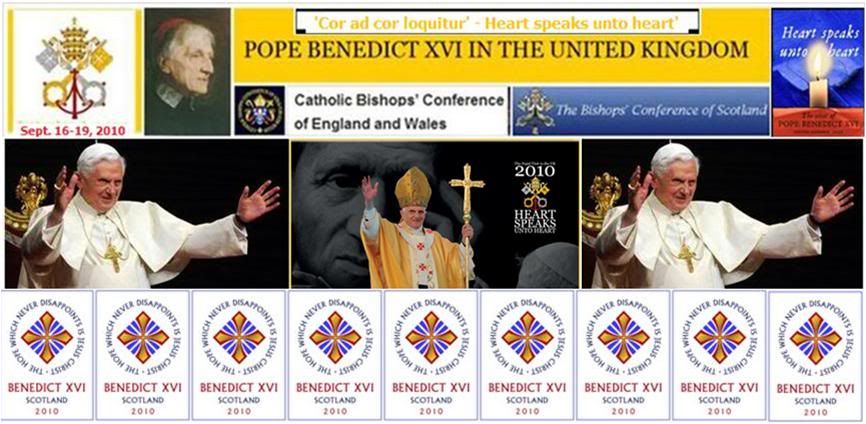 This is a development one did not really expect, but apparently the situation is under control. But we continue to pray.... The Holy Father has completed his morning appointments today
This is a development one did not really expect, but apparently the situation is under control. But we continue to pray.... The Holy Father has completed his morning appointments today
 Five Algerian men arrested over plot
Five Algerian men arrested over plot
to attack Pope Benedict XVI during visit

Sep 17 2010
FIVE men were arrested today by police investigating a suspected plot to harm the Pope.
Scotland Yard officers swooped on several people after information emerged that Pope Benedict XVI could be in danger.
A multi-million-pound operation was put in place to protect the Pope during his tour of Scotland, London and the West Midlands.
The men were arrested by officers from the Met's Counter Terrorism Command shortly before 6am.
The suspects, aged 26, 27, 36, 40 and 50, were held under the Terrorism Act 2000 at business premises in central London.
They were taken to a central London police station, where they will be interviewed by detectives.
It was later reported that the men were Arabs of Algerian origin.
A Metropolitan Police spokesman said the business was being searched, as well as homes in north and east London.
A spokesman said: "Initial searches have not uncovered any hazardous items.
"Today's arrests were made after police received information. Following initial inquiries by detectives, a decision was made to arrest the five men.
"Following today's arrests the policing arrangements for the Papal visit were reviewed and we are satisfied that our current policing plan remains appropriate.
"The itinerary has not changed. There is no change to the UK threat level."
Sources said the accuracy of the information received by police is yet to be checked and stressed that no suspicious items have been found.
The source refused to discuss the nature of the tip-off, but said it was only received a relatively short time before the arrests were made.
A huge security and public order operation swung into action yesterday as the Pope touched down in Britain.
Thousands of officers are involved in the operation from forces including the Met, Strathclyde, Lothian and Borders, West Midlands and British Transport Police.
The cost of policing the Pope's visit to Britain could reach £1.5million and is being co-ordinated by South Yorkshire Chief Constable Meredydd Hughes.
Senior officers said there was no information ahead of the visit to suggest any "specific group" wanted to attack the Pope.
But they warned people not to underestimate the "passion and the fervour" the visit would bring.
Police also interviewed mentally unstable people who they feared may pose a threat to the Pope.
Sources said some of the five men are of Arab origin and it is not yet known if they are British citizens.
A spokesman for the Catholic Bishops' Conference of England and Wales said: "We have absolute confidence in the security operation to protect both the Pope and the public.
"The Pope is enjoying a wonderful visit, warmly welcomed wherever he goes."
Father Federico Lombardi, a spokesman for the Vatican, said the Pope was informed of the threat during his visit to St Mary's University College, in Twickenham, south west London.
He was 30 minutes late for prayers in St Mary's Chapel, but it is not known if this is because of the unexpected intervention.
Father Lombardi said: "We are totally confident in the work of the police and Scotland Yard. We have no particular preoccupation with this.
"The police have already said that the information that they have collected until now demonstrates there is no need to change anything on the programme of the Pope and the security measures."
Father Lombardi added that the Pope remains "totally calm" and "happy" and will continue to enjoy his trip.
Fox News's Rome correspondent, reporting on this on Fox TV just now, observed, "In all my years covering the Vatican, I've never seen him being anything but calm, even after he was pulled down to the floor on Christmas Eve. He got to his feet and simply resumed the procession towards the altar calmly." That is something others in MSM might want to remember about this seemingly frail man who is really firm and sturdy in all aspects.
[Modificato da TERESA BENEDETTA 17/09/2010 15:42] |
| |
 17/09/2010 16:05 17/09/2010 16:05 |
|
| | | OFFLINE | | Post: 21.012
Post: 3.649 | Registrato il: 28/08/2005
Registrato il: 20/01/2009 | Administratore | Utente Master | |
|

 Pope visits Catholic schoolkids in Britain
Pope visits Catholic schoolkids in Britain
before key meeting with head of Anglican church
by Nicole Winfield

LONDON, Sept. 17 (AP) - - Thousands of cheering Catholic schoolchildren feted Pope Benedict XVI with songs and gifts Friday on his second day in Britain, offering a boisterous welcome as the Pontiff urged them to ignore the shallow temptations of today's "celebrity culture."
Benedict also told their teachers to make sure to provide them with a trusting, safe environment — the second time in as many days that he has referred to the Church sex abuse scandal.
On Thursday, the Pope acknowledged that the Roman Catholic Church had failed to act quickly or decisively enough to remove pedophile priests from ministry. [What the MSM has chosen to 'deduce' from the Pope's inflight statement yesterday - and the way they presented it in their reporting - is that the apology refers to Benedict's personal role as well as that of his Pontificate in dealing with the issue, even if he was clearly referring to the overall situation in the context of abuses committed in the past several decades that only started coming to light in 2000-2002.]
"Our responsibility toward those entrusted to us for their Christian formation demands nothing less," Benedict said. "Indeed, the life of faith can only be effectively nurtured when the prevailing atmosphere is one of respectful and affectionate trust."
Polls in Britain indicate widespread dissatisfaction with the way Benedict has handled the sex abuse scandal, with Catholics nearly as critical of him as the rest of the population. [That's mainly because they have been misled by all the deliberate misinformation and disinformation about the Church in the mass media. As for the doubting Catholics, their local pastors should make it part of their pastoral duty to see to it that they have the correct information to judge by.]
Benedict's four-day visit to the U.K. has been clouded by the abuse scandal, as well as by opposition to many of his policies and widespread indifference to his presence in this deeply secular country.
Catholics are a minority in Britain at 10 per cent, and up until the early 19th century they endured harsh persecution and discrimination and were even killed for their faith. King Henry VIII broke with Rome in the 16th century after he was denied a marriage annulment.
Benedict was to meet with the Archbishop of Canterbury Rowan Williams later Friday amid new tensions between the Anglican and Catholic churches and celebrate an ecumenical service in Westminster Abbey.
His main event Friday was an afternoon speech to British politicians, businessmen and cultural leaders in Westminster Hall where he was expected to press the need for faith to help shape public policy.
In the morning, Benedict told Catholic educators at a London university that their role was fundamental in forming future generations who had faith and were responsible citizens. But he also reminded them they must "ensure that our schools provide a safe environment for children and young people."
Abuse scandals involving Catholic priests rocked the Church in Britain more than a decade ago, sparking a 2001 report advising that all church officials, including volunteers, be subject to police checks and any allegations of abuse investigated swiftly. The Catholic Church in Britain has since prided itself on its response.
More recently, two former monks at Buckfast Abbey School were sentenced in 2007 for sexually abusing boys. And last year a monk at Ealing Abbey in London was sentenced for sexually abusing boys at an affiliated school.
Outside the London university hall, some 4,000 young students, outfitted in prim school uniforms and waving small white-and-yellow Holy See flags, serenaded the pontiff Friday with gospel hymns and songs at the so-called "Big Assembly."
The students, from England, Scotland and Wales, gave Benedict a tie-dyed stole and three books tracing the history of the Catholic Church in Great Britain. They presented the gifts to the pontiff as he sat on an enormous red throne on a stage decorated with children's artwork.
The 83-year-old Benedict appeared relaxed and happy, gently greeting each child and kissing each on the head.
"For us, our school, it's very important," student Maresha Barnes, 13, said. "We have a picture of the Pope in the lunch hall."
Benedict told the children they should work to become saints and not be swayed by the materialistic goals of wealth and fame prevalent in today's "celebrity culture."
"Having money makes it possible to be generous and to do good in the world, but on its own it is not enough to make us happy," Benedict told the children. "We need to have the courage to place our deepest hopes in God alone, not in money, in a career, in worldly success or in our relationships with others, but in God."
He urged them to diligently study but always keep in mind broader morals.
"The world needs good scientists, but a scientific outlook becomes dangerously narrow if it ignores the religious or ethical dimensions of life, just as religion becomes narrow if it rejects the legitimate contribution of science to our understanding of the world," he said.
A few blocks away, some 30 people opposed to the Pope's stand against homosexuality and the church's ban on using condoms to fight AIDS protested, holding up inflated condoms and posters.
"Condoms are not crimes," read one. Another read: "Science flies you to the moon: religion flies you into buildings." [Let's see if Isalmist extremists take umbrage at that last statement! It certainly does nto apply to Christians.]
Michael Clark, a 60-year-old cleaner, said he was protesting because he was gay and annoyed that the Pope's visit — which is expected to cost British taxpayers 12 million pounds ($18.7 million) for security — was being funded by the state.
"That means it's being supported by taxpayers and people who may not have the same ideas," Clark said. "Sexuality is not evil." [COLORE=1#216FF] [That the government uses tax revenues for things the individual taxpayer does not necessarily support or even like - it's always been that way. For instance, Catholics too support the BBC by their taxes, too, yet the BBC has been one of the more stridently militant detractors of the Church, even if the present director general is Catholic!]
Benedict began his four-day U.K. state visit on Thursday, greeted by Queen Elizabeth II at Holyroodhouse Palace in Edinburgh, Scotland.
In his speech to the Queen, the German-born Pope warned against "aggressive forms" of secularism and recalled how Britain had stood against "Nazi tyranny that wished to eradicate God from society."
Pope Benedict speaks
on education and dialogue
by Philippa Hitchen

LONDON, Sept. 17 (RV) - Education has been at the heart of the Church’s mission here in England for centuries. The great medieval universities still stand as an eloquent witness to that and, in those days there were also many small, informal schools held in parishes, churches, cathedrals and monasteries around the country, offering basic reading skills, alongside knowledge of the Psalms, the Ten Commandments and the daily liturgies.
Since the restoration of the Catholic hierarchy here in 1850, education has also been one of the main focuses of the Church’s action, as it’s struggled to rebuild a vibrant community following the devastation and destruction of the Reformation period.
St Mary’s College, where the Pope met with thousands of children from Catholic schools all over England and Wales on Friday, dates back to that same period in the mid 19th century when education of children was deemed more essential for that task than even the building of new churches or cathedrals.
The College moved to its current location in the 1920’s, focused back then on training teachers for Catholic schools. More recently it has been raised to university status and also boasts some of the finest sports training facilities in the country.
No surprise then that Pope Benedict chose this occasion to inaugurate a new sports foundation dedicated to the memory of his sporting predecessor Pope John Paul II.
"In view of London’s forthcoming Olympic Games, it has been a pleasure to inaugurate this Sports Foundation, named in honour of Pope John Paul II, and I pray that all who come here will give glory to God through their sporting activities, as well as bringing enjoyment to themselves and to others”.
It was a relaxed and joyful encounter of the Pope with the excited kids and their teachers, gathered in their smart school uniforms alongside with a bunch of TV stars and Olympic athletes.
And the Pope himself seemed relaxed and at home with these children of many different nationalities and religious backgrounds, talking to them in a down to earth way about the search for happiness and fulfilment in their lives.
"We live in a celebrity culture, and young people are often encouraged to model themselves on figures from the world of sport or entertainment. My question for you is this: what are the qualities you see in others that you would most like to have yourselves? What kind of person would you really like to be?"
True happiness, the Pope said, can only be found when we become friends with God, allowing him into our lives to guide us in everything we do. While the world needs great scientists and economists, historians and philosophers, he said, the most important thing a school can provide is a rounded education that helps children understand the bigger picture of their place in God’s great creation.
Respect and friendship for members of other religious faiths is also an essential value that must be taught in Catholic schools, the Pope said, echoing the theme he developed later that morning with leaders of the many other faith groups with a sizeable presence in this country today.
"As followers of different religious traditions working together for the good of the community at large, we attach great importance to this “side by side” dimension of our cooperation, which complements the “face to face” aspect of our continuing dialogue".
The Pope also had words of encouragement for the many religious men and women, past and present, who’ve pioneered the teaching ministry in these lands and around the world.
Recalling his own childhood, when he was taught by sisters of the order founded by the venerable Mary Ward, Pope Benedict urged all involved in this vital work to follow above all else, the “faithful loving witness of Christ, the Supreme Teacher”.
Below are the texts of the Holy Father's addresses to the religious and teachers first, then to the pupils:
CELEBRATION OF CATHOLIC EDUCATION
Chapel and Sports Arena of St Mary’s University College
Twickenham (London Borough of Richmond)
Friday, 17 September 2010

ADDRESS OF THE HOLY FATHER
TO TEACHERS AND RELIGIOUS
Chapel of St Mary’s University College
Your Excellency the Secretary of State for Education,
Bishop Stack, Dr Naylor,
Reverend Fathers, Brothers and Sisters in Christ,
I am pleased to have this opportunity to pay tribute to the outstanding contribution made by religious men and women in this land to the noble task of education.
I thank the young people for their fine singing, and I thank Sister Teresa for her words. To her and to all the dedicated men and women who devote their lives to teaching the young, I want to express sentiments of deep appreciation.
You form new generations not only in knowledge of the faith, but in every aspect of what it means to live as mature and responsible citizens in today’s world.
As you know, the task of a teacher is not simply to impart information or to provide training in skills intended to deliver some economic benefit to society; education is not and must never be considered as purely utilitarian. It is about forming the human person, equipping him or her to live life to the full – in short it is about imparting wisdom.
And true wisdom is inseparable from knowledge of the Creator, for “both we and our words are in his hand, as are all understanding and skill in crafts” (Wis 7:16).
This transcendent dimension of study and teaching was clearly grasped by the monks who contributed so much to the evangelization of these islands.
I am thinking of the Benedictines who accompanied Saint Augustine on his mission to England, of the disciples of Saint Columba who spread the faith across Scotland and Northern England, of Saint David and his companions in Wales.
Since the search for God, which lies at the heart of the monastic vocation, requires active engagement with the means by which he makes himself known – his creation and his revealed word – it was only natural that the monastery should have a library and a school (cf. Address to representatives from the world of culture at the “Collège des Bernardins” in Paris, 12 September 2008).
It was the monks’ dedication to learning as the path on which to encounter the Incarnate Word of God that was to lay the foundations of our Western culture and civilization.
Looking around me today, I see many apostolic religious whose charism includes the education of the young. This gives me an opportunity to give thanks to God for the life and work of the Venerable Mary Ward, a native of this land whose pioneering vision of apostolic religious life for women has borne so much fruit.
I myself as a young boy was taught by the “English Ladies” and I owe them a deep debt of gratitude. Many of you belong to teaching orders that have carried the light of the Gospel to far-off lands as part of the Church’s great missionary work, and for this too I give thanks and praise to God.
Often you laid the foundations of educational provision long before the State assumed a responsibility for this vital service to the individual and to society. As the relative roles of Church and State in the field of education continue to evolve, never forget that religious have a unique contribution to offer to this apostolate, above all through lives consecrated to God and through faithful, loving witness to Christ, the supreme Teacher.
Indeed, the presence of religious in Catholic schools is a powerful reminder of the much-discussed Catholic ethos that needs to inform every aspect of school life. This extends far beyond the self-evident requirement that the content of the teaching should always be in conformity with Church doctrine.
It means that the life of faith needs to be the driving force behind every activity in the school, so that the Church’s mission may be served effectively, and the young people may discover the joy of entering into Christ’s “being for others” (Spe Salvi, 28).
Before I conclude, I wish to add a particular word of appreciation for those whose task it is to ensure that our schools provide a safe environment for children and young people.
Our responsibility towards those entrusted to us for their Christian formation demands nothing less. Indeed, the life of faith can only be effectively nurtured when the prevailing atmosphere is one of respectful and affectionate trust. I pray that this may continue to be a hallmark of the Catholic schools in this country.
With these sentiments, dear Brothers and Sisters, I invite you now to stand and pray.
* * * * *
Bishop Stack, I would ask you, as Chairman of the Board of Governors of Saint Mary’s University, to receive, on behalf of the College, this gift of a mosaic of the Blessed Virgin Mary.
ADDRESS OF THE HOLY FATHER TO PUPILS
Sports Arena of St Mary’s University College
Dear Brothers and Sisters in Christ,
Dear young friends,
First of all, I want to say how glad I am to be here with you today. I greet you most warmly, those who have come to Saint Mary’s University from Catholic schools and colleges across the United Kingdom, and all who are watching on television and via the internet.
I thank Bishop McMahon for his gracious welcome, I thank the choir and the band for the lovely music which began our celebration, and I thank Miss Bellot and Elaine for her kind words on behalf of all the young people present.
In view of London’s forthcoming Olympic Games, it has been a pleasure to inaugurate this Sports Foundation, named in honour of Pope John Paul II, and I pray that all who come here will give glory to God through their sporting activities, as well as bringing enjoyment to themselves and to others.
It is not often that a Pope, or indeed anyone else, has the opportunity to speak to the students of all the Catholic schools of England, Wales and Scotland at the same time. And since I have the chance now, there is something I very much want to say to you.
I hope that among those of you listening to me today there are some of the future saints of the twenty-first century. What God wants most of all for each one of you is that you should become holy. He loves you much more than you could ever begin to imagine, and he wants the very best for you. And by far the best thing for you is to grow in holiness.
Perhaps some of you have never thought about this before. Perhaps some of you think being a saint is not for you. Let me explain what I mean.
When we are young, we can usually think of people that we look up to, people we admire, people we want to be like. It could be someone we meet in our daily lives that we hold in great esteem.
Or it could be someone famous. We live in a celebrity culture, and young people are often encouraged to model themselves on figures from the world of sport or entertainment.
My question for you is this: what are the qualities you see in others that you would most like to have yourselves? What kind of person would you really like to be?
When I invite you to become saints, I am asking you not to be content with second best. I am asking you not to pursue one limited goal and ignore all the others.
Having money makes it possible to be generous and to do good in the world, but on its own, it is not enough to make us happy.
Being highly skilled in some activity or profession is good, but it will not satisfy us unless we aim for something greater still. It might make us famous, but it will not make us happy.
Happiness is something we all want, but one of the great tragedies in this world is that so many people never find it, because they look for it in the wrong places.
The key to it is very simple – true happiness is to be found in God. We need to have the courage to place our deepest hopes in God alone, not in money, in a career, in worldly success, or in our relationships with others, but in God. Only he can satisfy the deepest needs of our hearts.
Not only does God love us with a depth and an intensity that we can scarcely begin to comprehend, but he invites us to respond to that love.
You all know what it is like when you meet someone interesting and attractive, and you want to be that person’s friend. You always hope they will find you interesting and attractive, and want to be your friend.
God wants your friendship. And once you enter into friendship with God, everything in your life begins to change. As you come to know him better, you find you want to reflect something of his infinite goodness in your own life.
You are attracted to the practice of virtue. You begin to see greed and selfishness and all the other sins for what they really are, destructive and dangerous tendencies that cause deep suffering and do great damage, and you want to avoid falling into that trap yourselves.
You begin to feel compassion for people in difficulties and you are eager to do something to help them. You want to come to the aid of the poor and the hungry, you want to comfort the sorrowful, you want to be kind and generous. And once these things begin to matter to you, you are well on the way to becoming saints.
In your Catholic schools, there is always a bigger picture over and above the individual subjects you study, the different skills you learn.
All the work you do is placed in the context of growing in friendship with God, and all that flows from that friendship. So you learn not just to be good students, but good citizens, good people.
As you move higher up the school, you have to make choices regarding the subjects you study, you begin to specialize with a view to what you are going to do later on in life. That is right and proper.
But always remember that every subject you study is part of a bigger picture. Never allow yourselves to become narrow.
The world needs good scientists, but a scientific outlook becomes dangerously narrow if it ignores the religious or ethical dimension of life, just as religion becomes narrow if it rejects the legitimate contribution of science to our understanding of the world.
We need good historians and philosophers and economists, but if the account they give of human life within their particular field is too narrowly focused, they can lead us seriously astray.
A good school provides a rounded education for the whole person. And a good Catholic school, over and above this, should help all its students to become saints.
I know that there are many non-Catholics studying in the Catholic schools in Great Britain, and I wish to include all of you in my words today. I pray that you too will feel encouraged to practise virtue and to grow in knowledge and friendship with God alongside your Catholic classmates.
You are a reminder to them of the bigger picture that exists outside the school, and indeed, it is only right that respect and friendship for members of other religious traditions should be among the virtues learned in a Catholic school. I hope too that you will want to share with everyone you meet the values and insights you have learned through the Christian education you have received.
Dear friends, I thank you for your attention, I promise to pray for you, and I ask you to pray for me. I hope to see many of you next August, at the World Youth Day in Madrid. In the meantime, may God bless you all!
That is so beautiful! The Pope as everyone's father and grandfather, pastor and friend and teacher, all in one man.
[Modificato da TERESA BENEDETTA 17/09/2010 20:03] |
| |
 17/09/2010 17:41 17/09/2010 17:41 |
|
| | | OFFLINE | | Post: 21.013
Post: 3.650 | Registrato il: 28/08/2005
Registrato il: 20/01/2009 | Administratore | Utente Master | |
|
 The headline today in Scotland's Herald newspaper best expresses perhaps the now-familiar instantaneous 'reversal of fortune' for the better that Benedict XVI is able to produce when he travels abroad (sadly however, a reversal that is bound to flip at the first sign of scandal, true or false!)....
He came, he saw and
The headline today in Scotland's Herald newspaper best expresses perhaps the now-familiar instantaneous 'reversal of fortune' for the better that Benedict XVI is able to produce when he travels abroad (sadly however, a reversal that is bound to flip at the first sign of scandal, true or false!)....
He came, he saw and
he conquered a nation
by Alison Capsie

Sept. 17, 2010
About 200,000 people turned out to welcome Pope Benedict XVI to Scotland, dramatically confounding low expectations for the start of his four-day state visit to the UK.
The Pontiff flew out of Glasgow last night “very happy” after a sun-filled day when an estimated 125,000 people greeted him on the streets of Edinburgh and 70,000 pilgrims joined him for Mass in Bellahouston Park.
Father Frederico Lombardi, official spokesman for the Pope, said after almost 10 hours spent on Scottish soil: “Today has been absolutely wonderful, more than we could ever have expected. The Pope is very happy and we are delighted to have such a wonderful start to this visit.”
The visit began at 10.17am when he emerged from his Alitalia jet at Edinburgh Airport and went to the Palace of Holyroodhouse for an official reception with the Queen, senior churchmen and politicians, before taking to Princes Street in his Popemobile, bedecked in a tartan scarf.
Just before 5pm he arrived at Bellahouston, where a vast section of the park was turned into a sea of white-and-yellow Vatican flags, waved alongside the Saltire, the Lion Rampant, and the Irish Tricolour.
People of all ages waited for up to seven hours for the Pontiff to arrive. After being officially received by Gordon Matheson, leader of Glasgow City Council, and Lord Provost Bob Winter, he again took to the Popemobile to make a 15-minute tour, to unbridled cheering from the crowds.
Mr Matheson, who is Catholic, said he had been left “giddy” after meeting Pope Benedict in Edinburgh alongside the Queen. His delight intensified after coming back to Glasgow.
He said: “I am elated, genuinely, to have had the honour of meeting the Pope this morning and it is overwhelming then to be able to come to my home city and see it looking so magnificent. The whole day is running like a Swiss watch and the atmosphere is so joyous. This is a massive event worldwide and I am so proud of what we have achieved here.”
Peter Kearney, spokesman for the Catholic Church, said Scotland had excelled itself in the reception it had given.
“Scotland has set the bar extremely high for this papal visit. The sun shone, the crowds were singing and cheering, and Scotland presented an especially welcoming face to the Pope and indeed the world.”
He said claims that the visit of Pope Benedict would not generate the same reception as his predecessor, John Paul II, in 1982 had been rendered irrelevant by the turnout.
“ I think today saw an explosion of enthusiasm which has really made all the negativity irrelevant. It has dramatically exceeded expectation. In Edinburgh, we had around five times the number of people who came to see the Pope in the capital in 1982.”
The Pope also touched on the 1982 visit during his homily in Glasgow. He said: “It is with some emotion that I address you, not far from the spot where my beloved predecessor Pope John Paul II celebrated Mass nearly 30 years ago with you and was welcomed by the largest crowd ever gathered in Scottish history.”
Despite the sizeable gatherings in both cities, there was little sign of trouble. At Bellahouston, despite concerns about pilgrims’ welfare, problems for the Scottish Ambulance Service and the Red Cross were limited to treatment for about 170 people with a range of minor complaints, from blisters to sprained ankles and wasp stings. No one was taken to hospital.
Police leaders also hailed a successful day, involving 1600 officers in a massive security operation that swept from the capital along the M8 to Bellahouston, and ended when the Pope’s flight left Glasgow Airport just before 8pm.
Strathclyde Assistant Chief Constable Fiona Taylor said: “This has been a hugely complex operation that has involved agencies from across the public and private sector and has been months in the planning. I am pleased to say that, at this stage, it looks as though it has been a resounding success.
“The papal visit has shown, yet again, just how well equipped this city is to host global events. It was another opportunity for every part of Glasgow to demonstrate our ability to work collectively in the run-up to the 2014 Commonwealth Games. I am pleased to say that Glasgow and Scotland has once again risen to the occasion.”
However, the day was not just about wide-scale participation – there were important messages too.
In his opening speech in Edinburgh, Pope Benedict praised the UK as a “force for good”, but also warned about “aggressive forms of secularism”, and urged the nation not to lose its traditional values.
After he was officially welcomed by the Queen at the Palace of Holyroodhouse, the Pope spoke of the UK’s important place in history.
He said: “Your forefathers’ respect for truth and justice, for mercy and charity, come to you from a faith that remains a mighty force for good in your kingdom, to the great benefit of Christians and non-Christians alike.”
Referring to the future, he delivered an apparent warning about the risks to the nation’s traditional values. He said: “Today, the United Kingdom strives to be a modern and multicultural society. In this challenging enterprise, may it always maintain its respect for those traditional values and cultural expressions that more aggressive forms of secularism no longer value or even tolerate.”
The first state visit to Britain by a Pope came amid renewed anger at the worldwide child abuse scandal that has engulfed the Catholic Church and dogged the Pope’s own religious career.
As he flew to Scotland, the Pope spoke of his sadness over his church’s handling of child abuse scandals. He said abusive priests had not been dealt with decisively or quickly enough.
The Pope’s comments, to reporters on board his plane, marked his most thorough admission to date of failings in the way the scandal was handled.
The concession came before a new survey published last night showed one-quarter of British people think the Pope should resign over the abuse of children by priests. [It is not a concession - it was always implicit in his public statements about the issue
The ComRes poll, commissioned by CNN, found that three out of four adults in the UK think the Pope has not done enough to punish those guilty of abuse and that the Church has shown insufficient remorse. Two-thirds of Catholics surveyed agreed.
The Guardian wrap-up of Day 1 could have been worse, but beginning with their headline, they don't spare what is always the 'unkindest cut' and is, in fact, a basic premise for MSM reporting about Benedict XVI.
Not quite John Paul II, but
thousands turn out for Benedict
Beginning UK tour, Pontiff offers contrition
on abuse and a broadside against secularism
by John Hooper, Riazat Butt and Severin Carrell

Thursday 16 September 2010
It was a day as fine as anyone - even a pope - has a right to expect of Scotland in mid-September. From the moment the flight carrying Benedict XVI touched down at Edinburgh airport with the pilots flying a papal standard from one window of the cockpit, and a union flag from the other, it was a day of light and shade.
Abrupt breezes chased off gun-metal clouds, revealing the deep azure sky beyond. And the infectious enthusiasm of hundreds of thousands of Scottish Roman Catholics began to edge aside some of the heated controversy that had built up around the first visit to Britain of this most controversial of pontiffs.
But by the end of the first day of his trip plenty of questions remained about the nature of the message he is bringing and its reception in a Britain that has changed since his predecessor, John Paul II, visited 28 years ago. The crowds who greeted Benedict were smaller.
Non-believers protested at the Pope's condemnation of aggressive secularism, while his view that Britain strives to be a multicultural society struck an odd note, like that sounded by his former aide, Cardinal Walter Kasper, who in an interview published on the eve of the Pope's arrival had compared Britain to a Third World nation. [Cardinal Kasper was not exactly an 'aide' in the usual sense of the term. He headed an important Vatican dicastery for 11 years.]
The cardinal withdrew from the papal party on health grounds, said by his spokesman today to be gout. But, according to a source, he was well enough on Wednesday night to attend a dinner in Rome at the German embassy to the Holy See.
The Pope's day began on an unequivocally humble note aboard the Alitalia flight from Rome. Speaking to correspondents, Benedict used his strongest language to date to condemn his church's record on clerical sex abuse.
It is difficult to understand how this perversion of the priestly mission was possible, he said, adding that the Church authorities were not sufficiently vigilant and insufficiently speedy and decisive in taking the necessary measures. Roman Catholicism was at a moment of penitence, humility and renewed sincerity.
The Pope went on to say that paedophile priests should be excluded from all possibility of access to young people because this was an illness and free will did not work when there was this sickness. It was the first time that any of the correspondents could recall him describing paedophilia as an illness. This briefing gave the first hint of the pressure on the Pontiff, pressure that can only mount during this gruelling, four-day visit. He spoke with a hoarse voice in some of his replies. [Pressure? On this Pope? One does worry, however, about his occasional coughing and/or hoarseness..]
At the Palace of Holyroodhouse in Edinburgh, his first stop, the Scottish wind conspired to bolster diplomacy. After Benedict, the first Pope to make a state visit to Britain, joined the Queen on a dais outside the gates of the royal palace, a gust lifted his zucchetto, his skullcap, and he only just caught it before it was spun away.
He took it in hand just as the band of the Scots Guard struck up the national anthem, so to millions of people watching on television it looked as if he was removing it as a sign of respect.
Then, and subsequently when he exchanged gifts with the Queen inside the palace, the 83 year-old Pope appeared less reactive than usual. Seemingly concerned about his hearing, the Queen spoke more loudly than she does normally and placed her chair close to his for their brief, private conversation.
His speech, given at the rear of the palace to several hundred invited guests, brought home the historic nature of the occasion a Pope, and a German one at that, being received by the titular leader of the Church of England. [I don't understand why the British should be so obsessed by the Pope's nationality. Do they choose to forget that their present monarch (and half the remaining royalty of Europe) is descended from Victoria and her German husband Albert of Saxe-Coburg-Gotha? And that the Duke of Edinburgh himself comes from a German line surnamed Battenberg, which was anglicized to Mountbatten?]
Benedict's English is fluent, but coloured with a heavy, breathy accent. He spoke of a Florence Nightingale inspired by faith, warned against the exclusion of God and called on everyone involved to continue the work for peace in Northern Ireland.
The Pope diplomatically praised Britain's stand against a Nazi tyranny that wished to eradicate God from society. And, pressing home a point that is expected to be central to his visit, Benedict went on:
"As we reflect on the sobering lessons of the atheist extremism of the 20th century, let us never forget how the exclusion of God, religion and virtue from public life leads ultimately to a truncated vision of man and of society and thus to a reductive vision of the person and his destiny."
The quote was from his own encyclical on social and economic issues, Caritas in Veritate, which was published last year. That is the kind of thing you do when you are Pope. [Popes cite their own teachings as well as their predecessors in order to emphasize the perennial relevance, consistency and continuity of the Magisterium!]
In what might be regarded as a less than warm endorsement, the Pope said the United Kingdom strives to be a modern and multi-cultural society. [It's not a question of endorsing or not endorsing the British model, but the Pope believes, in effect, that pluralism must not devolve into relativism and political correctness, that it must allow for each of the plural elements to retain what is good and positive of their respective cultures while coexisting together under common values with universal validity.]
And he added: "In this challenging enterprise, may it always maintain its respect for those traditional values and cultural expressions that more aggressive forms of secularism no longer value or even tolerate. Let it not obscure the Christian foundation that underpins its freedoms."
He was speaking to an audience that included a rabbi in a spectacularly wide-brimmed hat. And amid the colourfully robed prelates of several Christian denominations, perhaps the most strikingly dressed guest was the Pakistani-born academic Mona Siddiqui, who wore a headscarf and trouser suit in white and vivid turquoise.
Back at the entrance to the palace, where the popemobile was parked, three little girls in blue tartan skirts were waiting to present bunches of flowers to Benedict on his departure.
From that moment, as the popemobile set off through Edinburgh, Scottishness exploded into full view.
And as the bullet and bomb-proofed vehicle edged into sight, with the Pope's frail body draped with a tartan shawl [scarf, not shawl!] specially designed for his visit, the children of St Peter's Catholic primary school in Aberdeen erupted into cheers, waving their paper St Andrew's saltire flags.
Woken at 5am, they had clambered on to their coaches as dawn broke for a 130-mile trek south. Five hours later, they were in joyful mood, grinning and cheering for a television camera, before pressing themselves into prime positions against the crash barriers lining the road.
"It's a good day, said Claire Richard, a softly-spoken 11-year-old. "Well, the special thing about him is that this is the first time I have seen a Pope. He doesn't come here every day and it's not even like once a year."
Despite Aberdeen's size and prominence, the city has only three Catholic primary schools and no Catholic secondaries.
"Whenever they hear about Pope Benedict [from now on], they can connect with being here today, said Jo Martin, St Peter's headteacher. "It's an opportunity for them also to see children from other Catholic schools, identifying with their heritage."
It was a rare experience - a day for Catholics to celebrate, despite the horror of the child sex abuse scandals elsewhere and their minority status within an increasingly secular state.
And it was St Ninian's day, the rarely acknowledged feast day of the reputed founder of Christianity in Scotland. Before the Pope's drive-past, Ninian's arrival, on a beach in southwest Scotland in 397 was marked by nearly 1,000 students from Catholic, ecumenical and Protestant schools across Scotland called St Ninian's, accompanied by massed pipers, some with saltire flags fixed high on their instruments.
Alongside Claire was a young Polish schoolmate, Igor Kantor. His mother Martha emigrated three years ago to find work in Aberdeen - one of the thousands of east European migrants who have swelled the school's roll and reinvigorate ailing Catholic congregations across north eastern and northern Scotland.
There are 70 Polish children, all Catholics, out of 199 enrolled at St Peters. "I never ever saw a Pope before," said Igor, eight.
The Church had predicted up to 100,000 people would line the 3½ miles through central Edinburgh. Early estimates suggested the crowd was nearer 60,000, though the council later claimed there were some 125,000.
At all events, it lacked the intensity and emotion of the visit by John Paul II in 1982. Then the crowds on Princes Street were 10 deep in places. [Capricious or deliberate revisionism! See Herald article above for what it said about the Edinburgh visit in 1982!]
Intensity, though, was not lacking at Bellahouston park in Glasgow. A crowd of 60-70,000 holding saltires and white and yellow papal standards that streamed in a stiff, southerly wind spread out across the open green space beyond two tower blocks. It looked as if it had been occupied by a medieval army waiting for its general.
The crowds had begun arriving as early as 9.30am, small groups, clutching folding chairs and waterproof clothing. By midday they were coming in their hundreds, filling the length of Mosspark Boulevard. Young, old, infirm; Scottish, Indian, Filipino. They bore flags, carried placards and wore papal bandannas, enjoying the sunshine and the convivial atmosphere.
Few seemed to mind the hours of waiting or queuing. When the white-haired pope eventually arrived, screams erupted from the vast crowd. As he toured the park in a second popemobile, some of the faithful pushed insistently against the crash barriers, prompting security staff to call for restraint.
In his sermon, Benedict returned to a theme that is one of the keys to his papacy, and which is likely to crop in again and again in different forms in the rest of his visit.
A dictatorship of relativism threatens to obscure the unchanging truth about man's nature, his destiny and his ultimate good, he told the vast congregation.
Appealing to Scotland's Catholics to join him in the task of re-evangelisation that he set for his church, he said: "Society today needs clear voices which propose our right to live, not in a jungle of self-destructive and arbitrary freedoms, but in a society which works for the true welfare of its citizens and offers them guidance and protection in the face of their weakness and fragility.
"Do not be afraid to take up this service to your brothers and sisters, and to the future of your beloved nation, he urged as the sun in an all but clear sky began to fade on his first day in Britain."
Michael Fox, aged 18, a eucharistic minister at St Aloysius College, Glasgow, called it the one day that Catholics could be "top dog".
"I went to see something that will only happen once. I'm here for the whole experience and the chance to be part of this massive community." He said he knew lots of people who saw the Mass as a chance to connect with the Church.
"I'm embracing it all, my faith is very important to me. Look at the crowd, look. Every year there's the Orange walks to adjust to. We change our lifestyle, we ask one day for the Pope, once in 28 years, and people are put out."
Surge in demand for Papal tartan

17 September 2010
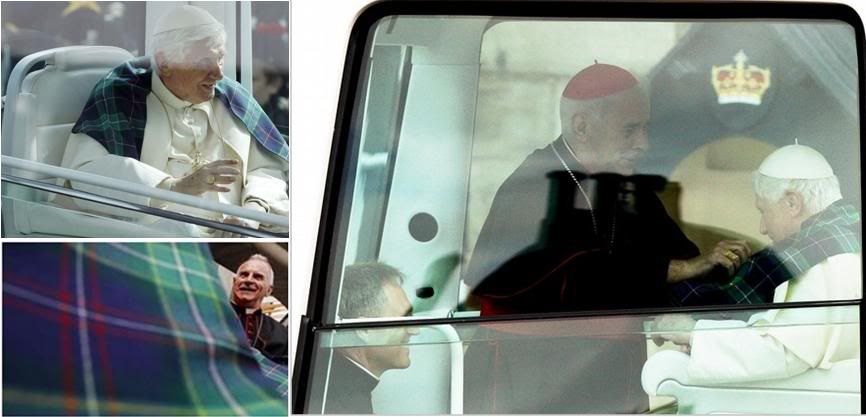 Cardinal Keith O'Brien who commissioned the tartan design also had the great idea of having the Pope wear a scarf in the new design for the St. Ninian's Day parade through Edinburgh's main street yesterday.
Cardinal Keith O'Brien who commissioned the tartan design also had the great idea of having the Pope wear a scarf in the new design for the St. Ninian's Day parade through Edinburgh's main street yesterday.
Demand for a tartan created for the Pope has gone "through the roof" since his visit to Scotland, according to manufacturers.
Images of Benedict XVI wearing a scarf in the bespoke design were beamed around the world during his state visit to the UK, beginning in Edinburgh on Thursday.
The St Ninian's Day Tartan garment was presented to the Pontiff by Cardinal Keith O'Brien, leader of the Roman Catholic Church in Scotland.
The Cardinal had "hidden scarves in his own cassock" before presenting one to the Pope for his journey through the capital, it was revealed.
Manufacturer Ingles Buchan said phones have been ringing off the hook ever since.
Managing director Colin Brown said: "Since Pope Benedict was seen wearing the tartan during his visit on Thursday, demand has gone through the roof."
The tartan was designed by Matthew Newsome, who travelled from the US to attend the official unveiling at the Scottish Parliament last week.
Mr Newsome, director of the Scottish Tartans Museum in Franklin, North Carolina, said he drew on Roman Catholic and Scottish history for the blue, white, green, red and yellow creation.
The Pope's tour of Edinburgh coincided with St Ninian's Day, which celebrates the first man to be named a saint in Scotland in nearly 1,600 years.
The tartan was created in conjunction with Ingles Buchan of Glasgow and ClanItalia of Falkirk.
BBC News found a way to report the Pope's Edinburgh-Glasgow triumph without doing the reporting themselves - simply by attributing all the positive statements about the day to the Church itself and to assorted Scottish officials! After all, the BBC couldn't possibly ignore or falsify what took place
Papal visit was 'spectacular',
says Catholic Church

Sept. 17, 2010
The Pope's visit to Edinburgh and Glasgow was a "spectacular" event, said a spokesman for the Catholic Church in Scotland.
Peter Kearney added that all the negativity before the pontiff's arrival had been "completely wiped away".
First Minister Alex Salmond said it was a "wonderful, historic day".
About 125,000 took to the streets of the capital to see the Pope and about 70,000 people attended Mass in Bellahouston Park, Glasgow.
Fears about traffic congestion proved unfounded, with the exodus of pilgrims passing without major incident.
Mr Kearney said: "Scotland in a sense had a day in the sun - we showed a welcoming face to Pope Benedict, but we also showed a welcoming face to a global audience and it couldn't, from the church's point of view, have gone better.
"All the negativity before the visit was completely wiped away by the enthusiasm, by the excitement and by the joy."
Glasgow Council leader, Councillor Gordon Matheson, said the city had set the standard for the rest of the Pope's UK visit.
He said: "The Papal Mass on Bellahouston Park was an incredible event that showed what Glasgow can do.
"The park looked magnificent, the weather was fantastic, and the ceremony and spectacle of the Mass was awe inspiring.
"It was an historic honour and I am so proud of the work done by the council staff who were involved in the project and helped make the day a huge success."
A 30-year-old man was arrested at Bellahouston in connection with a breach of the peace.
However, police said he was not near the Pope at the time of the alleged incident and did not interfere with the proceedings.
Strathclyde Police's Assistant Chief Constable Fiona Taylor said the "hugely complex operation" had been a resounding success.
"I would like to thank everyone involved in making the event such a memorable occasion for the tens of thousands of people who came to Bellahouston Park," she said.
"It was a wonderful day, not only for the Catholic community but for the whole nation, which made it a special and historic day for Scotland. The papal visit has shown, yet again, just how well equipped this city is to host global events."
Assistant Chief Constable Iain Livingstone, of Lothian and Borders Police, said things had gone very well in Edinburgh, where 600 officers were involved in the operation.
He said: "The St Ninian's day parade and the Papal procession through the capital city was a real spectacle.
"It has been a unique event, in terms of scale and history.
"The Pope visited Scotland 28 years ago in a pastoral role, but this was a full state visit by His Holiness, which Edinburgh was privileged to host for the first time."
About 135 people were treated for minor ailments, but the Scottish Ambulance Service said there was nothing which required hospital treatment.
After his visit to Scotland the Pope headed to London, where the Moderator of the Church of Scotland's General Assembly will read a lesson at an ecumenical service in Westminster Abbey as part of the events on Friday.
The First Minister of Scotland, Alex Salmond, said he was "deeply grateful" to the Pope for the visit.
He added: "The pre-visit negativity in some sections of the media has been swept away by a popular tide of enthusiasm, as Scotland opened its heart to the Holy Father.
"It was a wonderful day, not only for the Catholic community but for the whole nation, which made it a special and historic day for Scotland."
Another feel-good, light-a-candle story, of the kind that has been so rare about the Pope and Catholics in the Anglophone media...
Hearts and minds in harmony
by Alison Rowat

Sept. 17, 2010
Seventy years ago the people of Glasgow, looking back to the Great Depression, forward to war, decided the best thing to do was have a party in a park.
Bellahouston Park.
Yesterday they came to the same place to celebrate again. They came with their picnic chairs in bags. Their packed lunches. They came with their babies, their toddlers, their friends, their anoraks, their flags. They came to plant some faith not just in their future, but in their present too.
“Unbelievable,” said Tom Bell, from Sacred Heart in Bellshill, trying to sum up the experience. And he had been among the believers before, when Pope John Paul came here in June 1982.
If yesterday’s event is an ice age away from the Empire Exhibition of 1938, where attractions included a big wheel and a visit by Gracie Fields, it’s also a fair distance from 1982.
Back then there were no mobile phones to chat on while Michelle McManus of Pop Idol did her thing. There was no Pop Idol. Or Britain’s Got Talent, the alma mater of Susan Boyle, who also sang yesterday. Then, reality TV meant World in Action.
But the world turns. Yesterday was where the informality of tens of thousands enjoying a day out in the sun met a state visit. The dignitaries, the pomp and the circumstance were all present and correct. So, too, were those individuals journalists tend to refer to as “ordinary people”. Breaking news: on September 16, 2010, those ordinary people were feeling pretty special indeed.
Nan Riley, also of Sacred Heart in Bellshill, couldn’t attend in 1982. “We were getting a new house that day and unfortunately the lawyer wasn’t for putting it off.” She was particularly looking forward to the singing, “just to be one of that 70,000-strong choir”.
Like a lot of pilgrims, she had been on the go since dawn that morning. But Margaret Kelly, 62, could do better than that. She set off from Drogheda in Ireland on Wednesday, flying into Prestwick. Why come all this way? “I feel he needs a wee bit of support from us and it’s a once-in-a-lifetime thing. At my age you might not get it again.”
Leanne Dominick, 20, could trump the Drogheda card, coming as she did from Sydney, Australia, where she is having a gap year before studying event management at university. Once she knew the date, she built her four-week break around the event. “How often does he come to Glasgow, my home town? It’s history in the making.”
There was a whole day to fill from the gates opening at 9am to when the Pope arrived just before 5pm. In the morning, the only entertainment on offer was a trek round the circle of fast-food wagons that ringed the park. An ice-cream van was selling large 99s for £3. Had a polar bear been passing, a sale might have been made.
Kathleen McDade of St Andrew’s in Airdrie wasn’t worried about the odd shower that threatened now and then. “Our skin’s waterproof,” said the guid Scot.
With Mrs McDade was her son Martin, eight. The Herald inquired of Martin: have you got the day off school?
“Mm-hmm.”
Enjoying yourself so far? “Uh-huh.”
You’ll be seeing Susan Boyle later? “Uh-huh.”
Further investigation revealed the reason why Martin was failing to wilt under this relentless interrogation: he was eating a chocolate chip cookie the size of his head. Paxman couldn’t have broken this kid.
When it came to toting her party’s packed lunches, Alison Kennedy, a hospital switchboard operator from Port Glasgow, had rejected the carrier bags and backpacks favoured by others. For her friends and family, only a bright pink, mock-croc wheeled suitcase would do. “Flasks, soups, sandwiches, biscuits, cakes – you name it, we’ve got it.”
Otherwise, the on-trend look of the day was an anorak a body could climb the north face of the Eiger in, comfy walking shoes to cope with the trek back to the coaches, and tartan scarves. A fair few Bravehearts accessorised the look with tiny saltires on their cheeks.
Oliver Bourke, not long out of the tissue paper at just eight months old, was wearing a rainbow-striped hooded jersey. The mood of mum and dad Jim, 32, and Sharon, 28, from St Michael’s, Moodiesburn, matched it for sunniness. “The atmosphere is fantastic,” said Mrs Bourke. “It’s so lovely to be a part of it.”
Jane McGookin from St Luke’s parish, Banknock, Stirlingshire, was at the 1982 event. She recalls the moment when Pope John Paul arrived. “When that helicopter came over the hill, the Hampden roar didn’t have a look-in.”
She had no doubt this day would be equally significant. “We haven’t had an awful lot of great press coverage in recent years. This is what we’ve really needed, something like this, to bring us all back together. Something will come out of this today.”
A procession of children’s choirs appeared on stage before Michelle McManus took the microphone. She, in turn, was the warm-up for Susan Boyle, whose arrival prompted such a stampede from the media centre that one would have thought someone was handing out blank taxi chits outside.
From out in the park, Boyle appeared as a tiny dot in the wilderness of the stage. Up on the rock-concert-style screens, she was a giant. Some of the large number of school pupils in the crowd took the chance to welcome her with good natured chants of “Su-bo, Su-bo, Su-bo!” You can take the kid out of a Glasgow school for the day but you’ll never take the Glasgow kid out of them.
Surrounding the teens, all eyes on stage, were police officers, priests, dads with toddlers perched on their shoulders, big blokes pushing wheelchairs. No gig in the history of the world has ever had such a widespread demographic.
Hundreds of flags with the official message “Heart speaks unto heart” flapped in the stiff wind, here and there a Saltire breaking up the white and yellow.
By the time the Popemobile began its progress down the carpet of steel that wound its way through the park, the crowd was quiet, solemn, straining for a look. Cameras were passed from back to front, where there was a better chance of a picture. Above, in a near cloudless sky, a helicopter clattered from west to east while a pigeon went silently the other way.
Now and then a cry went up. “I’m too wee!” bemoaned a ponytailed girl in a tracksuit. Never mind: she had her athletic pals to hoist her a bit higher, and at the top of their pyramid was a mobile phone, ready and waiting to take the picture.
Finally, the top of the Popemobile was glimpsed and it made its way past, cheers and waves and a few tears lapping at its sides.
It had been a long day, but the most important part, the Mass, was still to come. As if as one, 70,000 people drew breath, drew strength from each other, and saw the day through to its end. A great day, a very Scottish day, had been had by all.
This is the kind of story most MSM outlets generally do not think about. In my past career, at the newspapers I worked for and the radio and TV coverages I handled or took part in, the work of the 'sidelights' correspondent or reporter at any important event was just as important as that of the lead reporter, not just to provide color but to almost literally flesh out the main event by sampling the 'man on the street' experience of it, as this article does.
Scotland has done us all proud
The papal chemistry is still active on British soil;
now, we can relax and enjoy the visit
By William Oddie

Friday, 17 September 2010
Scotland, rightly declared [First Minister] Alex Salmond , has done the Pope proud; he added, also truly, that Scotland had “done itself proud”, too. And that was while the Pope was still in Edinburgh, before that great and wonderful Carnival of the Faith at Bellahouston park.
Would the first day have been the success it was if it had taken place in England? Would the papal chemistry have worked so soon in London, that vast and engulfing megalopolis, if the reception by Her Majesty had taken place in the impersonal splendours of Buckingham Palace rather than in that ancient architectural wonder Holyrood house (whose very stones are a testimony to its Catholic origins) and if the Popemobile ride through the streets afterwards had been down the Mall?
I just don’t know: but that magnificent city Edinburgh was somehow on just the right scale. Halfway down Princes Street, it was clear that all the last minute attempts to wreck the visit had failed; the sheer warmth of that Scottish welcome had swept all that away.
There were some splendid touches: Cardinal O’Brien’s production of a load of scarves in the specially commissioned Papal tartan was a brilliant idea, as was the very notion of a Papal tartan; and to drape a scarf over the Pope’s shoulders, so that he rode through the streets clad in tartan (the wearing of which, remember, was made illegal after the final defeat of attempts to place a Catholic pretender on the throne) was a stroke of historical genius. [And before the tartan, the very idea of a St. Ninian's Day parade itself!]
Part of the success of the day, it has to be said, was that the BBC was at its excellent best (and not at its infuriating worst). As Stuart Reid wrote in his blog yesterday: “Jim Naughtie on the Today programme this morning was almost Dimblebyian in his gravity and respect.”
The same was true later in the day, with his coverage of the meeting of the Pope and the Queen (who as always rose wonderfully to the occasion); and while we are about it, Peter Stanford, who was regally seated with other experts at Holyrood to give his views from time to time, also did us all proud, and as a fellow holder of that hallowed title “former editor of The Catholic Herald” I salute his statesmanlike performance.
I was right, though, in my rather anxious blog yesterday (written when the Pope was still on his way to Edinburgh). I repeated my belief that all the media attempts to “overshadow” the visit would be swept away by the visit itself, but said that it was clear that they would continue.
I was right: the Guardian and the Independent are still at it (the latter organ even described the Pope’s visit as “Mission Improbable” this morning: what planet do these people live on?).
But somehow, the anti-Catholic campaign has lost its power to distort and to dismay. The things that do matter about the Church have come firmly to the fore.
The papal chemistry is still active; the Pope’s huge integrity and the great sweetness of his gentle but powerful personality have established themselves in the minds of anyone who has spent five minutes watching the coverage.
The rock which is Peter has emerged clearly from the fog, firm in all its ancient splendour: and the gates of Hell shall not prevail against it.
[Modificato da TERESA BENEDETTA 18/09/2010 19:12] |
| |
 17/09/2010 20:25 17/09/2010 20:25 |
|
| | | OFFLINE | | Post: 21.014
Post: 3.651 | Registrato il: 28/08/2005
Registrato il: 20/01/2009 | Administratore | Utente Master | |
|

 MEETING WITH CLERICAL AND LAY
MEETING WITH CLERICAL AND LAY
REPRESENTATIVES OF OTHER RELIGIONS
Waldegrave Drawing Room
St Mary’s University College, Twickenham
(London Borough of Richmond)
Friday, 17 September 2010
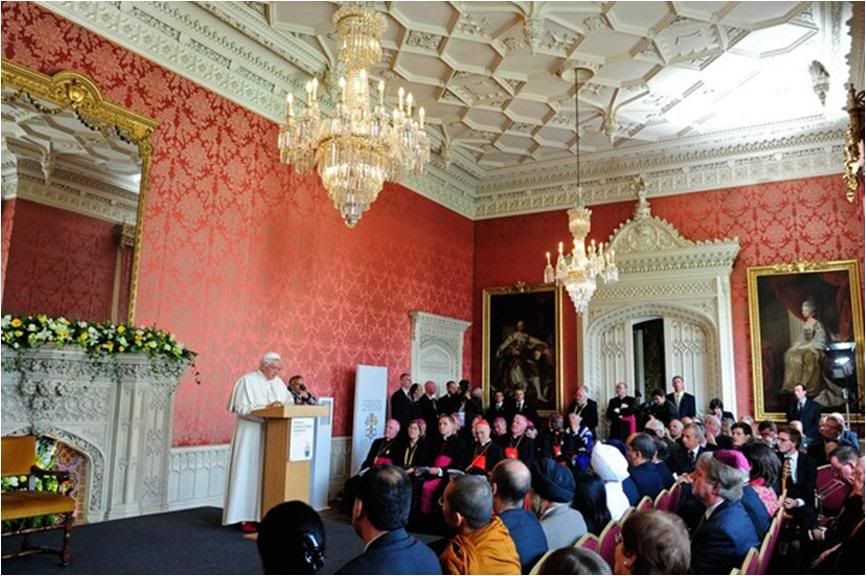
THE HOLY FATHER'S ADDRESS
Distinguished guests, dear friends,
I am very pleased to have this opportunity to meet you, the representatives of the various religious communities in Great Britain. I greet both the ministers of religion present and those of you who are active in politics, business and industry.
I am grateful to Dr Azzam and to Chief Rabbi Lord Sacks for the greetings which they have expressed on your behalf. As I salute you, let me also wish the Jewish community in Britain and throughout the world a happy and holy celebration of Yom Kippur.
I would like to begin my remarks by expressing the Catholic Church’s appreciation for the important witness that all of you bear as spiritual men and women living at a time when religious convictions are not always understood or appreciated.
The presence of committed believers in various fields of social and economic life speaks eloquently of the fact that the spiritual dimension of our lives is fundamental to our identity as human beings, that man, in other words, does not live by bread alone (cf. Deut 8:3).
As followers of different religious traditions working together for the good of the community at large, we attach great importance to this “side by side” dimension of our cooperation, which complements the “face to face” aspect of our continuing dialogue.
On the spiritual level, all of us, in our different ways, are personally engaged in a journey that grants an answer to the most important question of all – the question concerning the ultimate meaning of our human existence.
The quest for the sacred is the search for the one thing necessary, which alone satisfies the longings of the human heart. In the fifth century, Saint Augustine described that search in these terms: “Lord, you have created us for yourself and our hearts are restless until they rest in you” (Confessions, Book I, 1).
As we embark on this adventure we come to realize more and more that the initiative lies not with us, but with the Lord: it is not so much we who are seeking him, but rather he who is seeking us, indeed it was he who placed that longing for him deep within our hearts.
Your presence and witness in the world points towards the fundamental importance for human life of this spiritual quest in which we are engaged.
Within their own spheres of competence, the human and natural sciences provide us with an invaluable understanding of aspects of our existence and they deepen our grasp of the workings of the physical universe, which can then be harnessed in order to bring great benefit to the human family.
Yet these disciplines do not and cannot answer the fundamental question, because they operate on another level altogether. They cannot satisfy the deepest longings of the human heart, they cannot fully explain to us our origin and our destiny, why and for what purpose we exist, nor indeed can they provide us with an exhaustive answer to the question, “Why is there something rather than nothing?”
The quest for the sacred does not devalue other fields of human enquiry. On the contrary, it places them in a context which magnifies their importance, as ways of responsibly exercising our stewardship over creation.
In the Bible, we read that, after the work of creation was completed, God blessed our first parents and said to them, “Be fruitful and multiply, and fill the earth and subdue it” (Gen 1:28). He entrusted us with the task of exploring and harnessing the mysteries of nature in order to serve a higher good.
What is that higher good? In the Christian faith, it is expressed as love for God and love for our neighbour. And so we engage with the world wholeheartedly and enthusiastically, but always with a view to serving that higher good, lest we disfigure the beauty of creation by exploiting it for selfish purposes.
So it is that genuine religious belief points us beyond present utility towards the transcendent. It reminds us of the possibility and the imperative of moral conversion, of the duty to live peaceably with our neighbour, of the importance of living a life of integrity.
Properly understood, it brings enlightenment, it purifies our hearts and it inspires noble and generous action, to the benefit of the entire human family. It motivates us to cultivate the practice of virtue and to reach out towards one another in love, with the greatest respect for religious traditions different from our own.
Ever since the Second Vatican Council, the Catholic Church has placed special emphasis on the importance of dialogue and cooperation with the followers of other religions. In order to be fruitful, this requires reciprocity on the part of all partners in dialogue and the followers of other religions.
I am thinking in particular of situations in some parts of the world, where cooperation and dialogue between religions calls for mutual respect, the freedom to practise one’s religion and to engage in acts of public worship, and the freedom to follow one’s conscience without suffering ostracism or persecution, even after conversion from one religion to another.
Once such a respect and openness has been established, peoples of all religions will work together effectively for peace and mutual understanding, and so give a convincing witness before the world.
This kind of dialogue needs to take place on a number of different levels, and should not be limited to formal discussions.
The dialogue of life involves simply living alongside one another and learning from one another in such a way as to grow in mutual knowledge and respect.
The dialogue of action brings us together in concrete forms of collaboration, as we apply our religious insights to the task of promoting integral human development, working for peace, justice and the stewardship of creation.
Such a dialogue may include exploring together how to defend human life at every stage and how to ensure the non-exclusion of the religious dimension of individuals and communities in the life of society.
Then at the level of formal conversations, there is a need not only for theological exchange, but also sharing our spiritual riches, speaking of our experience of prayer and contemplation, and expressing to one another the joy of our encounter with divine love.
In this context I am pleased to note the many positive initiatives undertaken in this country to promote such dialogue at a variety of levels. As the Catholic Bishops of England and Wales noted in their recent document Meeting God in Friend and Stranger, the effort to reach out in friendship to followers of other religions is becoming a familiar part of the mission of the local Church (n. 228), a characteristic feature of the religious landscape in this country.
My dear friends, as I conclude my remarks, let me assure you that the Catholic Church follows the path of engagement and dialogue out of a genuine sense of respect for you and your beliefs.
Catholics, both in Britain and throughout the world, will continue to work to build bridges of friendship to other religions, to heal past wrongs and to foster trust between individuals and communities.
Let me reiterate my thanks for your welcome and my gratitude for this opportunity to offer you my encouragement for your dialogue with your Christian sisters and brothers. Upon all of you I invoke abundant divine blessings! Thank you very much.
 |
| |
 17/09/2010 21:23 17/09/2010 21:23 |
|
| | | OFFLINE | | Post: 21.015
Post: 3.652 | Registrato il: 28/08/2005
Registrato il: 20/01/2009 | Administratore | Utente Master | |
|

 Pope Benedict makes history
Pope Benedict makes history
with Lambeth House visit

Sept. 17, 2010
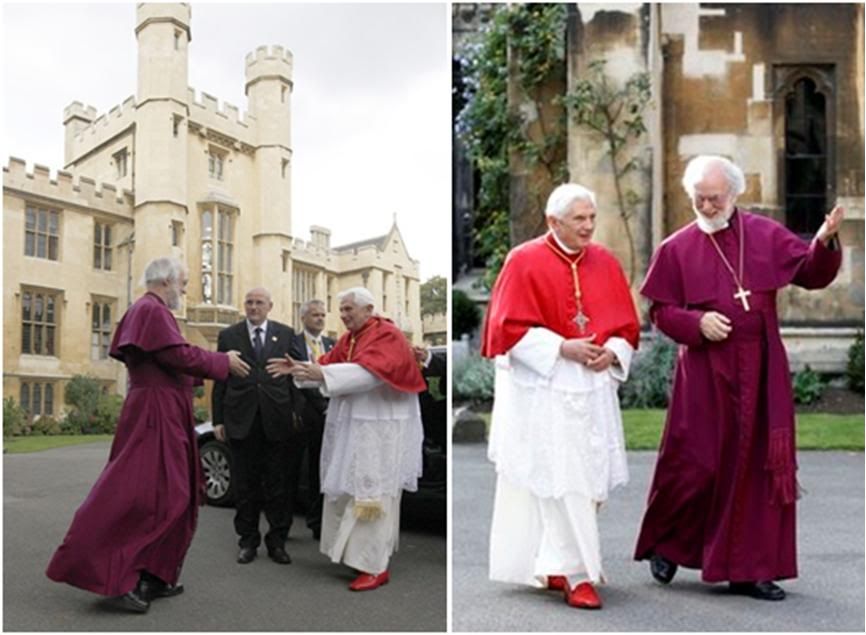
Pope Benedict XVI made history today by becoming the first pontiff to step foot inside Lambeth Palace.
He was welcomed to the Palace by Archbishop of Canterbury Rowan Williams.
Also in the welcoming committee were the Archbishop of York, Dr John Sentamu, the Archbishop of Wales Dr Barry Morgan and the Primus of the Scottish Episcopal Church, Most Rev David Chillingworth.
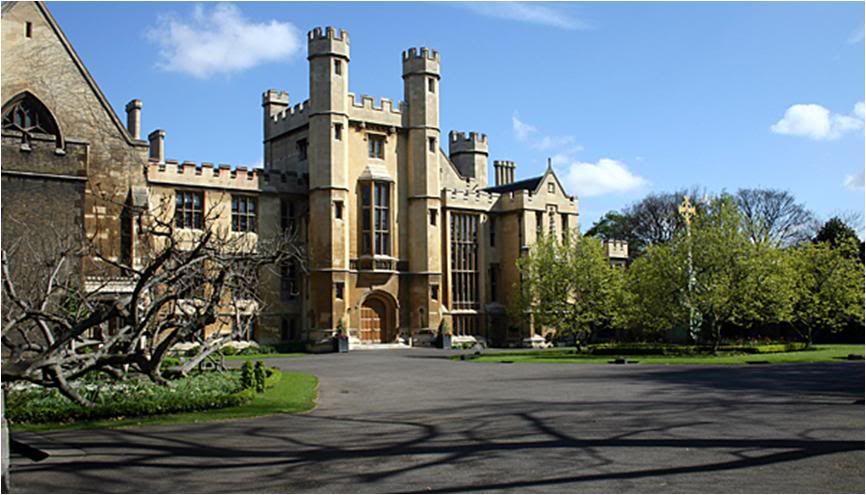
Lambeth Palace, on the south bank of the River Thames, has been the London residence of archbishops of Canterbury since the 13th century.
It acts as a home for the Archbishop and his family when in London and as the central office for his ministry.
Dr Williams led the Pope to the Great Hall of the Palace to a gathering of Church of England diocesan bishops and Roman Catholic bishops of England, Scotland and Wales.
The bishops cheered as the pair entered the room and the Pontiff waved at the crowd.
Dr Williams welcomed the Pope and spoke of the historic visit as "a special time of grace and of growth in our shared calling".
He said: "It is a particular pleasure that on this historic occasion we are able to come together as bishops of the Roman Catholic and Anglican Churches in this country to greet you, Your Holiness, during a visit which we all hope will be of significance both to the Church of Christ and to British society.
"May this historic visit be for all of us a special time of grace and of growth in our shared calling, as you, Your Holiness, bring us the word of the Gospel afresh."
Dr Williams said Christian leaders must be ready to fight back against the critics of religion.
He said their duty "involves a readiness to respond to the various trends in our cultural environment that seek to present Christian faith as both an obstacle to human freedom and a scandal to human intellect".
Dr Williams continued: "Our presence together as British bishops here today is a sign of the way in which, in this country, we see our task as one and indivisible.
"Our fervent prayer is that this visit will give us fresh energy and vision for working together.
"Meeting, as we do, as bishops of separated church communities, we must all feel that each of our own ministries is made less by the fact of our dividedness, a very real but imperfect communion.
"Perhaps we shall not quickly overcome the remaining obstacles to full, restored communion.
"But no obstacles stand in the way of our seeking, as a matter of joyful obedience to the Lord, more ways in which to build up one another in holiness by prayer and public celebration together, by closer friendship, and by growing together both in the challenging work of service for all whom Christ loves, and mission to all God has made."
Addressing the bishops, the Pope acknowledged the obstacles to unity between the Catholic and Anglican churches, saying: "It is not my intention today to speak of the difficulties that the ecumenical path has encountered and continues to encounter. Those difficulties are well known to everyone here."
He said he wanted to give thanks for "the deep friendship that has grown between us".
The Pope said society was moving away from its Christian heritage.
He said: "On the one hand, the surrounding culture is growing ever more distant from its Christian roots, despite a deep and widespread hunger for spiritual nourishment.
"On the other hand, the increasingly multicultural dimension of society, particularly marked in this country, brings with it the opportunity to encounter other religions."
He said moves towards unity in the two churches "will surely bear fruit in promoting peace and harmony in a world that so often seems at risk of fragmentation".
The Pope urged Christians to stand up for their faith, saying: "We Christians never hesitate to proclaim our faith."
ADDRESS OF THE HOLY FATHER
Lambeth Palace
Your Grace,
It is a pleasure for me to be able to return the courtesy of the visits you have made to me in Rome by a fraternal visit to you here in your official residence. I thank you for your invitation and for the hospitality that you have so generously provided.
I greet too the Anglican Bishops gathered here from different parts of the United Kingdom, my brother Bishops from the Catholic Dioceses of England, Wales and Scotland, and the ecumenical advisers who are present.
You have spoken, Your Grace, of the historic meeting that took place, almost thirty years ago, between two of our predecessors – Pope John Paul the Second and Archbishop Robert Runcie – in Canterbury Cathedral.
There, in the very place where Saint Thomas of Canterbury bore witness to Christ by the shedding of his blood, they prayed together for the gift of unity among the followers of Christ. We continue today to pray for that gift, knowing that the unity Christ willed for his disciples will only come about in answer to prayer, through the action of the Holy Spirit, who ceaselessly renews the Church and guides her into the fullness of truth.
It is not my intention today to speak of the difficulties that the ecumenical path has encountered and continues to encounter. Those difficulties are well known to everyone here.
Rather, I wish to join you in giving thanks for the deep friendship that has grown between us and for the remarkable progress that has been made in so many areas of dialogue during the forty years that have elapsed since the Anglican-Roman Catholic International Commission began its work.
Let us entrust the fruits of that work to the Lord of the harvest, confident that he will bless our friendship with further significant growth.
The context in which dialogue takes place between the Anglican Communion and the Catholic Church has evolved in dramatic ways since the private meeting between Pope John XXIII and Archbishop Geoffrey Fisher in 1960.
On the one hand, the surrounding culture is growing ever more distant from its Christian roots, despite a deep and widespread hunger for spiritual nourishment.
On the other hand, the increasingly multicultural dimension of society, particularly marked in this country, brings with it the opportunity to encounter other religions.
For us Christians this opens up the possibility of exploring, together with members of other religious traditions, ways of bearing witness to the transcendent dimension of the human person and the universal call to holiness, leading to the practice of virtue in our personal and social lives.
Ecumenical cooperation in this task remains essential, and will surely bear fruit in promoting peace and harmony in a world that so often seems at risk of fragmentation.
At the same time, we Christians must never hesitate to proclaim our faith in the uniqueness of the salvation won for us by Christ, and to explore together a deeper understanding of the means he has placed at our disposal for attaining that salvation.
God “wants all to be saved, and to come to the knowledge of the truth” (1 Tim 2:4), and that truth is nothing other than Jesus Christ, eternal Son of the Father, who has reconciled all things in himself by the power of his Cross.
In fidelity to the Lord’s will, as expressed in that passage from Saint Paul’s First Letter to Timothy, we recognize that the Church is called to be inclusive, yet never at the expense of Christian truth. Herein lies the dilemma facing all who are genuinely committed to the ecumenical journey.
In the figure of John Henry Newman, who is to be beatified on Sunday, we celebrate a churchman whose ecclesial vision was nurtured by his Anglican background and matured during his many years of ordained ministry in the Church of England.
He can teach us the virtues that ecumenism demands: on the one hand, he was moved to follow his conscience, even at great personal cost; and on the other hand, the warmth of his continued friendship with his former colleagues, led him to explore with them, in a truly eirenical spirit, the questions on which they differed, driven by a deep longing for unity in faith.
Your Grace, in that same spirit of friendship, let us renew our determination to pursue the goal of unity in faith, hope, and love, in accordance with the will of our one Lord and Saviour Jesus Christ.
With these sentiments, I take my leave of you. May the grace of the Lord Jesus Christ and the love of God and the fellowship of the Holy Spirit be with you all (2 Cor 13:13).
JOINT COMMUNIQUE ON THE MEETING
BETWEEN THE HOLY FATHER AND
THE ARCHBISHOP OF CANTERBURY
Fifty years after the first meeting of a Pope and an Archbishop of Canterbury in modern times – that of Pope John XXIII and Archbishop Geoffrey Fisher, in December 1960 – Pope Benedict XVI paid a fraternal visit to Archbishop Rowan Williams.
In the first part of their meeting they both addressed the Anglican and Roman Catholic Diocesan Bishops of England, Scotland and Wales, in the Great Hall of the Archbishop’s Library, before moving to a private meeting.
In the course of their private conversation, they addressed many of the issues of mutual concern to Anglicans and Roman Catholics.
They affirmed the need to proclaim the Gospel message of salvation in Jesus Christ, both in a reasoned and convincing way in the contemporary context of profound cultural and social transformation, and in lives of holiness and transparency to God.
They agreed on the importance of improving ecumenical relations and continuing theological dialogue in the face of new challenges to unity from within the Christian community and beyond it.
The Holy Father and the Archbishop reaffirmed the importance of continuing theological dialogue on the notion of the Church as communion, local and universal, and the implications of this concept for the discernment of ethical teaching.
They reflected together on the serious and difficult situation of Christians in the Middle East, and called upon all Christians to pray for their brothers and sisters and support their continued peaceful witness in the Holy Land.
In the light of their recent public interventions, they also discussed the need to promote a courageous and generous engagement in the field of justice and peace, especially the needs of the poor, urging international leadership to fight hunger and disease.
Following their meeting they travelled together to the Palace of Westminster and to Evening Prayer at Westminster Abbey.
Friday 17 September, Lambeth Palace
[Modificato da TERESA BENEDETTA 17/09/2010 21:46] |
| |
 17/09/2010 23:04 17/09/2010 23:04 |
|
| | | OFFLINE | | Post: 21.016
Post: 3.653 | Registrato il: 28/08/2005
Registrato il: 20/01/2009 | Administratore | Utente Master | |
|

 MEETING WITH THE REPRESENTATIVES OF
MEETING WITH THE REPRESENTATIVES OF
BRITISH SOCIETY, INCLUDING THE DIPLOMATIC CORPS,
POLITICIANS, ACADEMICS AND BUSINESS LEADERS
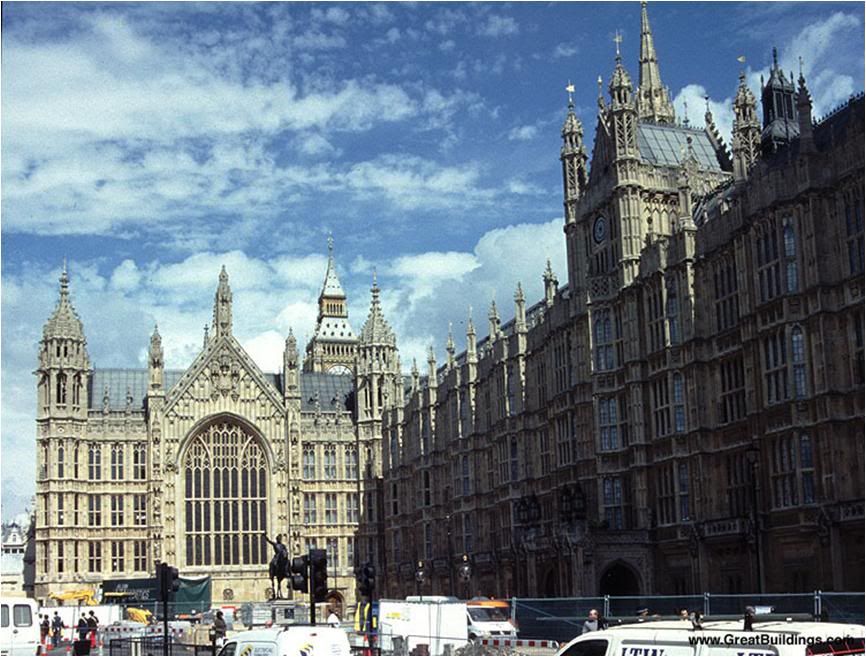 Westminster Hall is the oldest part of the architectural complex known as Westminster Palace, or more commonly, the Houses of Parliament.
Westminster Hall is the oldest part of the architectural complex known as Westminster Palace, or more commonly, the Houses of Parliament.
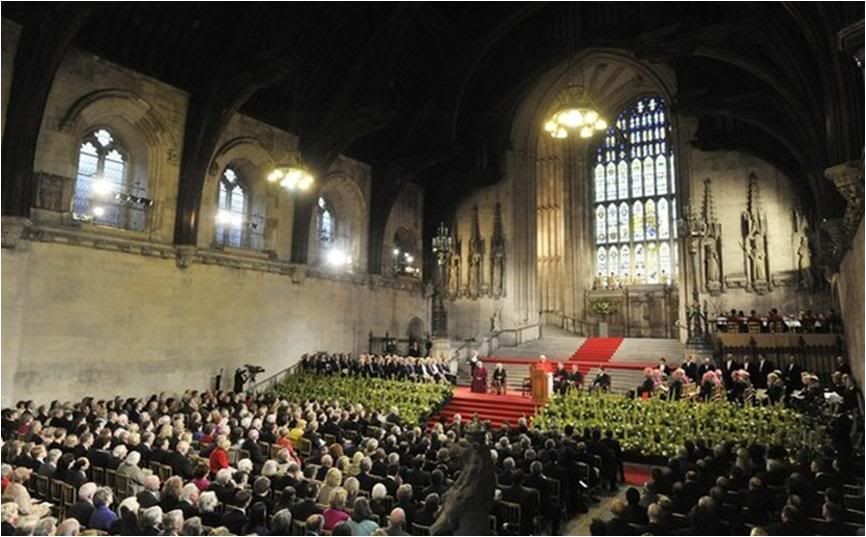
The high point of the Holy Father's encounter with the secular world during his current state visit was his address today to representatives of civilian British society at historic Westminster Hall.
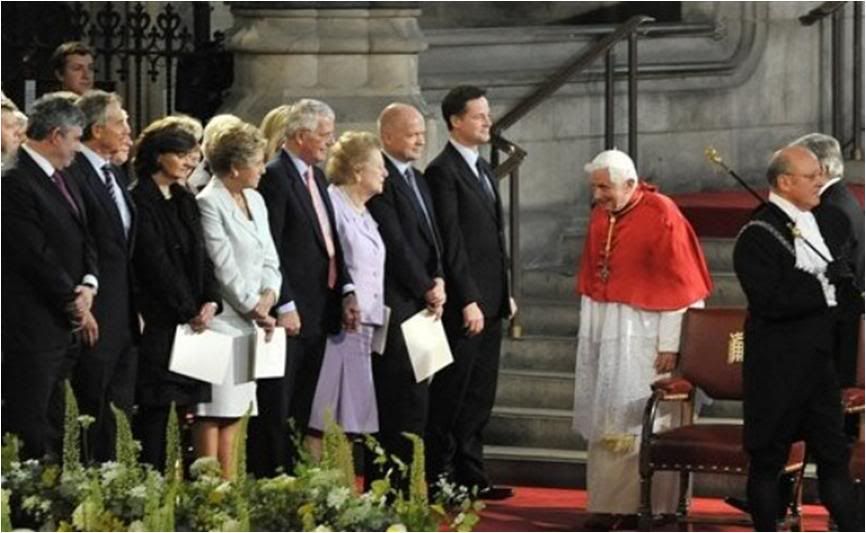
Among the guests were four former Prime Ministers - Labourites Gordon Brown and Tony Blair, and the Conservative (Tory) party's Margaret Thatcher and John Majors, with whom the Pope later held separate private meetings.
ADDRESS OF HIS HOLINESS BENEDICT XVI
Westminster Hall - City of Westminster
Friday, 17 September 2010
Mr Speaker,
Thank you for your words of welcome on behalf of this distinguished gathering. As I address you, I am conscious of the privilege afforded me to speak to the British people and their representatives in Westminster Hall, a building of unique significance in the civil and political history of the people of these islands.
Allow me also to express my esteem for the Parliament which has existed on this site for centuries and which has had such a profound influence on the development of participative government among the nations, especially in the Commonwealth and the English-speaking world at large.
Your common law tradition serves as the basis of legal systems in many parts of the world, and your particular vision of the respective rights and duties of the state and the individual, and of the separation of powers, remains an inspiration to many across the globe.
As I speak to you in this historic setting, I think of the countless men and women down the centuries who have played their part in the momentous events that have taken place within these walls and have shaped the lives of many generations of Britons, and others besides.
In particular, I recall the figure of Saint Thomas More, the great English scholar and statesman, who is admired by believers and non-believers alike for the integrity with which he followed his conscience, even at the cost of displeasing the sovereign whose “good servant” he was, because he chose to serve God first.
The dilemma which faced More in those difficult times, the perennial question of the relationship between what is owed to Caesar and what is owed to God, allows me the opportunity to reflect with you briefly on the proper place of religious belief within the political process.
This country’s Parliamentary tradition owes much to the national instinct for moderation, to the desire to achieve a genuine balance between the legitimate claims of government and the rights of those subject to it.
While decisive steps have been taken at several points in your history to place limits on the exercise of power, the nation’s political institutions have been able to evolve with a remarkable degree of stability.
In the process, Britain has emerged as a pluralist democracy which places great value on freedom of speech, freedom of political affiliation and respect for the rule of law, with a strong sense of the individual’s rights and duties, and of the equality of all citizens before the law.
While couched in different language, Catholic social teaching has much in common with this approach, in its overriding concern to safeguard the unique dignity of every human person, created in the image and likeness of God, and in its emphasis on the duty of civil authority to foster the common good.
And yet the fundamental questions at stake in Thomas More’s trial continue to present themselves in ever-changing terms as new social conditions emerge.
Each generation, as it seeks to advance the common good, must ask anew: what are the requirements that governments may reasonably impose upon citizens, and how far do they extend? By appeal to what authority can moral dilemmas be resolved?
These questions take us directly to the ethical foundations of civil discourse. If the moral principles underpinning the democratic process are themselves determined by nothing more solid than social consensus, then the fragility of the process becomes all too evident - herein lies the real challenge for democracy.
The inadequacy of pragmatic, short-term solutions to complex social and ethical problems has been illustrated all too clearly by the recent global financial crisis.
There is widespread agreement that the lack of a solid ethical foundation for economic activity has contributed to the grave difficulties now being experienced by millions of people throughout the world.
Just as “every economic decision has a moral consequence” (Caritas in Veritate, 37), so too in the political field, the ethical dimension of policy has far-reaching consequences that no government can afford to ignore.
A positive illustration of this is found in one of the British Parliament’s particularly notable achievements – the abolition of the slave trade. The campaign that led to this landmark legislation was built upon firm ethical principles, rooted in the natural law, and it has made a contribution to civilization of which this nation may be justly proud.
The central question at issue, then, is this: where is the ethical foundation for political choices to be found?
The Catholic tradition maintains that the objective norms governing right action are accessible to reason, prescinding from the content of revelation.
According to this understanding, the role of religion in political debate is not so much to supply these norms, as if they could not be known by non-believers – still less to propose concrete political solutions, which would lie altogether outside the competence of religion – but rather to help purify and shed light upon the application of reason to the discovery of objective moral principles.
This “corrective” role of religion vis-à-vis reason is not always welcomed, though, partly because distorted forms of religion, such as sectarianism and fundamentalism, can be seen to create serious social problems themselves.
And in their turn, these distortions of religion arise when insufficient attention is given to the purifying and structuring role of reason within religion.
It is a two-way process. Without the corrective supplied by religion, though, reason too can fall prey to distortions, as when it is manipulated by ideology, or applied in a partial way that fails to take full account of the dignity of the human person.
Such misuse of reason, after all, was what gave rise to the slave trade in the first place and to many other social evils, not least the totalitarian ideologies of the twentieth century.
This is why I would suggest that the world of reason and the world of faith – the world of secular rationality and the world of religious belief – need one another and should not be afraid to enter into a profound and ongoing dialogue, for the good of our civilization.
Religion, in other words, is not a problem for legislators to solve, but a vital contributor to the national conversation.
In this light, I cannot but voice my concern at the increasing marginalization of religion, particularly of Christianity, that is taking place in some quarters, even in nations which place a great emphasis on tolerance.
There are those who would advocate that the voice of religion be silenced, or at least relegated to the purely private sphere.
There are those who argue that the public celebration of festivals such as Christmas should be discouraged, in the questionable belief that it might somehow offend those of other religions or none.
And there are those who argue – paradoxically with the intention of eliminating discrimination – that Christians in public roles should be required at times to act against their conscience.
These are worrying signs of a failure to appreciate not only the rights of believers to freedom of conscience and freedom of religion, but also the legitimate role of religion in the public square.
I would invite all of you, therefore, within your respective spheres of influence, to seek ways of promoting and encouraging dialogue between faith and reason at every level of national life.
Your readiness to do so is already implied in the unprecedented invitation extended to me today. And it finds expression in the fields of concern in which your Government has been engaged with the Holy See.
In the area of peace, there have been exchanges regarding the elaboration of an international arms trade treaty; regarding human rights, the Holy See and the United Kingdom have welcomed the spread of democracy, especially in the last sixty-five years.
in the field of development, there has been collaboration on debt relief, fair trade and financing for development, particularly through the International Finance Facility, the International Immunization Bond, and the Advanced Market Commitment.
The Holy See also looks forward to exploring with the United Kingdom new ways to promote environmental responsibility, to the benefit of all.
I also note that the present Government has committed the United Kingdom to devoting 0.7% of national income to development aid by 2013. In recent years it has been encouraging to witness the positive signs of a worldwide growth in solidarity towards the poor.
But to turn this solidarity into effective action calls for fresh thinking that will improve life conditions in many important areas, such as food production, clean water, job creation, education, support to families, especially migrants, and basic healthcare.
Where human lives are concerned, time is always short: yet the world has witnessed the vast resources that governments can draw upon to rescue financial institutions deemed “too big to fail”.
Surely the integral human development of the world’s peoples is no less important: here is an enterprise, worthy of the world’s attention, that is truly “too big to fail”.
This overview of recent cooperation between the United Kingdom and the Holy See illustrates well how much progress has been made, in the years that have passed since the establishment of bilateral diplomatic relations, in promoting throughout the world the many core values that we share.
I hope and pray that this relationship will continue to bear fruit, and that it will be mirrored in a growing acceptance of the need for dialogue and respect at every level of society between the world of reason and the world of faith.
I am convinced that, within this country too, there are many areas in which the Church and the public authorities can work together for the good of citizens, in harmony with this Parliament’s historic practice of invoking the Spirit’s guidance upon those who seek to improve the conditions of all mankind.
For such cooperation to be possible, religious bodies – including institutions linked to the Catholic Church – need to be free to act in accordance with their own principles and specific convictions based upon the faith and the official teaching of the Church. In this way, such basic rights as religious freedom, freedom of conscience and freedom of association are guaranteed.
The angels looking down on us from the magnificent ceiling of this ancient Hall remind us of the long tradition from which British Parliamentary democracy has evolved. They remind us that God is constantly watching over us to guide and protect us. And they summon us to acknowledge the vital contribution that religious belief has made and can continue to make to the life of the nation.
Mr Speaker, I thank you once again for this opportunity briefly to address this distinguished audience. Let me assure you and the Lord Speaker of my continued good wishes and prayers for you and for the fruitful work of both Houses of this ancient Parliament. Thank you and God bless you all!
The Telegraph publications, which have proven to be the only London-based major MSM that has taken a positive editorial stand on the Pope's visit, was quick to publish an editorial - the third in the space of two weeks - on the Pope's Westminster Hall address. The Telegraph editors have decided to be fair and objective - as refreshing to find in the mainstream media, as much as the Telegraph finds Pope Benedict's words on the role of religion in public life.
The Pope puts religion
back in the spotlight
Editorial (The Telegraph View)

17 Sep 2010
Something unexpected is happening during the papal visit to this country: the British public is listening with curiosity and genuine respect to Pope Benedict XVI.
Catholics, non-Catholics and non-believers recognise that the world's most influential spiritual leader is here to deliver a message not just to Britain but also to an international audience.
The Pope is using his presence in one of Europe's most secular countries to reach out to English speakers everywhere. His opinions – expressed in prose of great clarity – are uplifting, challenging or just plain wrong, depending on your point of view. But, contrary to the predictions of many commentators, they are not falling on deaf ears.
Speaking in Westminster Hall, the Pope declared that Britain's pluralist democracy had much in common with Catholic social teaching. Both were concerned with safeguarding "the unique dignity of every human being".
Britain had demonstrated its love of freedom by abolishing the slave trade, he said. But, he implied, something had gone wrong: "There are worrying signs of a failure to appreciate not only the rights of believers to freedom of conscience and freedom of religion, but also the legitimate role of religion in the public square."
The Pope did not directly apply this criticism to modern Britain, but no one in the distinguished audience of community leaders will have been in any doubt that he was referring to us.
Some listeners may have taken offence at these words, given the Vatican's failure – now properly acknowledged by Benedict XVI – to address the grave crimes of a small minority of its clergy. [One must object to this pat characterization of the Pope's inflight words which completely ignores everything Cardinal Ratzinger/Benedict XVI has said implicitly about this aspect of the issue before, most notably in his Letter to Irish Catholics.]
But we suspect that many more people will have set aside their reservations about the Roman Catholic Church and said to themselves: "He has a point."
Members of the Church of England and smaller Protestant Churches share with Catholics a feeling that Christians are easy targets for liberal politicians and celebrities who lack the courage to criticise Islam.
Under the last government, Christians were bullied for wearing crosses at work, distributing leaflets and holding unfashionable opinions on homosexuality and birth control.
One may disagree with Catholics and conservative Protestants on the subject of gay adoption, but it was disturbing to witness the hounding of Catholic adoption agencies that wished to place children only with married couples. Their right to do so was abolished by New Labour.
In addition, they were portrayed by opinion formers in the media, universities and showbusiness as hate-crazed homophobes.
Militant secularists have taken our tradition of tolerance and whittled it down to something quite different: toleration for a narrow spectrum of liberal-approved beliefs. Anyone who falls outside that spectrum runs the risk of being demonised.
No one knows this better than Benedict XVI, who has been defamed as a Nazi-sympathising protector of child rapists. Famous atheists and agnostics have exploited their media contacts in order to sneer at the Pope. Sometimes this sneering is dressed up as wit; but it is so monotonous that the public is increasingly tired of it.
There has been a backlash against anti-Catholic celebrities, some of whom have reacted in a pompous, thin-skinned manner. Dishing out criticism is a central practice of the new atheists; taking it, on the other hand, is not.
Pope Benedict's critics have underestimated him. They worked themselves into a state of indignation at the visit of a man about whom they knew only a few things – and most of these turn out to be wrong, on closer inspection.
Anyone who thinks that Joseph Ratzinger is a former Nazi, or that he actively conspired to protect child abusers, has not done his or her homework.
The present Pope is a gentle, smiling intellectual who, in the course of many books, has evolved a sophisticated understanding of the relationship between faith and logic. That much was clear in his Westminster Hall address, in which he discussed religion's "corrective" role with regard to reason, and the "purifying" role of reason within faith.
Benedict XVI believes that revelation and intellect complement each other, and that Christians – whether they be Catholics, Anglicans, Protestants or Orthodox – need not apologise for holding both scientific and supernatural beliefs.
In short, the Pope is a Christian statesman, not just a Roman Catholic one. He does not agree with the Archbishop of Canterbury on the doctrine of the priesthood, but he recognises Dr Williams as a fellow Christian leader and the Queen as a constitutional guardian of Christian freedom.
Indeed, much more unites the Pontiff, the Archbishop and the Monarch than divides them: their faith in Christ, of course, but also (as they have each suggested in different ways) an anxiety that the Judaeo-Christian roots of Western civilisation are being pulled from our soil.
Yesterday marked the beginning of the Jewish feast of Yom Kippur; the Pope sent his best wishes to the Chief Rabbi, Lord Sacks, who is on record as supporting the Pope in his opposition to the exclusion of religion from the public square.
It is too early to say whether this visit has been a success. But one thing we can say is that in Westminster Hall religion was well and truly yanked back into that square. And it was a refreshing and challenging experience.
[Modificato da TERESA BENEDETTA 18/09/2010 02:26] |
| |
 18/09/2010 00:35 18/09/2010 00:35 |
|
| | | OFFLINE | | Post: 21.017
Post: 3.654 | Registrato il: 28/08/2005
Registrato il: 20/01/2009 | Administratore | Utente Master | |
|

 ECUMENICAL EVENING PRAYER SERVICE
ECUMENICAL EVENING PRAYER SERVICE
AT WESTMINSTER ABBEY
I haven't been able to find a news report so far on this ecumenical service, so I am picking up details of an advance news release from BBC Radio, to provide an introduction. Strangely, BBC News has only filed one story today which covers all events of the day - quite objectively really, and devoting just one line [a record for reticence about the protestors!] to the protestors who did turn up todau.
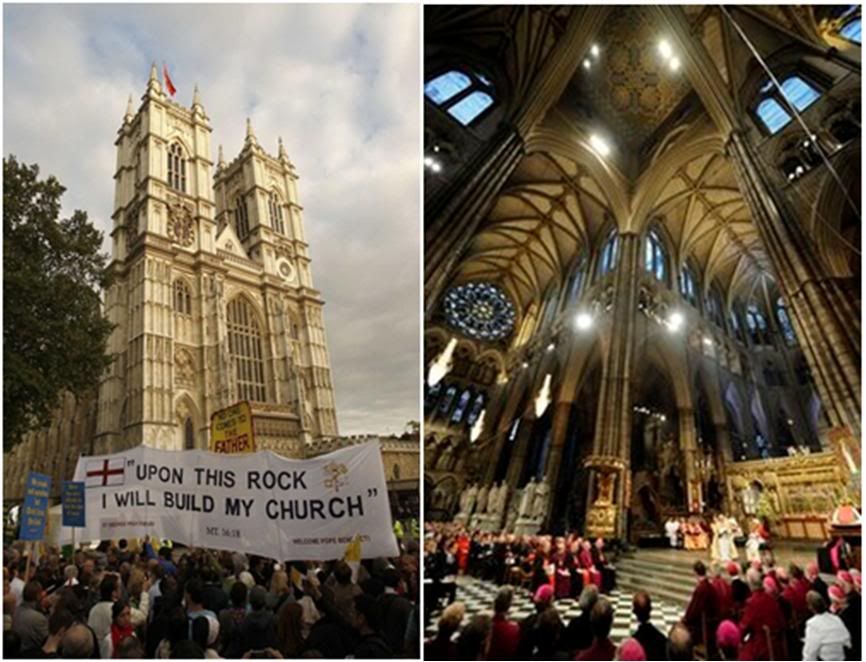
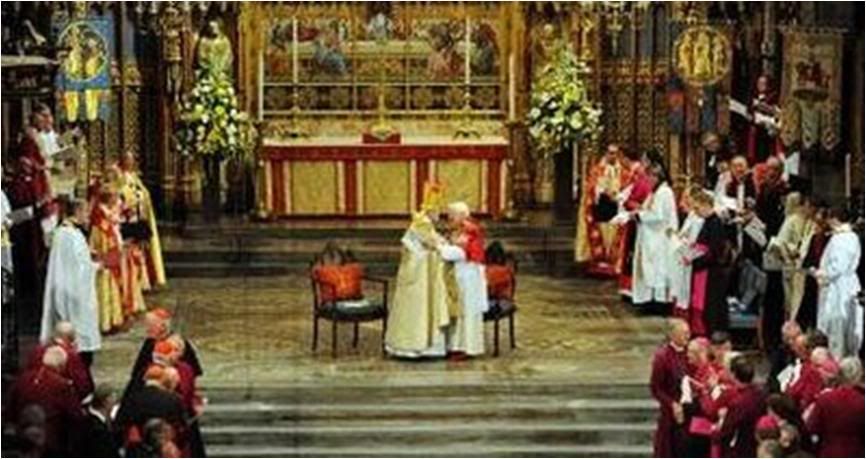
Pope Benedict XVI and the Archbishop of Canterbury led ecumenical Evening Prayer today in Westminster Abbey.
They were joined by the Archbishop of York, the Most Reverend and Right Honourable Dr John Sentamu; and the Roman Catholic Archbishop of Westminster, the Most Reverend Vincent Nichols; together with church leaders from many denominations. The congregation for the service numbered around 2000.
The Pope was greeted at the Abbey's west gate by the Dean of Westminster, the Very Reverend Dr John Hall, who first escorted him to the Grave of the Unknown Warrior in the Nave, where His Holiness spent a moment of prayer for peace.
During the Service of Evening Prayer, both the Pope and the Archbishop of Canterbury gave an Address from the Sacrarium. They both prayed at the Shrine of St Edward the Confessor - His Grace, for Church and State; and His Holiness, for Christian unity. After that, they gave a joint Blessing from the High Altar.
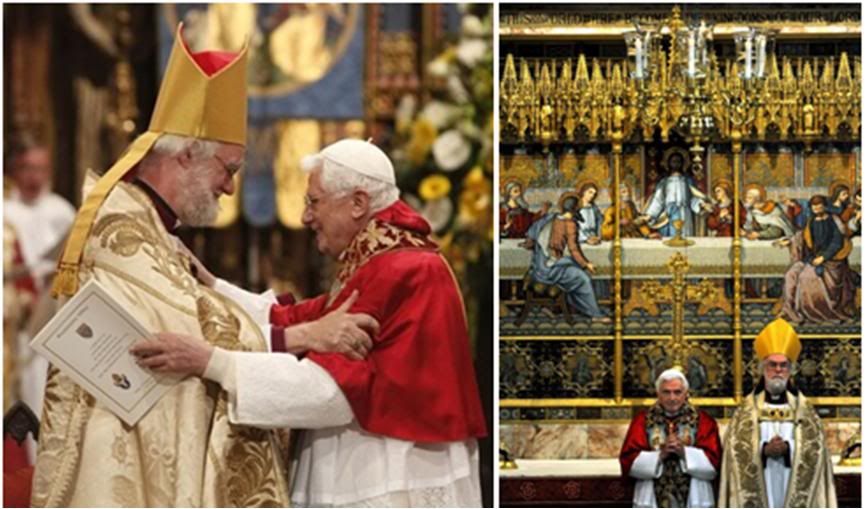
INTRODUCTORY WORDS OF HIS HOLINESS BENEDICT XVI
DURING THE EVENING PRAYER
Your Grace, Mr Dean,
Dear Friends in Christ,
I thank you for your gracious welcome. This noble edifice evokes England’s long history, so deeply marked by the preaching of the Gospel and the Christian culture to which it gave birth.
I come here today as a pilgrim from Rome, to pray before the tomb of Saint Edward the Confessor and to join you in imploring the gift of Christian unity.
May these moments of prayer and friendship confirm us in love for Jesus Christ, our Lord and Saviour, and in common witness to the enduring power of the Gospel to illumine the future of this great nation.
ADDRESS OF THE HOLY FATHER
AT THE CONCLUSION OF THE EVENING PRAYER
Dear friends in Christ,
I thank the Lord for this opportunity to join you, the representatives of the Christian confessions present in Great Britain, in this magnificent Abbey Church dedicated to Saint Peter, whose architecture and history speak so eloquently of our common heritage of faith.
Here we cannot help but be reminded of how greatly the Christian faith shaped the unity and culture of Europe and the heart and spirit of the English people. Here too, we are forcibly reminded that what we share, in Christ, is greater than what continues to divide us.
I am grateful to His Grace the Archbishop of Canterbury for his kind greeting, and to the Dean and Chapter of this venerable Abbey for their cordial welcome.
I thank the Lord for allowing me, as the Successor of Saint Peter in the See of Rome, to make this pilgrimage to the tomb of Saint Edward the Confessor.
Edward, King of England, remains a model of Christian witness and an example of that true grandeur to which the Lord summons his disciples in the Scriptures we have just heard: the grandeur of a humility and obedience grounded in Christ’s own example (cf. Phil 2:6-8), the grandeur of a fidelity which does not hesitate to embrace the mystery of the Cross out of undying love for the divine Master and unfailing hope in his promises (cf. Mk 10:43-44).
This year, as we know, marks the hundredth anniversary of the modern ecumenical movement, which began with the Edinburgh Conference’s appeal for Christian unity as the prerequisite for a credible and convincing witness to the Gospel in our time.
In commemorating this anniversary, we must give thanks for the remarkable progress made towards this noble goal through the efforts of committed Christians of every denomination.
At the same time, however, we remain conscious of how much yet remains to be done. In a world marked by growing interdependence and solidarity, we are challenged to proclaim with renewed conviction the reality of our reconciliation and liberation in Christ, and to propose the truth of the Gospel as the key to an authentic and integral human development.
In a society which has become increasingly indifferent or even hostile to the Christian message, we are all the more compelled to give a joyful and convincing account of the hope that is within us (cf. 1 Pet 3:15), and to present the Risen Lord as the response to the deepest questions and spiritual aspirations of the men and women of our time.
As we processed to the chancel at the beginning of this service, the choir sang that Christ is our “sure foundation”. He is the Eternal Son of God, of one substance with the Father, who took flesh, as the Creed states, “for us men and for our salvation”.
He alone has the words of everlasting life. In him, as the Apostle teaches, “all things hold together” … “for in him all the fullness of God was pleased to dwell” (Col 1:17,19).
Our commitment to Christian unity is born of nothing less than our faith in Christ, in this Christ, risen from the dead and seated at the right hand of the Father, who will come again in glory to judge the living and the dead.
It is the reality of Christ’s person, his saving work and above all the historical fact of his resurrection, which is the content of the apostolic kerygma and those credal formulas which, beginning in the New Testament itself, have guaranteed the integrity of its transmission.
The Church’s unity, in a word, can never be other than a unity in the apostolic faith, in the faith entrusted to each new member of the Body of Christ during the rite of Baptism. It is this faith which unites us to the Lord, makes us sharers in his Holy Spirit, and thus, even now, sharers in the life of the Blessed Trinity, the model of the Church’s koinonia here below.
Dear friends, we are all aware of the challenges, the blessings, the disappointments and the signs of hope which have marked our ecumenical journey.
Tonight we entrust all of these to the Lord, confident in his providence and the power of his grace. We know that the friendships we have forged, the dialogue which we have begun and the hope which guides us will provide strength and direction as we persevere on our common journey.
At the same time, with evangelical realism, we must also recognize the challenges which confront us, not only along the path of Christian unity, but also in our task of proclaiming Christ in our day.
Fidelity to the word of God, precisely because it is a true word, demands of us an obedience which leads us together to a deeper understanding of the Lord’s will, an obedience which must be free of intellectual conformism or facile accommodation to the spirit of the age.
This is the word of encouragement which I wish to leave with you this evening, and I do so in fidelity to my ministry as the Bishop of Rome and the Successor of Saint Peter, charged with a particular care for the unity of Christ’s flock.
Gathered in this ancient monastic church, we can recall the example of a great Englishman and churchman whom we honour in common: Saint Bede the Venerable.
At the dawn of a new age in the life of society and of the Church, Bede understood both the importance of fidelity to the word of God as transmitted by the apostolic tradition, and the need for creative openness to new developments and to the demands of a sound implantation of the Gospel in contemporary language and culture.
This nation, and the Europe which Bede and his contemporaries helped to build, once again stands at the threshold of a new age. May Saint Bede’s example inspire the Christians of these lands to rediscover their shared legacy, to strengthen what they have in common, and to continue their efforts to grow in friendship.
May the Risen Lord strengthen our efforts to mend the ruptures of the past and to meet the challenges of the present with hope in the future which, in his providence, he holds out to us and to our world. Amen.
[Modificato da TERESA BENEDETTA 18/09/2010 02:23] |
| |
 18/09/2010 01:26 18/09/2010 01:26 |
|
| | | OFFLINE | | Post: 21.018
Post: 3.655 | Registrato il: 28/08/2005
Registrato il: 20/01/2009 | Administratore | Utente Master | |
|

 Pope says Christianity
Pope says Christianity
is being marginalized

Sept. 17, 2010
The Pope has warned that religion - and Christianity in particular - is "being marginalised" around the world.
His comments came in his keynote speech to UK MPs, senior members of British society, and religious leaders at Westminster Hall in central London.
Pope Benedict XVI warned that there were some people who wanted to see "the voice of religion be silenced".
He returned to the subject in a service at Westminster Abbey, asking Christians to speak out about their faith.
BBC correspondent Peter Hunt described the speech at Westminster Hall as "a rallying call, and a plea - for religion not to be squeezed out by secular society".
The Pope was speaking as a sixth man was arrested as counter-terrorism detectives investigate an alleged threat to Pope Benedict XVI's visit.
In his speech at Westminster Hall, the Pope called on those in attendance to seek ways to promote faith "at every level of national life".
He added: "I cannot but voice my concern at the increasing marginalisation of religion, particularly of Christianity, that is taking place in some quarters, even in nations which place a great emphasis on tolerance.
"There are those who would advocate that the voice of religion be silenced, or at least relegated to the purely private sphere.
"There are those who argue that the public celebration of festivals such as Christmas should be discouraged, in the questionable belief that it might somehow offend those of other religions or none."
At the service celebrated jointly with the Archbishop of Canterbury, Dr Rowan Williams, at Westminster Abbey, the Pope said: "in a society which has become increasingly indifferent or even hostile to the Christian message", believers were "all the more compelled to give a joyful and convincing account" of their faith.
He also shook incense over the tomb of Edward the Confessor - regarded as a saint by both Churches. [DIM=8pt ][He became a saint centuries before the Church of England came into being by breaking off from Rome! And 'shook incense' is not an idiomatic term at all!]
Following the service, the Pope travelled back to the home of Papal Nuncio - his official representitive in the UK - in Wimbledon, south-west London.
Earlier, the Pope met Dr Williams at Lambeth Palace - a meeting attended by Anglican and Roman Catholic bishops from different parts of the UK.
It comes at a time when Anglican moves towards appointing women bishops have unsettled relations with Rome.
But the Pope said he wanted to focus on the "deep friendship" between the two churches rather than their differences.
The Lambeth Palace meeting marked the first time a Pope has met the Archbishop at his official residence.
It was viewed as an important event more than 40 years after official talks began about possible reunification of the two churches.
Divisions remain over Roman Catholic opposition to the ordination of women priests. Meanwhile the Church of England's General Synod left the way open for appointing women bishops at its meeting in July.
The Vatican angered many supporters of women's ordination by describing it as a "grave crime" to be dealt with in the same process as sex abuse, though it denied it was equating the two.
Dr Williams said in his opening remarks that the Pope was "most welcome" at Lambeth Palace.
He then praised the pontiff's "consistent and penetrating analysis of the state of European society".
As the Pope left Lambeth Palace to travel the short distance to Westminster Hall in his Popemobile, thousands of people lined the streets.
At one point he stopped the vehicle to bless a baby that was handed up to him.
Earlier, the Pope led an assembly of 4,000 Catholic school children in west London.
He used his address at St Mary's University College in Twickenham, to say that the safety of children was vital in all schools, an apparent reference to the Church's child abuse scandal.
He also warned against the limitations of celebrity and science.
The Pontiff told the crowd young people were often encouraged to model themselves on celebrities.
He said: "My question for you is this: What are the qualities you see in others that you would most like to have yourselves? What kind of person would you really like to be?'
"I'm asking you not to be content with second-best."
He went on to say having money or a successful career was not enough to make people happy, but true happiness could be found in God.
Tight security surrounded the event, called The Big Assembly, and monks and nuns who had waited in long queues were frisked by police.
Around 100 protesters against the Vatican's record on gay rights, equality and birth control had gathered ahead of his arrival, amid tight security.
The Church saw it as an opportunity to celebrate the work of more than 2,000 Catholic schools across the UK, in partnership with the state.
But critics said it could fuel hostility to faith schools and serve as a painful reminder of the child abuse scandal within the Catholic Church. [But for these critics, absolutely anything at all can and does fuel their hostility to the Church and gives them an opportunity to bring up the sex abuse issue!]
BBC's religious affairs correspondent Robert Piggott offers a brief analysis of the Pope's address to Britain's civilian society today:
This was one of the most important speeches of Pope Benedict's papacy and he used it to warn the very health of democracy in Britain was being jeopardised by the marginalisation of religion.
His essential message was that democracy relies on the use of reason but that human reasoning was being distorted by ideology and changing social fashions.
The Pope insisted reason needed to be judged against the unchanging teaching offered by religion - based as it was on "natural law", the fundamental nature of people.
This was a dramatic attempt by Pope Benedict to force civic leaders to question the essential working of a democracy they have taken for granted would operate for the good of all.
His aim was to halt what he sees as the trend for governments to legislate to try to govern people's beliefs as well as their behaviour.
[Piggott is actually capable of writing something objective and unbiased! Perhaps it's all part of the famous 'Benedict effect' that was evident in Scotland yesterday. In the normal course of events, the MSM always forget there is such a tried and tested 'Benedict effect' - until it is demonstrated during a high-pressure, time-compressed occasion like a trip abroad which has the virtue of focusing and concentrating Benedict's particular charisms 24/7.
Today's events with the Anglicans at Lambeth Palace and in Westminster Abbey went very well - defying all the anticipatory Cassandra tones about the Anglicans still in a snit over Anglicanorum coetibus - but the "Benedict effect' must still be tested in one last London event - the Hyde Park prayer vigil tomorrow.]
A day of firsts
by Sean Patrick Lovett

LONDON, Sept. 17 (RV) - There’s a first time for everything...and for everyone. Even the Pope. And for Benedict XVI, Friday the 17th was his day of firsts.
The day was a steady build-up that began first thing in the morning with his first Mass celebrated in the papal nunciature. His second first (if you’ll excuse the expression) came when he visited St Mary’s University College for a celebration of Catholic education. There, for the first time, he forthrightly and unambiguously invited young people and children to become “the future saints of the twenty-first century”...
"I hope that among those of you listening to me today there are some of the future saints of the twenty-first century".
But the biggest firsts came in the afternoon when Benedict XVI became the first-ever Pope to enter Lambeth Palace, the official and historic residence of the Archbishop of Canterbury in London. It was there that he spoke about “friendship” and “progress” in Catholic-Anglican relations...
"I wish to join you in giving thanks for the deep friendship that has grown between us and for the remarkable progress that has been made in so many areas of dialogue during the forty years that have elapsed since the Anglican-Roman Catholic International Commission began its work. Let us entrust the fruits of that work to the Lord of the harvest, confident that he will bless our friendship with further significant growth."
One first deserves another – and that’s what happened immediately afterwards when the Pope crossed the River Thames and entered the hallowed halls of Westminster, seat of the British Parliament and world-famous post-card picture. [The event itself was held in Westminster Hall, the oldest part of the complex, not in Parliament itself, as he would have if he had been asked to address the House of Commons and the House of Lords.]
Here, he gave an historic address to an illustrious gathering that included a scintillating smattering of British who’s-who: from former Prime Ministers, Margaret Thatcher and Tony Blair, to the best of British economists, academics, diplomats and others.
After pausing on the very spot where former Lord Chancellor of England, Sir Thomas More, was condemned to death in 1535 for choosing to follow his Catholic faith rather than his king, the Pope delivered a wide-ranging discourse during which he pointedly referred to what he called “More’s dilemma” and to the “proper place of religious belief within the political process”...
"The dilemma which faced More in those difficult times, the perennial question of the relationship between what is owed to Caesar and what is owed to God, allows me the opportunity to reflect with you briefly on the proper place of religious belief within the political process.
But the day of firsts wasn’t over yet. It culminated with an evening prayer service at Westminster Abbey, a deeply significant event since it marked the first time any Pope had ever entered this most important of Anglican churches and landmarks: it’s where most British monarchs have been crowned since 1066, including Henry VIII, the king responsible for suppressing Catholicism in Britain, in the first place.
[Modificato da TERESA BENEDETTA 18/09/2010 01:29] |
| |
 18/09/2010 04:18 18/09/2010 04:18 |
|
| | | OFFLINE | | Post: 21.019
Post: 3.656 | Registrato il: 28/08/2005
Registrato il: 20/01/2009 | Administratore | Utente Master | |
|
 In tomorrow's issue (9/18), The Scotsman confirms that Benedict the man, in flesh and blood, has worked his 'Benedict effect' (sounds better in Italian - 'effetto Benedetto' - at least to the writer of this article.
Analysis: After all the ritual, pomp and ceremony,
In tomorrow's issue (9/18), The Scotsman confirms that Benedict the man, in flesh and blood, has worked his 'Benedict effect' (sounds better in Italian - 'effetto Benedetto' - at least to the writer of this article.
Analysis: After all the ritual, pomp and ceremony,
it's Benedict the man we are sure to remember
By Raymond Notarangelo

Sept. 18, 2010
What a platform to work from. Wall-to-wall media and TV coverage, frenzied and adoring crowds, and success beyond the dreams (or should that be prayers) of the Scottish Catholic Church.
Yes, Scotland being the starting point of the first papal state visit to Britain meant that 16 September was going to be no ordinary day. But that alone was no guarantee of how Scotland's Catholics - and indeed Scotland itself - would respond and react to the visit of Pope Benedict XVI.
But how does the Catholic Church build on this legacy?
The answers are best found by looking at what made the visit such a success.
In ten short hours, so many myths and misconceptions of this Pope were put to the sword. If the Church is to capitalise on this, it has to ensure these negative perceptions do not return. In other words, let Benedict be Benedict.
Here was a man who, to many, was seen as aloof, austere and out of touch.
But by letting the real Benedict be seen, the warmth and affection were enveloping. But better than that, it has changed his image forever.
The plucking of the baby from the crowds in Bellahouston Park, the relaxed on-camera conversations with the Queen, the abandon of protocol as Cardinal O'Brien draped him with the papal tartan scarf in the Popemobile.
[It is clear Mr. Notarangelo's awareness of Benedict XVI before he came to Scotland was, lamentably, based entirely on what he read in the MSM, and that nothing had ever prompted him to look beyond the MSM's tunnel vision - despite the wealth of Benedict-video now available online, and the stream of photos that the news agencies themselves release daily. There's a reason all the Benedict forums set great store and value on his photographs, because they do capture his personality and his uniqueness in all his 'naturalness', all of which amplify and immeasurably enhance the intellectual and spiritual qualities he conveys in his writings. But, of course, even 10 hours exposure to THE MAN in person can trump all that. So, Mr. Notarangelo, thank your lucky stars you experienced the Benedict effect directly, and may it stay with you always!]
And whoever suggested he go on an impromptu walkabout outside the cardinal's house should be blessed with PR sainthood. [Oh dear, I must research this! I've not read anything about this. How wonderful!]
These classic photocall opportunities yielded a lifetime of memories - much like those that were forged from Pope John Paul II's 1982 visit.
The Catholic Church must cement this new impression of their Pope by ensuring he remains human and in touch with the people. A key to this is how Benedict deals with the child abuse scandals that continue to hang over him and the Church. Closer to home, this is not a time for Scotland's Catholic Church hierarchy to bask in papal glory.
Cardinal O'Brien needs to go on an immediate PR offensive to build on the goodwill generated by the visit and show that the Catholic Church has a valid and vital role to play in modern Scotland.
But, more crucially, the Church needs to connect with its young people. Those children who waved fanatically and smiled broadly as they cheered the Pope in Edinburgh and Glasgow cannot be lost to the Church if parishes and those entering the priesthood are to stop their continual dwindling. [Watching all the children at the Scotland events and in Twickenham today, I was mightily gratified that their parents and their teachers obviously did and are doing something right to generate the kind of excitement I remember from my schooldays from just the annual Pope's Day celebration - in the days before satellite TV when Pius XII and John XXIII might as well have lived on the moon so remote were they from our direct or virtual experience!]
Schools and local churches will need to strengthen their relevance for young people. It won't be enough to hope that the Pope's words to avoid the temptations of "drugs, money, sex, pornography, alcohol" will be followed. They will need constant and relevant reminders that the Church has a rightful place in their lives.
Thankfully for them, they now have an even stronger figurehead to help them on that journey.
As for Damian Thompson's post-Mass commentary below, I think the Mass was both a spiritual triumph and unexceptionable liturgy, as any liturgy is when the Pope is celebrating. But on balance, he liked the Mass more than he disliked some of its elements, so I am glad....
The Papal Mass in Glasgow:
A spiritual triumph,
if not a liturgical one

Sept. 16, 2010
The Catholics of Scotland can be proud indeed of the welcome they gave the Pope today, confounding and infuriating smug celebs in London who just don’t get it. I was impressed not just by the size of the crowds at Bellahouston but also by the reverence and warmth of their participation. [That was truly impressive and moving!]
Pope Benedict drew strength from them – he seemed less frail, less worried than earlier in the day, relieved and perhaps surprised to find himself among so many friends.
And what a moving, well-judged sermon: the Pope’s warning to young people about the empty pleasures of alcohol, money, sex and drugs struck me as a sensitive acknowledgement of the terrible blight of addiction on Scottish council estates.
And the liturgy itself? I had such high hopes as the Pope entered the park to the strains of the Old Hundredth, one of the greatest of all Protestant hymn tunes: a rare example of an ecumenical gesture that didn’t embarrass. [The liturgy, however, is more than just the music!]
James MacMillan’s Mass of Blessed John Henry Newman fully lived up to expectations, too. My friend Keith Stanfield, a 22-year-old Catholic musician, emailed me during the service to praise its grandeur and catchiness.
But he was baffled by the endless dreary pseudo-Celtic hymns and antiphons. “Some of it was hippy stuff, some of it was Lord of the Rings. How disappointing that this is the best we have to offer our Pontiff. I think you have to be a certain age to appreciate this kind of music.”
[I have a different attitude about the liturgical music at these papal Masses. I don't expect to hear an integral presentation like a Solesmes Mass or a classical Mass. I know it is the product of necessary compromise on the part of the Pope's master for liturgical ceremonies who has to approve the music as well as other features of any liturgy that the Pope will take part in. Local hosts understandably have their own musical preferences. So even if the hosts have to follow a certain minimum requirement for sung Latin - at least the Kyrie (which is Greek, actually) and the Pater Noster - their choices for all the rest of the music will be dictated by local preferences for what is familiar to the diocese - while observing specific caveats from Mons. Marini against what might be inappropriate.
So, if the Glasgow Mass featured 'pseudo-Celtic' music, it may have been dreadful to purists of liturgical music, but unobjectionable or even pleasing to someone hearing it for the first time! In Glasgow, the fact alone that polyphonic settings were used was already a plus. More than that, however, as in the Washington DC Mass (where the mix was far more eclectic and 'pop'), the choir and the congregation sang prayerfully. I am sure the Pope himself does not judge these Masses by the music they choose or how they perform it, but by the reverence and celebration of God that the congregation manifests in many ways, of which the liturgical music is but one.]
And if Beethoven had been present to hear what they did to his “Ode to Joy” at the end… well, perhaps for once he would have been glad of his deafness. [I disagree! You have to listen to it in the context of the occasion - an outburst of exuberance after the solemnity of the Mass. Besides, the simplicity of the melodic setting Beethoven gave to Schiller's majestic ode seemed to be a deliberate choice to contrast with the sumptuous orchestration of the rest of the Ninth Symphony.]
There was an almighty tussle between the Vatican and the Scottish “liturgists” over this Mass, and it showed. The Pope could hardly be denied the right to say the Eucharistic Prayer in Latin, and his wish for seven candles was granted. But six of them were stunted candles sticking out of wooden boxes, placed next to an altar which reminded more than one commentator of Ikea. I don’t think it’s snobbish to say that the Scottish Church could and should have done better.
[Again, Mons. Marini must have accepted the design of having the candles flanking the altar rather than being on the altar (except the 7th, central candle), I can remember a couple of other papal Masses outside the Vatican where a similar arrangement was used, except the candles were mounted on traditional floor candelabra. The principle and symbolism of the candles are not diminished or altered by such a variation. And the 'Ikea altar'? Probably because it was of pale wood and looked simply functional rather than aesthetic. The stylized cross motif 'unified' the altar and Pope's chair design, effectively, I thought, and the motif itself was distinctive.]
Never mind. These liturgical misjudgments don’t alter the fact that people came to greet the Pope in their tens of thousands. As MacMillan said in an interview afterwards, “the Lord shone down on us today”.
In defence of Pope Benedict XVI
By Scott Stephens
Religion and Ethics Editor

Fri Sep 17, 2010
Last night, Pope Benedict XVI flew into the maelstrom. He began his much-anticipated - and pre-emptively maligned - apostolic journey to the United Kingdom amid a furore, a media-fuelled form of mass-hysteria over everything from revelations of clerical sexual abuse and concealment to the dubious rank of 'state visit' conferred by the Queen on the Pontiff's sojourn.
To cap it all off, on the eve of the Pope's arrival, and in what can only be described as an act of diplomatic sabotage, Cardinal Walter Kasper - one of Benedict's most unyielding and seditious opponents in the Vatican - remarked to a German magazine that "when you land at Heathrow you think at times you have landed in a Third World country" (a characteristically smug reference to British multiculturalism). [Stephens is probably the only person in the media who would describe Kasper as he did. Kasper has always been an MSM favorite because of his liberal bona fides and his past history of disagreement with then Cardinal Ratzinger over the precedence of the local Churches over the universal Church, which Kasper asserts. When Joseph Ratzinger became Pope, Kasper, who was kept on as president of the Pontifical Council for Christian Unity, was nominally 'loyal' to Benedict XVI - except, that is, for calculated statements made to the German media with whom he enjoys particularly high favor. For instance, when the Williamson case erupted, Kasper sniffed to German media, "Well, I was never consulted!"]
Surrounded by ill-wishers within and without, Benedict has nonetheless remained unflappable, even resolute. When asked by journalists aboard the papal plane how the Church could become more attractive to Britons in the face of an especially virulent strain of chic British atheism, the Pope said, "a Church that seeks to be particularly attractive is already on the wrong path, because the Church does not work for her own ends, she does not work to increase numbers and thus power. The Church is at the service of another ... she serves to make the proclamation of Jesus Christ accessible."
He was also at great pains to point out that, regardless of the Queen's decision to grant his arrival the rank of state visit, this "is substantially and essentially a pastoral visit, a visit in the responsibility of the faith for which the supreme pontiff, the Pope, exists."
Benedict's pastoral resolve could not provide a more striking contrast to the posturing opportunism displayed by his high-profile detractors - of whom Geoffrey Robertson QC is but the latest example.
Recall that in March this year, Richard Dawkins launched a scurrilous broadside against the Pope in the Washington Post, describing him as a "leering old villain ... whose first instinct when his priests are caught with their pants down is to cover-up the scandal and damn the young victims to silence."
This was quickly followed by Dawkins's announcement - accompanied by the full-throated support of Christopher Hitchens and Robertson - of a plan to initiate criminal proceedings against the Pope once he set foot on British soil.
Hitchens, for his part, followed up God is not Great and Hitch-22 - both literary triumphs, and marked by a kind of relentless elegance - with a series of grubby, ham-fisted and increasingly bizarre articles attacking the Pope on Slate.
Then, two weeks ago, in a shameless effort to ride the wave of anti-Catholic sentiment, Stephen Hawking provided the Times with an exclusive extract of his new book - only "new" by virtue of its publication date, not because it heralds any new discovery, or makes any advance whatsoever on his 2001 book, The Universe in a Nutshell - in which he claims that the infinite arc of gravity obviates the need for any deity to have triggered the big bang.
According to Dawkins, this announcement signalled the coup de grace, the final demise of that cosmological hoax, who had been banished from our terrestrial orb by Darwin's theory of natural selection, but had sought asylum in the unsounded depths of quantum physics ... until Hawking pronounced such a deity redundant, that is.
Finally, late last week, ahead of the publication of his The Case of the Pope: Vatican Accountability for Human Rights Abuse, Geoffrey Robertson QC supplied The New Statesman with a titillating precis, urging Britons to look at the Pope "through the eyes of the thousands of small boys who have been bewitched, buggered and bewildered by priests protected under canon law".
Robertson's Case is certainly more nuanced than the salacious rants of some of his confreres, but it nonetheless remains a misleading and needlessly sensationalist diatribe. At the centre of his argument is the contention that the opaque machinations of canon law - which, he claims, work to protect sexual offenders from criminal law, thereby enabling them to continue offending - are only made possible in our time by the Vatican's anomalous sovereign status.
The Vatican's statehood, claims Robinson, is founded solely on the rather inglorious grounds of the 1929 Lateran Treaty, which he rightly describes as "a squalid deal to secure fascism in Italy, negotiated between Benito Mussolini and Pope Pius XI". [I fail to see why Stephens should be so hostile to the Lateran Pacts. As evil as Mussolini may have been, he was legitmately the head of Italy at the time and the Lateran Pacts he negotiated with the Vatican are valid in international law and have never been challenged legally.]
In truth, however, the Vatican's relationship with the UK, according to the Foreign and Commonwealth Office, is based on a longstanding diplomatic relationship that stretches back to 1479. But this, it seems to me, is neither here nor there (however much I might dispute Robertson's grounds, I share his antipathy toward any claim to Vatican sovereignty, and the protection that entails, as a fundamental betrayal of the meaning and existence of the Church). It is certainly not the matter that concerns me most. [Stephens seems not to see - or does not want to see - the distinction between the Church as Church, and the Vatican or the Holy See as the sovereign state and geographical territory which guarantees the ability of the Pope to exercise his Papacy. It is also the successor state, if you will, to the extensive 'Papal States' in Italy that all devolved to Italian sovereignty with the reunifcation of Italy in 1860.]
Far more concerning is Robertson's callow charge that Cardinal Joseph Ratzinger himself, as Prefect of the Congregation for the Doctrine of the Faith, presided over a period of endemic sexual molestation and concealment between 1981 and 2005. And, moreover, that it was the mysterious directives of canon law that enabled this to occur by protecting perpetrators. This accusation is both uninformed and points to the hypocrisy of what Hilaire Belloc gorgeously described as "the modern mind".
For a start, it was not the Catholic Church's discrete use of canon law that provided a safe haven for paedophiles, pederasts and other deviants. It was rather the failure of the Church - and, in particular, the failure of bishops - to enforce canon law after the Second Vatican Council that allowed this rot to fester.
Canon law has always held sexual abuse of minors as loathsome crimes and grievous sins, the commission of which would necessitate a priest being permanently removed from the clerical state (in other words, be "defrocked") - this much is clear from canon 2359 of the 1917 Codex Iuris Canonici, which was reiterated in canon 1395 of the 1983 Codex Iuris Canonici. The severest penalties also applied to those bishops who failed to deal with priests according to canon law.
But it should be remembered that the zeitgeist of the early-1960s condemned the Church's so-called "punitive approach" to cases of clerical sexual deviance as being both medieval and altogether ignorant of the restorative possibilities of psychotherapy.
Consequently, although the proscription of the 1917 Codex for dealing with clerical sexual abuse had remained unchanged since 1917, in the supposedly open, inclusive climate after Vatican II (1965) - which, in fact, became outright lawlessness in many quarters - far too many bishops resolved to take the supposedly pastoral, therapeutic approach of restoring abusive priests through counselling and relocation.
The new life that sprung from Vatican II, it would seem, drew too many of its nutrients from the fetid, libertarian and sexually permissive soil of the 60s. And this conspired with an inexplicable influx of paedophiles, pederasts and ill-disciplined pissants into seminaries in the late-60s to create the perfect storm of abuse and concealment, which reached its hellish pinnacle in 1975.
But if Robertson misunderstands the actual functions of canon law (about which, admittedly, far more should be said), he equally misrepresents the role that Cardinal Ratzinger played at the Prefect of the Congregation for the Doctrine of the Faith, a position he held from 1981 to 2005.
It is simply false that Ratzinger himself presided over all cases of clerical abuse. Prior to 2001, when John Paul II issued the papal directive Sacramentorum sanctitatis tutela (at Ratzinger's urging) requiring all incidents of molestation to be reported to the Congregation for the Doctrine of the Faith and to the civil authorities, all such cases had been handled by the bishops.
Once confronted by the extent of what he came to describe as the "filth" that had infiltrated the Church in 2001, Ratzinger was swift and unrelenting in his prosecution and punishment of offenders. In over 80 per cent of the cases he dealt with, Ratzinger forwent the lengthy canonical trials and simply removed deviants from the priesthood, after which they were referred to the civil authorities.
Ratzinger's determination to deal with the epidemic of sexual abuse that had arisen brought him into direct conflict with the powerful Cardinal Angelo Sodano (Dean of the College of Cardinals) and John Paul II in the final years of his pontificate.
For many years, Marcial Maciel Degollado - the notorious founder of the Legionaries of Christ and a monstrous sexual predator - had enjoyed the patronage and protection of both Cardinal Sodano and John Paul II.
As described by an official Vatican report released earlier this year, Maciel was a man "without scruples or authentic religious sentiment," but who proved himself diabolically adept "at creating alibis for himself and winning the trust, confidence and silence of those around him" - including Sodano and the former pontiff who in turn "created a mechanism of defence around [Maciel] that made him immune to attack for a long time".
But upon becoming Pope, Benedict XVI moved swiftly against Maciel, removing him immediately from all priestly duties and banishing him to "a life of prayer and penance". That this was not followed by a full criminal and then canonical trial is a justifiable source of outrage to many - including me. [Maciel was 84 and in poor health at the time of his punishment. It was clearly the Pope's decision that a trial under the circumstances was superfluous - indeed, Maciel would die within two years. After which the visitation to the Legionaries of Christ established by corroborated investigation not simply his abuse of minors and seminarians but also his double life as a womanizer who had children with his mistresses whom he fully supported.]
But the sheer audacity of Benedict's emasculation of Maciel - who died two years later - should not be underestimated, nor should the effect this act had on the Vatican.
At bottom, I share Geoffrey Robertson's utter revulsion for the atrocities and brutality that have taken place within the Catholic Church - but so does Pope Benedict.
As he stated to the journalists aboard the papal plane yesterday, "These revelations have been a shock for me, not only a great sadness. It is difficult to understand how this perversion of the priestly ministry was possible. The priest at the time of ordination, after having prepared for this moment for years, says yes to Christ ... How a man who has done this and said this may also fall into this perversion is difficult to understand. It is a great sadness, a sadness that even the authority of the Church has not been sufficiently vigilant and not fast or decided enough in taking the necessary measures. Because of all of this, we are in a time of repentance, humility, and renewed sincerity."
I also share Robertson's disdain for the culture of secrecy, patronage, and an almost incestuous self-regard over which the bishops have presided within the Catholic Church - but, again, so does the Pope. Benedict has rejected every attempt on the part of Cardinals and bishops to somehow close ranks, and portray the crisis surrounding the Church as the work of an aggressively anti-Catholic media.
As the Pope told journalists earlier this year, "Attacks against the Pope or the Church do not only come from outside; rather the sufferings of the Church come from within, from the sins that exist in the Church. This too has always been known, but today we see it in a really terrifying way ... the Church therefore has a deep need to relearn penance, to accept purification, to learn on one hand forgiveness but also the need for justice."
My complaint against Geoffrey Robertson is that he has indicted the wrong man. He seems to have allowed himself to be swept along by the fashionable tide of anti-Catholic jingoism. Had he not, perhaps he would have recognised that, for all of his failings and inadequacies, no-one in the Catholic Church has done so much to secure justice and healing for victims of sexual abuse, to punish the guilty and the bishops who were complicit in their crimes, and to lead the Church into sincere penitence and renewal, than has Pope Benedict XVI.
[Modificato da TERESA BENEDETTA 18/09/2010 12:17] |
| |
 18/09/2010 13:15 18/09/2010 13:15 |
|
| | | OFFLINE | | Post: 21.020
Post: 3.657 | Registrato il: 28/08/2005
Registrato il: 20/01/2009 | Administratore | Utente Master | |
|
 Saturday, Sept. 18, 24th Week in Ordinary Time
Saturday, Sept. 18, 24th Week in Ordinary Time

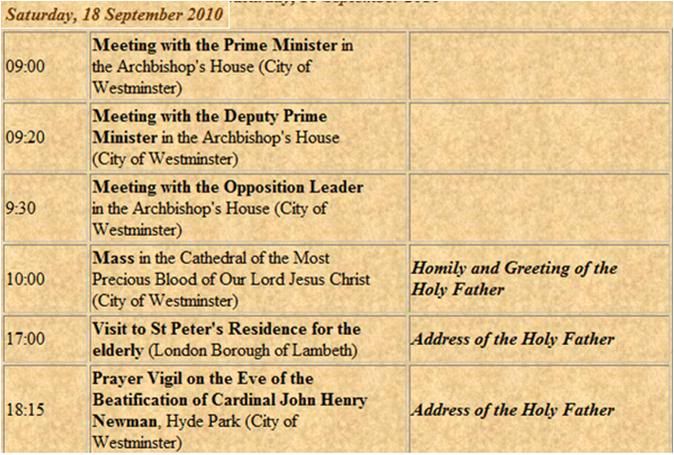
OR today.
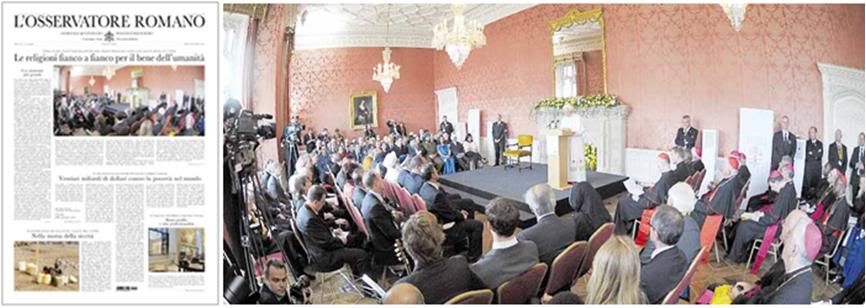
The Pope in London stresses the importance of integral education
and calls for building bridges of friendship among believers:
'Religions side by side for the good of humanity'
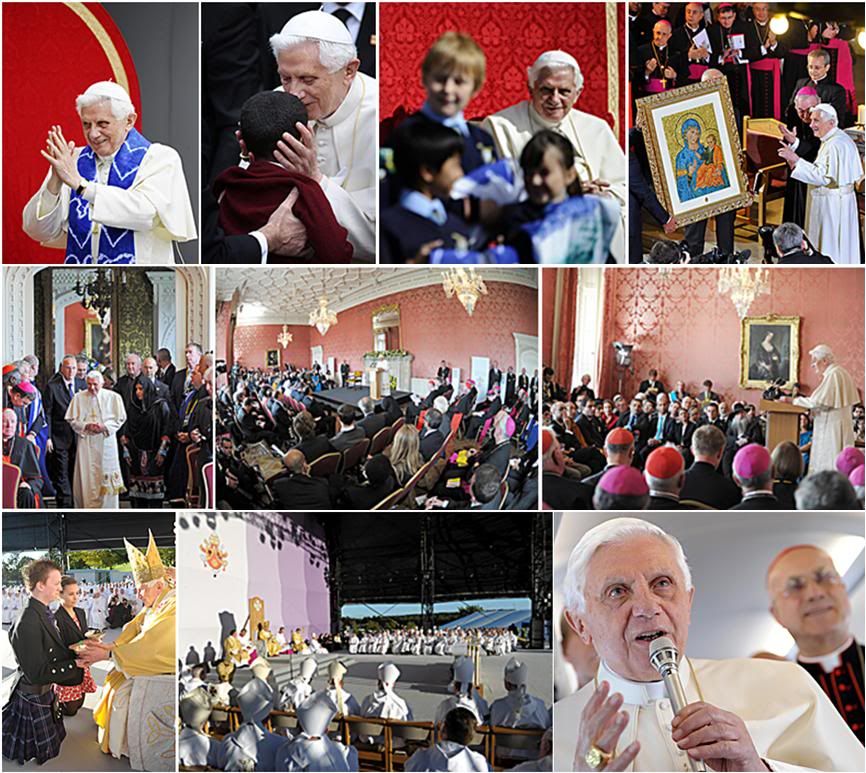 Stories on the papal visit in this issue include the Mass in Glasgow on Thursday, his meeting with Catholic schoolchildren and educators, and then with the leaders of other religion, at St. Mary's University in Twickenham; also, the full transcript of the Holy Father's Q&A with newsmen on the plane from Rome on Thursday.
Stories on the papal visit in this issue include the Mass in Glasgow on Thursday, his meeting with Catholic schoolchildren and educators, and then with the leaders of other religion, at St. Mary's University in Twickenham; also, the full transcript of the Holy Father's Q&A with newsmen on the plane from Rome on Thursday.
[Modificato da TERESA BENEDETTA 18/09/2010 13:15] |
| |
 18/09/2010 15:01 18/09/2010 15:01 |
|
| | | OFFLINE | | Post: 21.021
Post: 3.658 | Registrato il: 28/08/2005
Registrato il: 20/01/2009 | Administratore | Utente Master | |
|
 BBC has posted its wrap-up for the first part of the Pope's program on the third day today of his visit. Newsmen anticipate that some time today, before the Pope goes to visit a home for the aged this afternoon, he will be meeting with some abuse victims.
What the Holy Father said today
BBC has posted its wrap-up for the first part of the Pope's program on the third day today of his visit. Newsmen anticipate that some time today, before the Pope goes to visit a home for the aged this afternoon, he will be meeting with some abuse victims.
What the Holy Father said today
at Mass about the abuse issue:
I think of the immense suffering caused by the abuse of children, especially within the Church and by her ministers.
Above all, I express my deep sorrow to the innocent victims of these unspeakable crimes, along with my hope that the power of Christ’s grace, his sacrifice of reconciliation, will bring deep healing and peace to their lives.
I also acknowledge, with you, the shame and humiliation which all of us have suffered because of these sins; and I invite you to offer it to the Lord with trust that this chastisement will contribute to the healing of the victims, the purification of the Church and the renewal of her age-old commitment to the education and care of young people.
I express my gratitude for the efforts being made to address this problem responsibly, and I ask all of you to show your concern for the victims and solidarity with your priests.
 Pope reiterates Church message
Pope reiterates Church message
against sex offenses by priests,
renewal for the Church and
compassion for the victims

18 September 2010
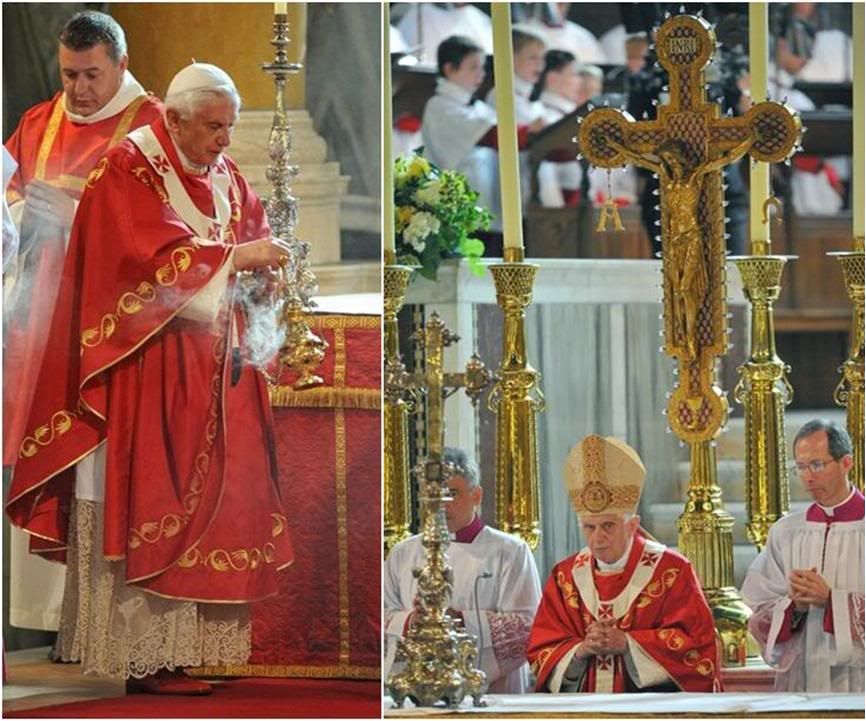
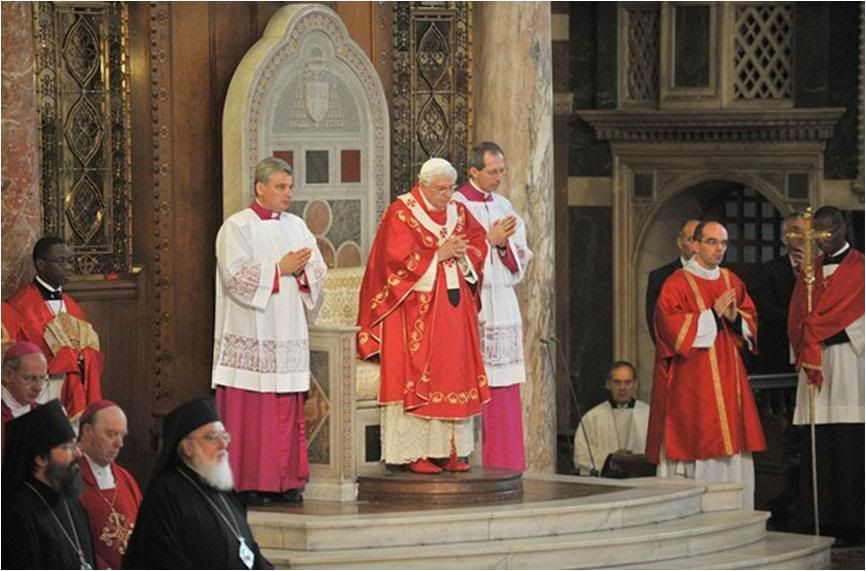
Pope Benedict XVI has expressed his "deep sorrow" for the "unspeakable crimes" of child abuse within the Catholic Church.
The strongest public apology yet over the scandal was offered during a Mass at Westminster Cathedral on the third day of his four-day state visit. [The new media line now is to describe every new statement made by the Pope on this issue as 'the strongest ever' or 'the clearest ever', when he is saying the same things hs has always said. How does what he said today differ from what he said in the Letter to Irish Catholics, for instance, except that this time, he spoke them out?]
He said he was gravely concerned by "the immense suffering" caused by the abuse, especially by Church ministers.
And he acknowledged "the shame and humiliation" caused by "these sins".
"Above all, I express my deep sorrow to the innocent victims of these unspeakable crimes, along with my hope that the power of Christ's grace, his sacrifice of reconciliation, will bring deep healing and peace to their lives," he told the congregation.
He said he hoped this "chastisement will contribute to the healing of the victims, the purification of the Church and the renewal of her age-old commitment to the education and care of young people".
"I express my gratitude for the efforts being made to address this problem responsibly, and I ask all of you to show your concern for the victims and solidarity with your priests."
Among the congregation at the Mass were former prime minister Tony Blair - who has converted to Catholicism - and his wife Cherie.
Earlier the pontiff met Prime Minister David Cameron, his deputy Nick Clegg and acting Labour leader Harriet Harman.
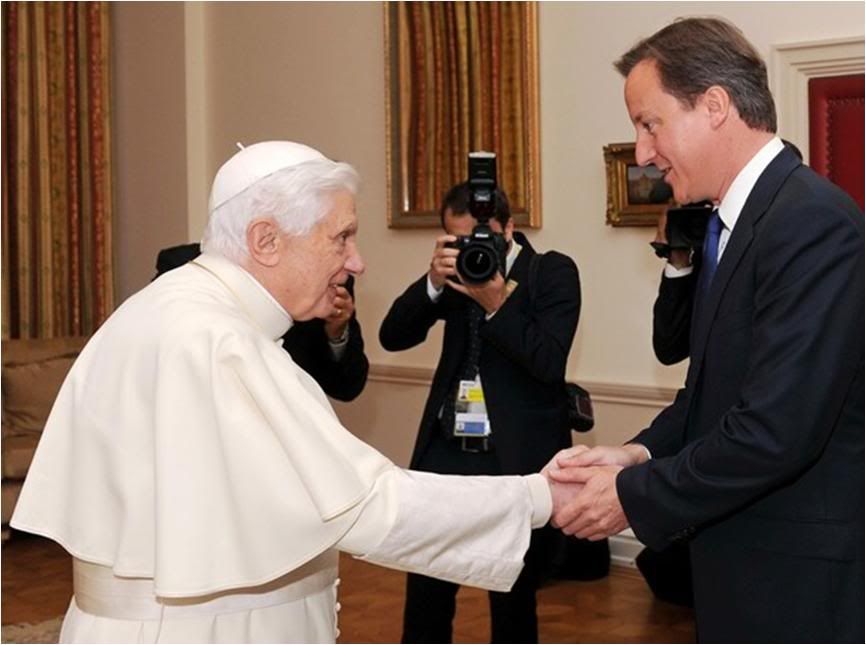
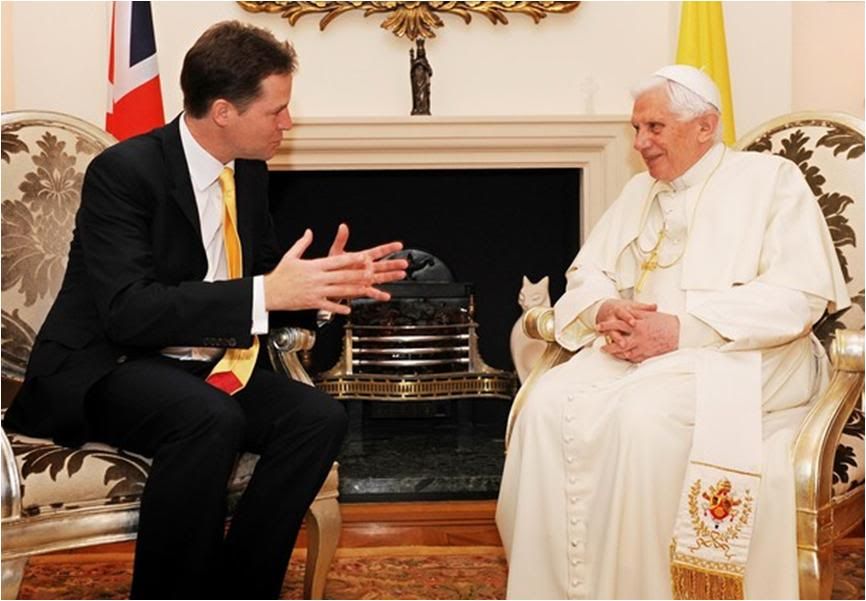
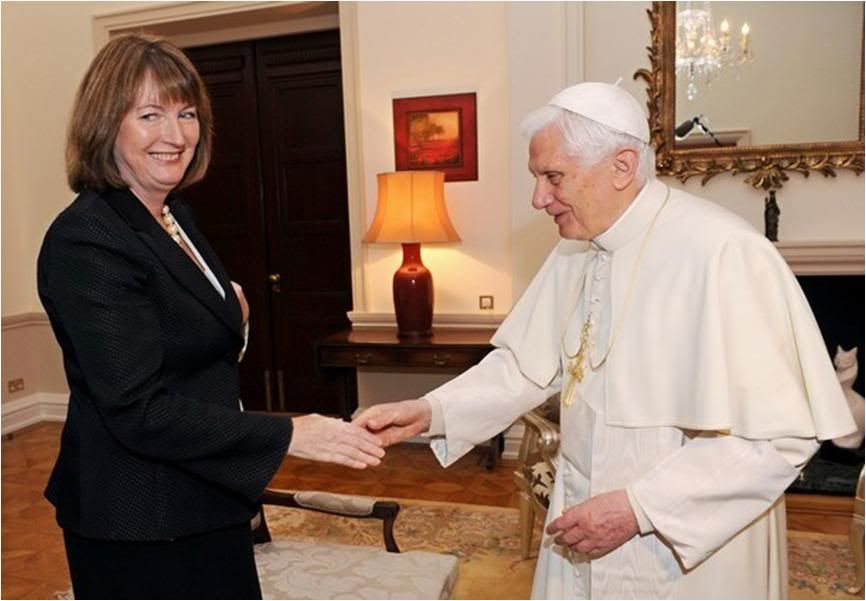
The Pope then met thousands of young Catholics gathered outside the cathedral. They included representatives from every parish in England and Wales, a contingent from Scotland, and a number of volunteers from Catholic youth organisations.
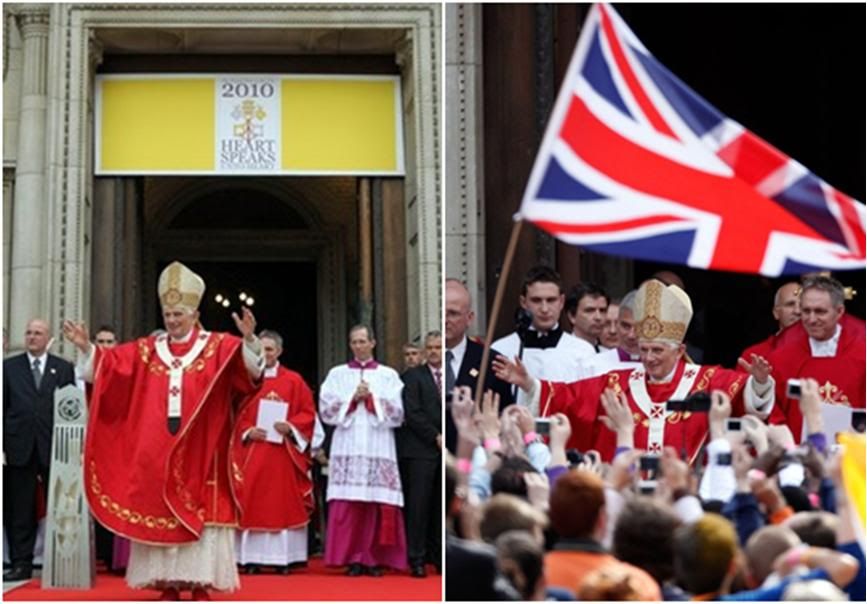
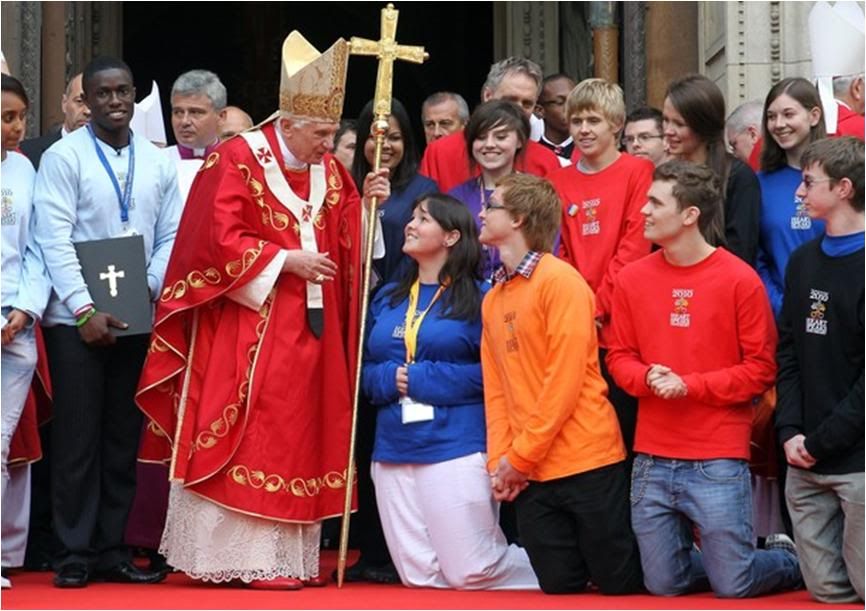
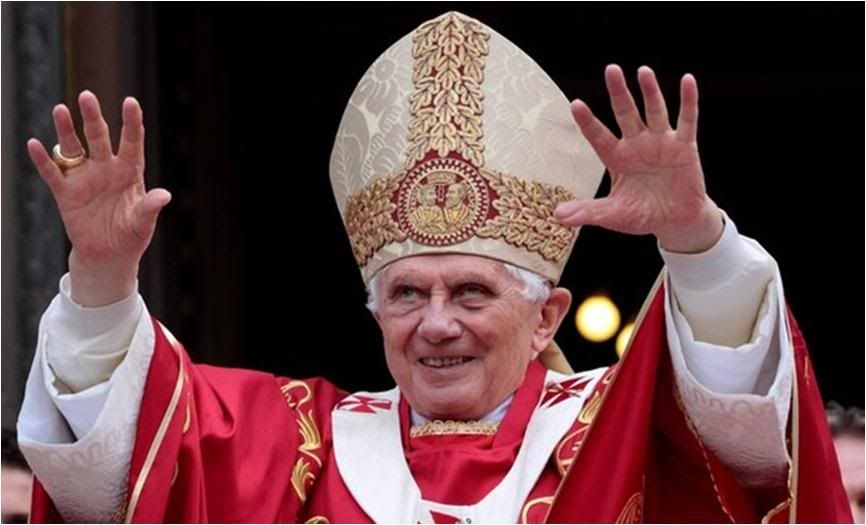
As the Pope walked out to greet them, he was met with rapturous cheers.
Paschal Uche, representing young Catholics, addressed to the Pope to a backdrop of cheers.
"Your visit brings us together. It is like a family reunion and we are very, very pleased to see you," he said.
He added that he hoped the visit would inspire "us to be saints of the third millennium" and presented the Pope with a gift on behalf of young Catholics.
The Pope then returned to Westminster Cathedral where he spoke of his "deep love" for the Welsh people and his sadness for being unable to visit.
He blessed the nation in Welsh and said he was happy to honour its people and its ancient Christian tradition.
Later in the day he will visit a home for older people in south London.
Speaking from Westminster Cathedral ahead of the Mass, Archbishop Vincent Nichols welcomed the warmth with which people have welcomed the Pope during his visit.
The day ends with a prayer vigil in Hyde Park where about 80,000 people are expected to gather to see the Pope.
But there will also be a march during the afternoon organised by campaign organisation Protest the Pope - an umbrella group opposed to the Pope's visit. They will march from Hyde Park Corner to Downing Street, where a rally will be held
The Pope's schedule is continuing as planned, despite the arrest of six men in connection with an alleged terrorist threat to his visit. The men remain in custody following their arrest on Friday.
The Metropolitan police say nothing significant was found during searches of residential and commercial properties in connection with the arrests.
All six, who were detained in London, were street cleaners working for Veolia Environment Services, a cleaning company working for Westminster Council.
I apologize the posts have been rather sketchy and/or barebones so far. My goal has been at least, to post something about each event, with maybe a representative photo or two if available, and hope I can go back from time to time to flesh out the post... My time constraints have been aggravated the past few days by some glitch that is slowing down my PC even if I am running it at safe mode. Plus, I have been unable to keep up with the flood of photos from the news agencies (which they release in random manner, not always chronologically, and often, in partial batches, and don't know if I can catch up before this visit ends!
[Modificato da TERESA BENEDETTA 18/09/2010 15:48] |
| |
 18/09/2010 15:43 18/09/2010 15:43 |
|
| | | OFFLINE | | Post: 21.022
Post: 3.659 | Registrato il: 28/08/2005
Registrato il: 20/01/2009 | Administratore | Utente Master | |
|
 What the London papers say
What the London papers say
about Day 2 of the visit

Sept. 18, 2010
The Times front page shows Pope Benedict and the Archbishop of Canterbury in a warm embrace at Westminster Abbey, but headlines the "terror plot" to harm the Pope. The subtitle, "Terror alert as Benedict makes strongest attack on secular society" is surely not right: it is "aggressive secularism" -- the attempt to drive faith from the public square -- which the Pope has attacked, not secular society.
The editorial notes that "the Pope's visit has received a breadth of public support that promises to supersede current controversies" but goes on to criticise some of his sharp language against atheism and secularism. [It's hard to argue with success, as the UK newspapers are finding out. The wonder is that they acknowledge teh success at all!]
Inside, the paper dedicates four pages to the visit, including a commentary by the paper's religious correspondent, Ruth Gledhill. "So far it has been a remarkable success," she says. "In many respects it could not have gone better."
[I still have not been able to get around the Times's paywall - which it is possible to do with, say, the Wall Street Journal.]
The Telegraph carries the same picture of the Pope and the Archbishop of Canterbury under the headline: "We will not be silenced, Pope tells secular Britain". The front-page story concentrates on the Westminster Hall speech, which is sketched inside by Andrew Gimson, followed by an edited version of the text itself.
Martin Beckford reports on the Pope's meeting at Lambeth Palace with Dr Rowan Williams, and relations with Anglicans; Heidi Blake reports on the service at Westminster Abbey, where the church leaders prayed together before the tomb of St Edward the Confessor. There is also a page on the school assembly at Twickenham.
The Telegraph gives over its whole editorial column to the visit under the headline 'The Pope puts religion back in the spotlight'.
[I posted the full editorial yesterday.]
"The British public," it says, "is listening with curiosity and genuine respect to Pope Benedict XVI", before going to to agree with the Pope's diagnosis that there are signs of a failure to appreciate the legitimate role of religion in the public square.
"Militant secularists have taken our tradition of tolerance and whittled it down to something quite different: toleration for a narrow spectrum of liberal-approved beliefs", the paper observes. "Anyone who falls outside that spectrum runs the risk of being demonised."
The editorial concludes that while it is too early to say if the visit has been a success, "one thing we can say is that in Westminster Hall religion was well and truly yanked back into [the public] square."
The Guardian's front page carries a photo of Pope Benedict at Westminster Hall as he comes over to greet former prime ministers and the deputy PM, Nick Clegg. But the news concentrates on the "terror plot".
Inside, the Westminster Hall speech is reported, concentrating on the sidelining of religion which puts Christmas at risk. Andrew Brown thinks the address puts paid to the idea of Britain as a Protestant nation. Toynbee thinks the Pope is reviving the spectacle of 'Winterval' to attack secularists. There are reports inside on Twickenham, and calls by abuse victims for "private talks". A box headed 'papal bull' pokes fun.
The editorial, headed "A turbulent priest', thinks the Pope should be more "humble" and takes a humanist view of his comments at Westminster Hall -- a sign of the threat to secularist ideology which the speech posed.
The Catholic historian Eamon Duffy in 'Face to Faith', thinks the Newman beatification "affirms Newman's lifelong struggle to combine intellectual integrity with the surrender of heart and mind to a God he experienced as both truth and love" and adds: "For a Church whose claims to integrity, love and truth are currently taking a battering, that's a candle in the dark".
Courtesy of an unlikely source - the website of the Richard Dawkins Foundation for Science and Reason - here's an article from the Times of London, that I suppose they posted because it is directly critical of Dawkins. It's the first time I have gone to the site, so I don't know if they habitually carry pieces that attack Dawkins and what he stands for - which says something good about them. The following piece is trying to exemplify the voice of 'true secularism' - but secularism nonetheless, and unabashedly liberal, as she is loath to think religious groups could fill the spaces in public life left by a shrunken state!
Dawkins’ and Hitchens’ anti-Bible bashing
doesn’t just upset the Pope:
It offends my secular tolerance
by Janice Taylor

Sept, 18, 2010
I never thought I could utter this sentence, but I agree with the Pope. Like him I feel distaste for “aggressive forms of secularism”, although maybe I’d term it differently. I’d call it macho atheism as preached by unholy warlords.
As old ladies and small children, nuns and office workers, the faithful and the merely curious turned out in Glasgow and London for a gawp at His Holiness, I considered Richard Dawkins’s remark that Catholicism is the “world’s second most evil religion” — did he do a poll? — and wondered about its contribution to our national discourse.
Likewise, when Stephen Hawking announced recently, with messianic certainty, that God could not have created the Universe, he sounded only like a spiteful child, hoping to make his baby brother cry by revealing there is no Santa Claus.
Dawkins, Hawking, Hitchens: these male (always male) demagogues, bashing their anti-Bibles on to bestseller lists, smugly uncloaking the magician to show his act is mere incense smoke and mirrors. As if the rest of us require professors of theoretical physics or evolutionary biology in order to ponder the big questions of human existence, any more than we need a priest.
At least Christopher Hitchens, a US citizen, must maintain his thunderous volume to be heard above the American Tea Party movement’s Creationist tumult. (Although I thought it inconceivable that the mighty Hitch could ever be boring until I read his book, God is Not Great, a monotone, unreadable harangue.)
But the other two are here in Britain. How are their crass insults to decent, thinking Catholics adding to a sane and necessary discussion about religion’s place in our public life?
Because true secularism is not aggressive, it is the end of aggression. It is cool, temperate, unfailingly rational. It does not name-call or demean. It does not care if you believe wine literally turns into Christ’s blood or, like South Indian Hindu pilgrims, carry a coconut full of ghee on your head. [Unless, that is, you also want to express your views in the public square. Then seculars squawk and scream bloody murder!]
In its support for the rights of all faiths, yet championship of none, it is the highest attainment of civilisation. Its demands are simple: that laws be made and enforced in a sphere clear of discrimination or zealotry. [Very rational and nice-sounding statements, but does 'support for the rights of all faiths' include support for their right to take part in the public discourse using arguments based on their faith?]
The last thing secularism should do is ratchet up the volume. The recent railings of look-at-me blowhards such as Hitchens and Dawkins are, in part, the reason why Benedict XVI arrived in Britain with his unapologetically re-evangelising message.
When the Pope asserted that secularism gave birth to German Fascism, atheists countered with a swing at the Church’s own shonky wartime record. And so debate sank below that of the sixth-form common room, with furious finger pointers calling each other Nazi. [But surely a rational secularist will not deny that the two disastrous ideologies of the 20th century were both godless, with the consequence of 1) elevating man to be the supreme arbiter of everything; and 2) living by the law of the jungle, where the strong and powerful have absolute dominion over the weak and helpless! In a godless world, 'rational secularists' will not and cannot prevail over tyrants, both rational and irrational, who will stop at nothing to have power over their fellow men! It's what know-all liberals and committed ideologues like the New Atheists - who all pride themselves on being men of reason and superior intellectuals - are trying to do now, with their active intolerance of anyone whose world-view is different from theirs.]
This is not where we should be heading, as I saw this week while visiting New York and tuning into the furore around the Ground Zero mosque. With shock jocks labelling the Cordoba Centre a jihadist cell in downtown Manhattan, and its imam predicting violent consequences if the mosque site were changed, all reason died.
That a compromise might be reached, that mindful of local sensitivities — given that it is planned within the “greater Ground Zero area” where debris fell — the mosque might retreat a little, was now inconceivable. Stalemate, intransigence, mutual loathing prevailed.
Like the majority of British people, I have little religious faith, but the peace I feel in, say, a spartan Suffolk church. connects me with my northern chapel-going ancestry. While I may not believe, the peace and quietude, the sense of something transcendent that makes my life on Earth seem at once precious and utterly insignificant, gives me sympathy towards those who do.
My devout Catholic neighbour, who worked unpaid delivering babies in an African clinic, the born-again Christians who befriended my lonely aunt, even the Jamaican ladies in church hats who bring me tracts depicting in colourful line drawings the very moment the dead will rise again — they don’t make me long to assert my moral superiority or slap them round the head with Darwin.
And I’d guess the majority of my fellow heathens, those who don’t have iconoclastic non-fiction to flog, would agree. Secularism needs to stand behind the progressive movements within the Catholic Church, already challenging its policies on women, contraception, homophobia and child abuse, not run ahead of them screaming.
It might concede that the Pope has a point that secular values have struggled in the past decade when morality was wholly defined by the free market. [COLORE=#1216FFDIM=8pt][Did the Pope say that? In any case, I do not understand the sentence!]
It needs to equip itself for a cool, clean fight as the coalition Government seeks to use its Big Society agenda to undermine hard-won secular principles, inviting religious groups to fill the space vacated by a shrunken State.
Already, five out of the first sixteen Government-approved free schools are faith-based, able to set their own curriculum, and able to teach religion without having to understand the comparative value of other faiths.
It would be ironic if Michael Gove, the Education Secretary, a hammer of Islamic extremism, was to preside over the creation of government-funded madrassas.
[Modificato da TERESA BENEDETTA 18/09/2010 16:42] |
| |
 18/09/2010 18:06 18/09/2010 18:06 |
|
| | | OFFLINE | | Post: 21.023
Post: 3.660 | Registrato il: 28/08/2005
Registrato il: 20/01/2009 | Administratore | Utente Master | |
|

 Pope Benedict XVI celebrates Mass
Pope Benedict XVI celebrates Mass
at Westminster Cathedral,
greets the youth of Britain
and the people of Wales

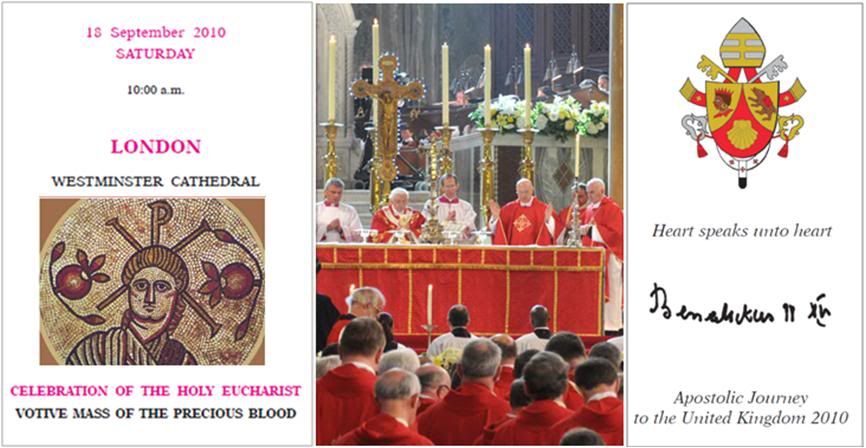
His Holiness, Pope Benedict XVI celebrated Mass at Westminster Cathedral on Saturday 18 September on the third day of his visit to the United Kingdom.
240 priests concelebrated the Mass and the congregation was made up of 1,739 people from the Catholic dioceses of England and Wales.
After celebrating Mass, the Pope spoke to a crowd of young people gathered outside the Cathedral. He then addressed the people of Wales and prayed before the Statue of Our Lady of the Taper, the Welsh National Shrine to Our Lady.
Before the Mass, Pope Benedict XVI was welcomed by Archbishop Vincent Nichols who said:
“Holy Father we offer you our love and prayers to help and sustain you in your ministry as the successor of St Peter. Your ministry is a great gift to us for the Lord asks you to strengthen and nourish us, His people. That is what you do, being a sign and servant of the unity of the whole Church. Standing in the shoes of the Fisherman is demanding. So we give you our loving loyalty and sincere devotion.”
In his Homily, Pope Benedict XVI emphasised the centrality of the Eucharistic sacrifice: “The reality of the Eucharistic sacrifice has always been at the heart of Catholic faith; called into question in the sixteenth century, it was solemnly reaffirmed at the Council of Trent against the backdrop of our justification in Christ. Here in England, as we know, there were many who staunchly defended the Mass, often at great cost, giving rise to that devotion to the Most Holy Eucharist which has been a hallmark of Catholicism in these lands.”
He also spoke of his sorrow at the suffering caused by the abuse of children:
Dear Friends in Christ,
I greet all of you with joy in the Lord and I thank you for your warm reception. I am grateful to Archbishop Nichols for his words of welcome on your behalf.
Truly, in this meeting of the Successor of Peter and the faithful of Britain, “heart speaks unto heart” as we rejoice in the love of Christ and in our common profession of the Catholic faith which comes to us from the Apostles.
I am especially happy that our meeting takes place in this Cathedral dedicated to the Most Precious Blood, which is the sign of God’s redemptive mercy poured out upon the world through the passion, death and resurrection of his Son, our Lord Jesus Christ.
In a particular way I greet the Archbishop of Canterbury, who honours us by his presence.
The visitor to this Cathedral cannot fail to be struck by the great crucifix dominating the nave, which portrays Christ’s body, crushed by suffering, overwhelmed by sorrow, the innocent victim whose death has reconciled us with the Father and given us a share in the very life of God.
The Lord’s outstretched arms seem to embrace this entire church, lifting up to the Father all the ranks of the faithful who gather around the altar of the Eucharistic sacrifice and share in its fruits. The crucified Lord stands above and before us as the source of our life and salvation, “the high priest of the good things to come”, as the author of the Letter to the Hebrews calls him in today’s first reading (Heb 9:11).
It is in the shadow, so to speak, of this striking image, that I would like to consider the word of God which has been proclaimed in our midst and reflect on the mystery of the Precious Blood. For that mystery leads us to see the unity between Christ’s sacrifice on the Cross, the Eucharistic sacrifice which he has given to his Church, and his eternal priesthood, whereby, seated at the right hand of the Father, he makes unceasing intercession for us, the members of his mystical body.
Let us begin with the sacrifice of the Cross. The outpouring of Christ’s blood is the source of the Church’s life. Saint John, as we know, sees in the water and blood which flowed from our Lord’s body the wellspring of that divine life which is bestowed by the Holy Spirit and communicated to us in the sacraments (Jn 19:34; cf. 1 Jn 1:7; 5:6-7).
The Letter to the Hebrews draws out, we might say, the liturgical implications of this mystery. Jesus, by his suffering and death, his self-oblation in the eternal Spirit, has become our high priest and “the mediator of a new covenant” (Heb 9:15).
These words echo our Lord’s own words at the Last Supper, when he instituted the Eucharist as the sacrament of his body, given up for us, and his blood, the blood of the new and everlasting covenant shed for the forgiveness of sins (cf. Mk 14:24; Mt 26:28; Lk 22:20).
Faithful to Christ’s command to “do this in memory of me” (Lk 22:19), the Church in every time and place celebrates the Eucharist until the Lord returns in glory, rejoicing in his sacramental presence and drawing upon the power of his saving sacrifice for the redemption of the world.
The reality of the Eucharistic sacrifice has always been at the heart of Catholic faith; called into question in the sixteenth century, it was solemnly reaffirmed at the Council of Trent against the backdrop of our justification in Christ.
Here in England, as we know, there were many who staunchly defended the Mass, often at great cost, giving rise to that devotion to the Most Holy Eucharist which has been a hallmark of Catholicism in these lands.
The Eucharistic sacrifice of the Body and Blood of Christ embraces in turn the mystery of our Lord’s continuing passion in the members of his Mystical Body, the Church in every age.
Here the great crucifix which towers above us serves as a reminder that Christ, our eternal high priest, daily unites our own sacrifices, our own sufferings, our own needs, hopes and aspirations, to the infinite merits of his sacrifice.
Through him, with him, and in him, we lift up our own bodies as a sacrifice holy and acceptable to God (cf. Rom 12:1). In this sense we are caught up in his eternal oblation, completing, as Saint Paul says, in our flesh what is lacking in Christ’s afflictions for the sake of his body, the Church (cf. Col 1:24).
In the life of the Church, in her trials and tribulations, Christ continues, in the stark phrase of Pascal, to be in agony until the end of the world (Pensées, 553, éd. Brunschvicg).
We see this aspect of the mystery of Christ’s precious blood represented, most eloquently, by the martyrs of every age, who drank from the cup which Christ himself drank, and whose own blood, shed in union with his sacrifice, gives new life to the Church.
It is also reflected in our brothers and sisters throughout the world who even now are suffering discrimination and persecution for their Christian faith.
Yet it is also present, often hidden in the suffering of all those individual Christians who daily unite their sacrifices to those of the Lord for the sanctification of the Church and the redemption of the world.
My thoughts go in a special way to all those who are spiritually united with this Eucharistic celebration, and in particular the sick, the elderly, the handicapped and those who suffer mentally and spiritually.
Here too I think of the immense suffering caused by the abuse of children, especially within the Church and by her ministers.
Above all, I express my deep sorrow to the innocent victims of these unspeakable crimes, along with my hope that the power of Christ’s grace, his sacrifice of reconciliation, will bring deep healing and peace to their lives.
I also acknowledge, with you, the shame and humiliation which all of us have suffered because of these sins; and I invite you to offer it to the Lord with trust that this chastisement will contribute to the healing of the victims, the purification of the Church and the renewal of her age-old commitment to the education and care of young people.
I express my gratitude for the efforts being made to address this problem responsibly, and I ask all of you to show your concern for the victims and solidarity with your priests.
Dear friends, let us return to the contemplation of the great crucifix which rises above us. Our Lord’s hands, extended on the Cross, also invite us to contemplate our participation in his eternal priesthood and thus our responsibility, as members of his body, to bring the reconciling power of his sacrifice to the world in which we live.
The Second Vatican Council spoke eloquently of the indispensable role of the laity in carrying forward the Church’s mission through their efforts to serve as a leaven of the Gospel in society and to work for the advancement of God’s Kingdom in the world (cf. Lumen Gentium, 31; Apostolicam Actuositatem, 7).
The Council’s appeal to the lay faithful to take up their baptismal sharing in Christ’s mission echoed the insights and teachings of John Henry Newman.
May the profound ideas of this great Englishman continue to inspire all Christ’s followers in this land to conform their every thought, word and action to Christ, and to work strenuously to defend those unchanging moral truths which, taken up, illuminated and confirmed by the Gospel, stand at the foundation of a truly humane, just and free society.
How much contemporary society needs this witness! How much we need, in the Church and in society, witnesses of the beauty of holiness, witnesses of the splendour of truth, witnesses of the joy and freedom born of a living relationship with Christ!
One of the greatest challenges facing us today is how to speak convincingly of the wisdom and liberating power of God’s word to a world which all too often sees the Gospel as a constriction of human freedom, instead of the truth which liberates our minds and enlightens our efforts to live wisely and well, both as individuals and as members of society.
Let us pray, then, that the Catholics of this land will become ever more conscious of their dignity as a priestly people, called to consecrate the world to God through lives of faith and holiness.
And may this increase of apostolic zeal be accompanied by an outpouring of prayer for vocations to the ordained priesthood. For the more the lay apostolate grows, the more urgently the need for priests is felt; and the more the laity’s own sense of vocation is deepened, the more what is proper to the priest stands out.
May many young men in this land find the strength to answer the Master’s call to the ministerial priesthood, devoting their lives, their energy and their talents to God, thus building up his people in unity and fidelity to the Gospel, especially through the celebration of the Eucharistic sacrifice.
Dear friends, in this Cathedral of the Most Precious Blood, I invite you once more to look to Christ, who leads us in our faith and brings it to perfection (cf. Heb 12:2).
I ask you to unite yourselves ever more fully to the Lord, sharing in his sacrifice on the Cross and offering him that “spiritual worship” (Rom 12:1) which embraces every aspect of our lives and finds expression in our efforts to contribute to the coming of his Kingdom.
I pray that, in doing so, you may join the ranks of faithful believers throughout the long Christian history of this land in building a society truly worthy of man, worthy of your nation’s highest traditions.
The Mass celebrated was the Votive Mass of the Precious Blood.
The first reading was read by Mr Neil McLaughan, the Head Master of Westminster Cathedral Choir School. The Gospel was read by Revd Andrew Gallagher, a deacon in the Diocese of Westminster. Andrew was ordained as a deacon in Westminster Cathedral in June 2010 and is currently in his final year of study at Allen Hall, the Diocese of Westminster seminary. The Bidding Prayers were read by Toyin Odunuga, a regular reader at Westminster Cathedral.
Music during the Mass included a new commission by James MacMillan, entitled Tu es Petrus, for the Pope's arrival into the Cathedral.
After Mass the Pope walked down the nave of Westminster Cathedral and to the steps on the Piazza where he greeted over 2000 young people.
These were made up of a young adult from every parish in England and Wales, young adults from Scotland, and groups of active young volunteers from CAFOD; YCW, Youth 2000, Pax Christi, Catholic Scouting, HCPT, Sion, the Salesians, Jesuit Young Adult Ministries, Just Youth, and Youth SVP.
The Pope was welcomed on behalf of the young people by Pascal Uche, aged 21, from East London and a representative from Brentwood Diocese.
A new national symbol of youth ministry [a giant candle-holder with a candle within] was presented to the Holy Father by 31 of the young adults which was then blessed by the Pope.
Here is the text of his address to them:
Mr Uche, dear young friends,
Thank you for your warm welcome!
“Heart speaks unto heart” – cor ad cor loquitur – as you know, I chose these words so dear to Cardinal Newman as the theme of my visit. In these few moments that we are together, I wish to speak to you from my own heart, and I ask you to open your hearts to what I have to say.
I ask each of you, first and foremost, to look into your own heart. Think of all the love that your heart was made to receive, and all the love it is meant to give. After all, we were made for love.
This is what the Bible means when it says that we are made in the image and likeness of God: we were made to know the God of love, the God who is Father, Son and Holy Spirit, and to find our supreme fulfilment in that divine love that knows no beginning or end.
We were made to receive love, and we have. Every day we should thank God for the love we have already known, for the love that has made us who we are, the love that has shown us what is truly important in life.
We need to thank the Lord for the love we have received from our families, our friends, our teachers, and all those people in our lives who have helped us to realize how precious we are, in their eyes and in the eyes of God.
We were also made to give love, to make love it the inspiration for all we do and the most enduring thing in our lives.
At times this seems so natural, especially when we feel the exhilaration of love, when our hearts brim over with generosity, idealism, the desire to help others, to build a better world.
But at other times we realize that it is difficult to love; our hearts can easily be hardened by selfishness, envy and pride.
Blessed Mother Teresa of Calcutta, the great Missionary of Charity, reminded us that giving love, pure and generous love, is the fruit of a daily decision.
Every day we have to choose to love, and this requires help, the help that comes from Christ, from prayer and from the wisdom found in his word, and from the grace which he bestows on us in the sacraments of his Church.
This is the message I want to share with you today. I ask you to look into your hearts each day to find the source of all true love. Jesus is always there, quietly waiting for us to be still with him and to hear his voice.
Deep within your heart, he is calling you to spend time with him in prayer. But this kind of prayer, real prayer, requires discipline; it requires making time for moments of silence every day. Often it means waiting for the Lord to speak.
Even amid the “busy-ness” and the stress of our daily lives, we need to make space for silence, because it is in silence that we find God, and in silence that we discover our true self. And in discovering our true self, we discover the particular vocation which God has given us for the building up of his Church and the redemption of our world.
Heart speaks unto heart. With these words from my heart, dear young friends, I assure you of my prayers for you, that your lives will bear abundant fruit for the growth of the civilization of love.
I ask you also to pray for me, for my ministry as the Successor of Peter, and for the needs of the Church throughout the world. Upon you, your families and your friends, I cordially invoke God’s blessings of wisdom, joy and peace.
After addressing the young people, Pope Benedict returned inside Westminster Cathedral and blessed a new mosaic of St David, the Patron Saint of Wales.
The mosaic was designed by Welsh artist Ivor Davies and depicts St David preaching on a mound of earth. The mosaic contains a stone from the spot where the ground is said to have raised St David up so that the crowds he was preaching to could hear him better.
The Pope also blessed the mosaic with water from St Nonn’s well in Wales. St Nonn was the mother of St David. It is believed that St David lived c.500-589.
The Pope then went to the side chapel of St Paul and was greeted by the Bishop of Wrexham, the Right Reverend Edwin Regan. The Pope prayed before the Statue of Our Lady of the Taper which was brought from Cardigan for this occasion.
Afterwards, he addressed the people of Wales.
Dear Bishop Regan,
Thank you for your very warm greeting on behalf of the faithful of Wales. I am happy to have this opportunity to honour the nation and its ancient Christian traditions by blessing a mosaic of Saint David, the patron saint of the Welsh people, and by lighting the candle of the statue of Our Lady of Cardigan.
Saint David was one of the great saints of the sixth century, that golden age of saints and missionaries in these isles, and he was thus a founder of the Christian culture which lies at the root of modern Europe.
David’s preaching was simple yet profound: his dying words to his monks were, “Be joyful, keep the faith, and do the little things”. It is the little things that reveal our love for the one who loved us first (cf. 1 Jn 4:19) and that bind people into a community of faith, love and service.
May Saint David’s message, in all its simplicity and richness, continue to resound in Wales today, drawing the hearts of its people to renewed love for Christ and his Church.
Through the ages the Welsh people have been distinguished for their devotion to the Mother of God; this is evidenced by the innumerable places in Wales called “Llanfair” – Mary’s Church.
As I prepare to light the candle held by Our Lady, I pray that she will continue to intercede with her Son for all the men and women of Wales. May the light of Christ continue to guide their steps and shape the life and culture of the nation.
Sadly, it was not possible for me to come to Wales during this visit. But I trust that this beautiful statue, which now returns to the National Shrine of Our Lady in Cardigan, will be a lasting reminder of the Pope’s deep love for the Welsh people, and of his constant closeness, both in prayer and in the communion of the Church.
Bendith Duw ar bobol Cymru! God bless the people of Wales!
Young Catholics give Pope
a rock star welcome

Sat Sep 18 2010
LONDON - Pope Benedict XVI was treated to a rock star welcome as he greeted young Catholics earlier.
The piazza outside Westminster Cathedral was packed with up to 2,500 youngsters from dioceses in England, Wales and Scotland.
They cheered and whistled enthusiastically as the Pope appeared on the steps after giving Mass.
There was a sea of cameras and mobile phones directed towards the Pontiff, with some people climbing lampposts or sitting on shoulders to get a better view.
Flags were waved and one banner read: "We love our German shepherd."
The Pope was greeted by Paschal Uche, 21, a student at Nottingham University, who told him: "For many of us before today you were a face on television or a picture in a church.
"But today we behold you face to face, and on behalf of the Catholic youth of this great nation I would like to express my profound and heartfelt gratitude for your visit."
The Pope was cheered as he said: "Thank you for your warm welcome."
He urged followers to "look into your hearts each day to find the source of all true love".
After the speech, a chant went up of: "We are the faithful!"
[Modificato da TERESA BENEDETTA 18/09/2010 20:31] |
| |
 18/09/2010 18:29 18/09/2010 18:29 |
|
| | | OFFLINE | | Post: 21.024
Post: 3.661 | Registrato il: 28/08/2005
Registrato il: 20/01/2009 | Administratore | Utente Master | |
|
 At 14:35 p.m., London time, the BBC confirmed that the Holy Father had met with some abuse victims. Here is the story from the Daily Telegraph:
At 14:35 p.m., London time, the BBC confirmed that the Holy Father had met with some abuse victims. Here is the story from the Daily Telegraph:
 Pope meets 5 British victims
Pope meets 5 British victims
of Church child abuse
By Harriet Alexander and Alastair Jamieson

Pope Benedict XVI met five survivors of clerical sex abuse for up to 40 minutes in London today, the Catholic Church has confirmed.
The private meeting in London is the fifth time the Pope has met survivors of clerical sex abuse.
Three of the unnamed victims were from the Yorkshire area, one from London and one from Scotland, the Church said.
Bill Kilgallon, chairman of the National Catholic Safeguarding Commission, (NCSC) told the BBC: ''They were understandably quite emotional at the prospect of meeting the Pope but looking forward to the opportunity to tell him about their experiences.''
The meeting, at the home of the Vatican's Ambassador to the UK in Wimbledon, southwest London, came after the Pope apologised for the "unspeakable crimes" committed by Catholic priests who sexually abused children.
In the most strongly-worded public apology of his state visit so far, the Pontiff spoke of the "shame and humiliation" brought by the scandal.
He told the congregation at London's Westminster Cathedral: "I think of the immense suffering caused by the abuse of children, especially within the Church and by her ministers.
"Above all, I express my deep sorrow to the innocent victims of these unspeakable crimes, along with my hope that the power of Christ's grace, his sacrifice of reconciliation, will bring deep healing and peace to their lives.
"I also acknowledge with you the shame and humiliation which all of us have suffered because of these sins."
The apology comes after he acknowledged this week that the Catholic Church had failed to deal with abusive priests decisively or quickly enough.
The private meeting is the fifth time the Pope has met survivors of clerical sex abuse. One of the victims is understood to have suffered the abuse in an Irish institution.
The Pope has met victims of clerical abuse in the US, Australia, Rome and in Malta earlier this year where he was reportedly reduced to tears.
Here is the press statement from the Vatican about the meeting:
On Saturday 18 September 2010, in the Apostolic Nunciature in London, the Holy Father met a group of persons who had been sexually abused by members of the clergy.
He was moved by what they had to say and expressed his deep sorrow and shame over what victims and their families had suffered. He prayed with them and assured them that the Catholic Church is continuing to implement effective measures designed to safeguard young people, and that it is doing all in its power to investigate allegations, to collaborate with civil authorities and to bring to justice clergy and religious accused of these egregious crimes.
As he has done on other occasions, he prayed that all the victims of abuse might experience healing and reconciliation, and be able to overcome their past and present distress with serenity and hope for the future.
Following this meeting, the Holy Father will address a group of professionals and volunteers dedicated to the safeguarding of children and young people in church environments.
[I wonder if the Irish bishops tried at all to organize bringing a group of Irish victims to see the Pope in London. It would have been an obvious initiative to take, since the Holy Father will not be travelling to Ireland until 2012, as it is expected, for the International Eucharistic Congress in Dublin.]
Pope meets with victims,
tells UK he's sorry
by Nicole Winfield

LONDON, Sept. 18 (AP) - Pope Benedict XVI has met with victims of priestly sexual abuse and prayed with them even as abuse survivors and thousands of people opposed to his visit marched in central London in the biggest protest of his five-year papacy.
Bill Kilgallon, chairman of the National Catholic Safeguarding Commission — a church group that organized the encounter — said five people met with the Pontiff for about 30 or 40 minutes Saturday.
Vatican spokesman Rev. Federico Lombardi said the Pontiff was "moved by what they had to say and expressed his deep sorrow and shame."
During a Mass in Westminster Cathedral, Benedict said he hoped the Church's humiliation would help victims heal and help the Church purify itself and renew its commitment to educating the young.
THIS IS A BREAKING NEWS UPDATE. AP's earlier story is below.
LONDON. Sept. 18 (AP) — Pope Benedict XVI said Saturday he was ashamed of the "unspeakable" sexual abuse of children by priests, issuing an apology to the British faithful even as thousands of people opposed to his visit marched in central London in the biggest protest of his five-year papacy.
During a Mass in Westminster Cathedral, Benedict said he hoped the church's humiliation would help victims heal and help the church purify itself of the sins of its ministers and renew its commitment to educating the young.
His comments, which were in line with his previous statements on the topic, were directed at Britain's Catholic community in the seat of the English church, a sign that Benedict wanted to speak to the faithful about the humiliation they all felt as Catholics.
Hours later, abuse victims and demonstrators opposed to the pope's stance against homosexuality, abortion and using condoms to fight AIDS marched from Hyde Park to Downing Street to protest the Pope's four-day state visit.
They carried banners reading: "The pope is wrong — put a condom on" and "Pope protects pedophile priests."
Organizers said they expected 10,000 people, and thousands were seen marching through London. Police declined to give a crowd estimate. Even a crowd of a few thousand would make it the largest protest against Benedict since his election in 2005.
Benedict was miles away at the Vatican's apostolic nunciature in Wimbledon, having lunch and resting. There were increasing indications, though, that he would meet with British abuse victims before the day's end.
And here comes AP's one-size-fits-all obligatory slug to any news sotry about Benedict XVI:
The sex abuse scandal has clouded Benedict's state visit to this deeply secular nation with a centuries-old history of anti-Catholic sentiment. Polls have indicated widespread dissatisfaction in Britain with the way Benedict has handled the crisis, with Catholics nearly as critical of him as the rest of the population.
Anger over the scandal runs high in Britain in part because of the enormous scale of the abuse in neighboring Ireland, where government reports have detailed systematic abuse of children at church-run schools and cover-up by church.
"I express my deep sorrow to the innocent victims of these unspeakable crimes, along with my hope that the power of Christ's grace, his sacrifice of reconciliation, will bring deep healing and peace to their lives," Benedict said.
He acknowledged the shame and humiliation all the faithful had suffered as a result of the scandal and said he hoped "this chastisement will contribute to the healing of the victims, the purification of the church and the renewal of her age-old commitment to the education and care of young people."
He asked the faithful to show concern for victims and solidarity with priests.
Among those in the cathedral were former British Prime Minister Tony Blair, a recent convert to Catholicism, and his wife, Cherie.
Martin Brown, 34, who was in the crowd outside the cathedral, termed it "a good apology."
"He seemed to really mean it; he was genuinely sorry," Brown said. "It's good he mentioned it and it's good he didn't dwell on it for too long. He got it just about right."
Chris Daly, a spokesman for Scottish abuse victims, said the Pope's words helped but that victims want to see action: an acknowledgment from church authorities of their failures and cover-up, and material support to help victims.
"There has to be an element of accountability here, and truth is a big issue here where the church has been complicit in a cover-up of the abuse," he said. "They haven't been open. They haven't been truthful. It's hardly Christlike to be complicit."
In Scotland, more than 500 people claiming to be victims of abuse had been represented in a court case but were blocked by a time limit on bringing an action.
On his way to Britain, Benedict acknowledged to reporters that the church had failed to act quickly or decisively enough to stop the abuse and prevent it from recurring.
Victims groups have dismissed such comments as hollow, saying they want the church to turn over information about suspected pedophiles in its ranks and take action, not words, to make children safer.
"We don't need a pope who is sad about crimes. We need a pope who will prevent crimes," Peter Isely of the Survivors Network of those Abused by Priests, said in a statement after the pontiff's comments Saturday. "And his words prevent nothing."
Benedict went ahead with a busy day Saturday, his third in Britain, as six men arrested in an alleged terror attempt against him remained in police custody. Police staged a pre-dawn raid Friday on a garbage depot and arrested five street cleaners; a sixth person was arrested later in the day.
Police say they were detained under the Terrorism Act "on suspicion of the commission, preparation or instigation of acts of terrorism."
The Vatican has said the Pope was informed of the arrests, was calm, and no changes to his itinerary were planned.
Vatican spokesman the Rev. Federico Lombardi seemed to downplay the seriousness of the threat Saturday, telling reporters that the Pope's entourage was given the impression that the alleged plot was not a "major concern."
Benedict began his day by meeting with British Prime Minister David Cameron, Deputy Prime Minister Nick Clegg and opposition leader Harriet Harman. The Pope offered his condolences to Cameron following the death of his father, Lombardi said. All three gave the Pope gifts, including drawings given by Clegg's children.
After Mass, he issued a special greeting to young believers [What's wrong with saying 'young Catholics'?] and the Welsh faithful — singled out because he won't be traveling to Wales during this visit, only England and Scotland.
He was scheduled to visit a home for the elderly before celebrating an evening prayer service in Hyde Park in preparation for Sunday's beatification of Cardinal John Henry Newman, a 19th century convert from Anglicanism whom the pope wants to hold up as a model for the faithful.
On Friday, Benedict addressed Britain's political, financial and cultural elite in Westminster Hall, for centuries the seat of British political life. He demanded that religion have a voice in public policy and Christians in public roles be allowed to follow their consciences, lamenting that some even want to discourage Christmas celebrations.
Meanwhile, the anti-Benedict elements managed to bring together a crowd much larger than the 2,000 expected by the police.... But then, the Hyde Park prayer vigil with the Pope will be starting soon, where the numbers will surely be much greater, but the MSM may still tout the protest march over the prayer vigil, as the Guardian predictably does, already...
Protest the Pope: 10,000 march
through London's streets
Crowd carries messages condemning papal stance on condoms, homosexuality, women's rights and child abuse scandal

Saturday 18 September 2010
Day three of Pope Benedict XVI's visit to Britain and it was a day for protests and anti-papists under bright blue skies in central London. Around 10,000 people took to the capital's streets for a Protest the Pope rally and march against what the organisers called "papal intolerance" and to condemn the state funding of the visit.
They came in red cardboard papal hats scrawled with the words "bigot" and "homophobe" and carrying placards, rainbow flags, pledges of atheism and balloons made of condoms. One giant banner showing the Pope carrying a swastika was later taken down after offending many of the protesters, who went as far as complaining to the police officers lining the route of the march to Downing Street.
Although a good-natured crowd, the force of feeling against the presence of Pope Benedict in the UK was clear in the messages condemning his stance on homosexuality, the use of condoms, segregated schools, women's rights and, most of all, the child abuse scandal for which so many hold the pontiff personally responsible for both accelerating it and then covering it up.
"He is a symbol of all that is wrong with this terrible church, but he is more than that, he is also steeped in guilt at the cover-up," said Paul Stevens, a 35-year-old lawyer on the march with friends in exuberant "leftover gay pride suits".
The first speaker to the rally was Sue Cox, 63, who was abused by a priest as a young girl and who told the crowd: "All I have ever experienced from the Catholic church is fear, disgust, lies and shame."
She concluded her speech by warning the Vatican that they would no longer be able to get away with overlooking clerical sex abuse. "We will continue to watch and shout out and work towards change. This is not over," she said.
The protest organiser Peter Tatchell told the Observer the event was held both to send a message to the Pope that child abusers had to be brought to account and to call on the British government not to tolerate the Pope's "harsh, intolerant views on women's rights, on gay equality and on the use of condoms which is so vital to stopping the spread of the HIV virus". [Doesn't the Guardian and its ilk realize that Tatchell has conned them all into promoting him relentlessly more than his causes??? They've given this person tons of free publicity and Page 1 headlines for several months running now - just so they have a mouthpiece to say all the unspeakable things they themselves would like to say about the Church and the Pope!]
If the Pope's key message during his visit has been to warn against atheism and secularism, then this rally was the chance of those with those views to present their view of Benedict. "An enemy of humanity" was the unminced words of prominent atheist Richard Dawkins, who gave a strong speech to the rally on its arrival at Downing Street.
Comedian Al Murray also figured among the crowd. He said: "Like a lot of people I am a perplexed that it is a state visit. The pope's opposition to condoms kills people. It is all very well him lecturing us on morals, but he should look at his own organisation's view."
Asked how his alter ego, the Pub Landlord, would react to the visit, Murray replied: "He doesn't like it either, but that is because he is a fan of Henry VIII, because of his marriage arrangements."
[Modificato da TERESA BENEDETTA 18/09/2010 18:58] |
| |
 18/09/2010 19:30 18/09/2010 19:30 |
|
| | | OFFLINE | | Post: 21.025
Post: 3.662 | Registrato il: 28/08/2005
Registrato il: 20/01/2009 | Administratore | Utente Master | |
|
ARE YOU WATCHING THE CROWDS ALONG THE ROUTE TO HYDE PARK????
THANK YOU, LONDON!!!!
The 24/7 livecam service on the official papal visit site is really the greatest innovation to papal visit coverage! It's the first time I recall ever seeing full coveage of a papal motorcade, which even the newsphoto agencies generally don't bother to cover. I always wondered what that 20-kilometer-long motorcade in Cameroon, from Yaounde airport to the cit,y was really like, since the newsphotos that were taken - and eyewitness accounts by people like Andrea Tornielli then, were already impressive enough!...
[Modificato da TERESA BENEDETTA 18/09/2010 20:46] |
| |
 19/09/2010 00:45 19/09/2010 00:45 |
|
| | | OFFLINE | | Post: 21.026
Post: 3.663 | Registrato il: 28/08/2005
Registrato il: 20/01/2009 | Administratore | Utente Master | |
|

 Pope meets elderly wards of
Pope meets elderly wards of
St Peter’s Residence in Vauxhall
By Huw Twiston Davies

Saturday, 18 September 2010
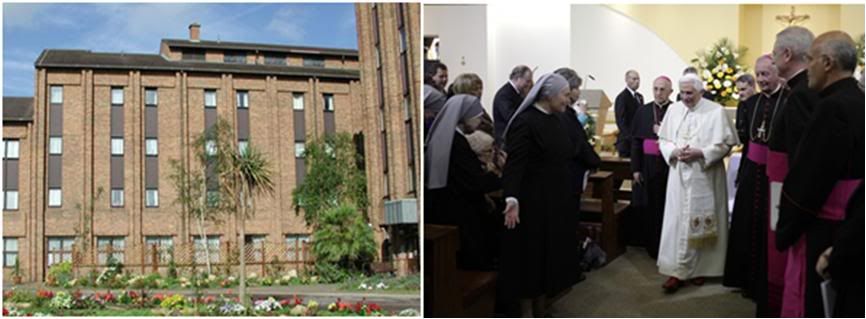
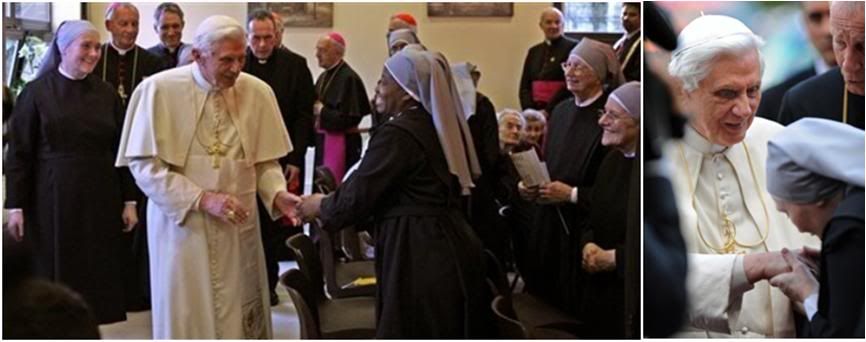
Meeting with elderly residents of St Peter’s Residence in Vauxhall, London on Saturday afternoon, Pope Benedict XVI emphasised the “unique gift” of life, “from conception to natural death”.
Arriving from meetings with victims of sexual abuse by priests just after five, roughly thirty minutes later than he was originally scheduled to arrive, the Holy Father was greeted by Archbishop Peter Smith of Southwark, and welcomed by Sr Marie Claire of the Little Sisters of the Poor.
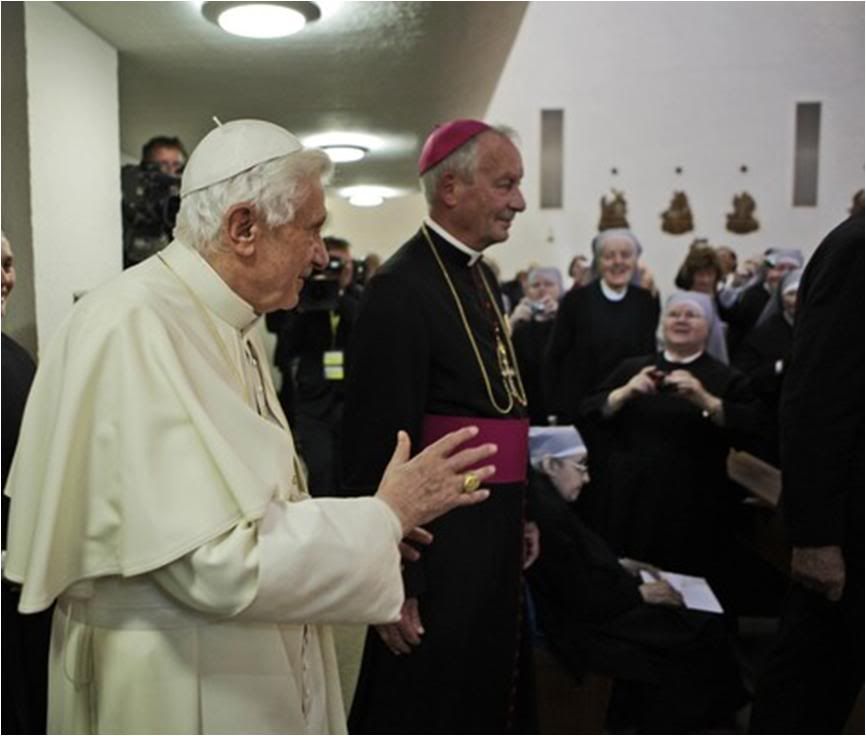
The Pope then went and visited some residents individually, who were too sick to leave the rooms, and also accepted a donation from 10 Catholic residential homes for overseas missionary work.

In her greeting to the Pope, Sr Marie Claire spoke of St Jeanne Jugan, the 18th-century Frnech nun who founded the Little Sisters of the Poor and who was canonised last year by Benedict XVI.
TIn his address to the residents, the Holy Father emphasised his community with them, saying he came to them “not only as a father, but also as a brother who knows well the joys and the struggles that come with age.”
The Pope also encouraged the older people not to fear the difficulties of increasing old age, saying that while people “may enjoy good health in old age; but equally Christians should not be afraid to share in the suffering of Christ, if God wills that we struggle with infirmity”, also recalling the illness of Pope John Paul II in the last years of his papacy.
“His cheerfulness and forebearance as he faced his final days were a remarkable and moving example to all of us who have to carry the burden of advancing years.”, Pope Benedict said, in reference to his predecessor.
The Holy Father then individually blessed and spoke to each of the residents of St Peter’s before he left
Later, he addressed their caregivers along with their colleagues who work as 'child safeguarders', professionals and volunteers who help safeguard children in Catholic intitutions.
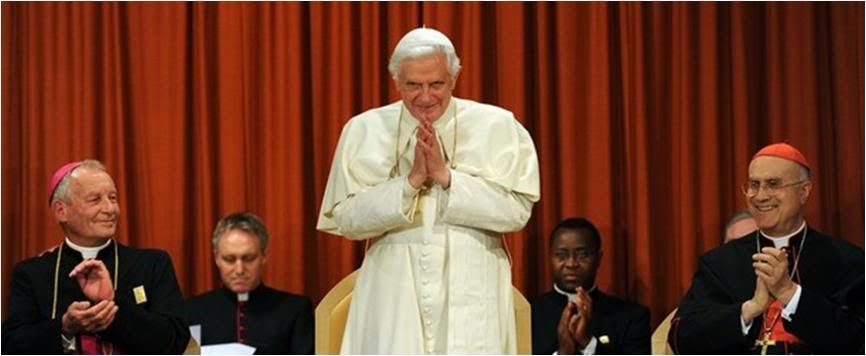
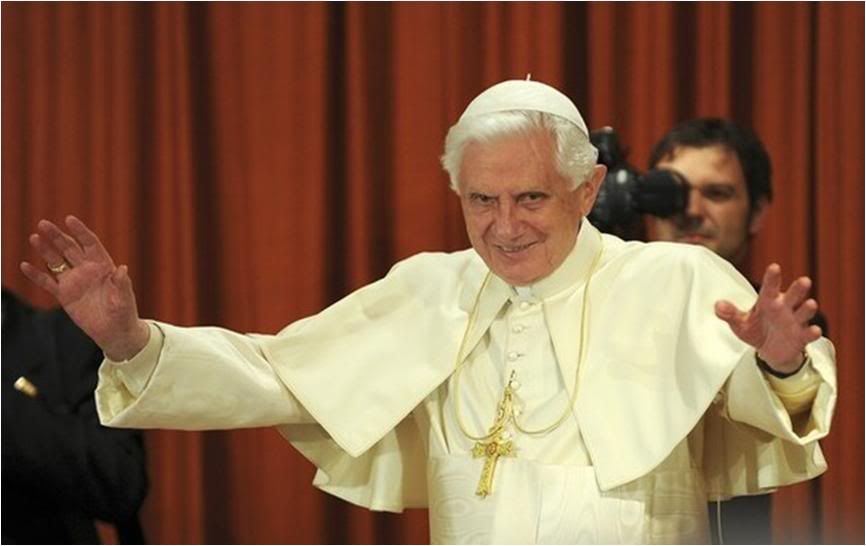
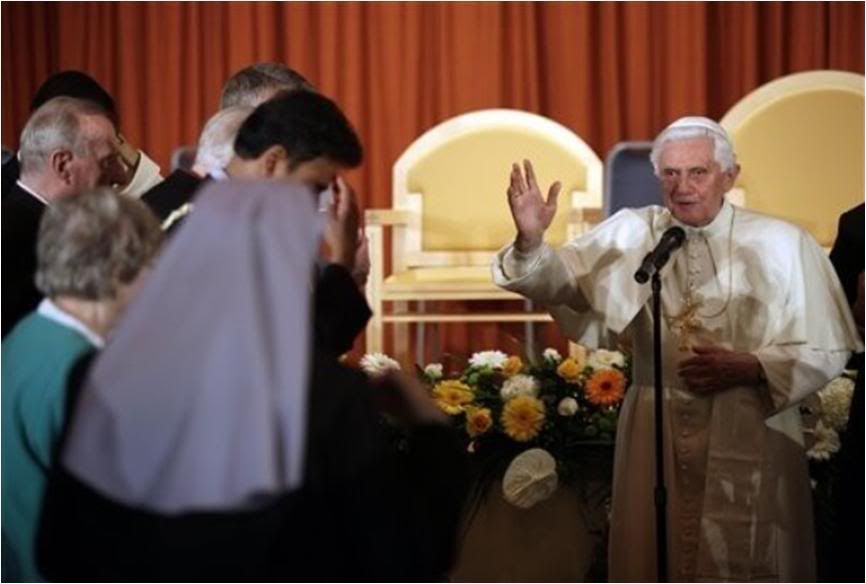
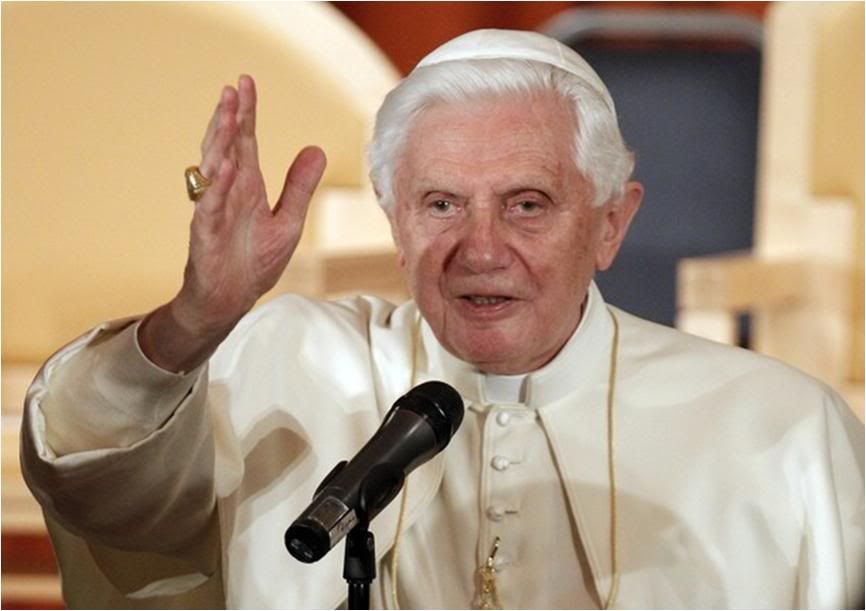
Here are the texts of his remarks:
Address to the Residents
My dear Brothers and Sisters,
I am very pleased to be among you, the residents of Saint Peter’s, and to thank Sister Marie Claire and Mrs Fasky for their kind words of welcome on your behalf.
I am also pleased to greet Archbishop Smith of Southwark, as well as the Little Sisters of the Poor and the personnel and volunteers who look after you.
As advances in medicine and other factors lead to increased longevity, it is important to recognize the presence of growing numbers of older people as a blessing for society. Every generation can learn from the experience and wisdom of the generation that preceded it. Indeed the provision of care for the elderly should be considered not so much an act of generosity as the repayment of a debt of gratitude.
For her part, the Church has always had great respect for the elderly. The Fourth Commandment, “Honour your father and your mother as the Lord your God commanded you” (Deut 5:16), is linked to the promise, “that your days may be prolonged, and that it may go well with you, in the land which the Lord your God gives you” (Deut 5:16).
This work of the Church for the aging and infirm not only provides love and care for them, but is also rewarded by God with the blessings he promises on the land where this commandment is observed.
God wills a proper respect for the dignity and worth, the health and well-being of the elderly and, through her charitable institutions in Britain and beyond, the Church seeks to fulfil the Lord’s command to respect life, regardless of age or circumstances.
At the very start of my pontificate I said, “Each of us is willed, each of us is loved, each of us is necessary” (Homily at the Mass for the Beginning of the Petrine Ministry of the Bishop of Rome, 24 April 2005).
Life is a unique gift, at every stage from conception until natural death, and it is God’s alone to give and to take. One may enjoy good health in old age; but equally Christians should not be afraid to share in the suffering of Christ, if God wills that we struggle with infirmity.
My predecessor, the late Pope John Paul, suffered very publicly during the last years of his life. It was clear to all of us that he did so in union with the sufferings of our Saviour. His cheerfulness and forbearance as he faced his final days were a remarkable and moving example to all of us who have to carry the burden of advancing years.
In this sense, I come among you not only as a father, but also as a brother who knows well the joys and the struggles that come with age. Our long years of life afford us the opportunity to appreciate both the beauty of God’s greatest gift to us, the gift of life, as well as the fragility of the human spirit.
Those of us who live many years are given a marvellous chance to deepen our awareness of the mystery of Christ, who humbled himself to share in our humanity. As the normal span of our lives increases, our physical capacities are often diminished; and yet these times may well be among the most spiritually fruitful years of our lives.
These years are an opportunity to remember in affectionate prayer all those whom we have cherished in this life, and to place all that we have personally been and done before the mercy and tenderness of God. This will surely be a great spiritual comfort and enable us to discover anew his love and goodness all the days of our life.
With these sentiments, dear brothers and sisters, I am pleased to assure you of my prayers for you all, and I ask for your prayers for me.
May our blessed Lady and her spouse Saint Joseph intercede for our happiness in this life and obtain for us the blessing of a serene passage to the next.
May God bless you all!
Address to child safeguarders
Dear Friends,
I am glad to have the opportunity to greet you, who represent the many professionals and volunteers responsible for child protection in church environments.
The Church has a long tradition of caring for children from their earliest years through to adulthood, following the affectionate example of Christ, who blessed the children brought to him, and who taught his disciples that to such as these the Kingdom of Heaven belongs (cf. Mk 10:13-16).
Your work, carried out within the framework of the recommendations made in the first instance by the Nolan Report and subsequently by the Cumberlege Commission, has made a vital contribution to the promotion of safe environments for young people.
It helps to ensure that the preventative measures put in place are effective, that they are maintained with vigilance, and that any allegations of abuse are dealt with swiftly and justly.
On behalf of the many children you serve and their parents, let me thank you for the good work that you have done and continue to do in this field.
It is deplorable that, in such marked contrast to the Church’s long tradition of care for them, children have suffered abuse and mistreatment at the hands of some priests and religious. We have all become much more aware of the need to safeguard children, and you are an important part of the Church’s broad-ranging response to the problem.
While there are never grounds for complacency, credit should be given where it is due: the efforts of the Church in this country and elsewhere, especially in the last ten years, to guarantee the safety of children and young people and to show them every respect as they grow to maturity, should be acknowledged.
I pray that your generous service will help to reinforce an atmosphere of trust and renewed commitment to the welfare of children, who are such a precious gift from God.
May God prosper your work, and may he pour out his blessings upon all of you.
[I am surprised I have not seen a report on the Pope's address to the child safeguarders because it ties in with what he ha been saying about the child abuse issue and what concrete things the Church has been doing about it.]
Then, leaving the residence, the Holy Father generated another story as he decided to do an unscehduled brief walkabout to greet people who had gathered outside the residence.
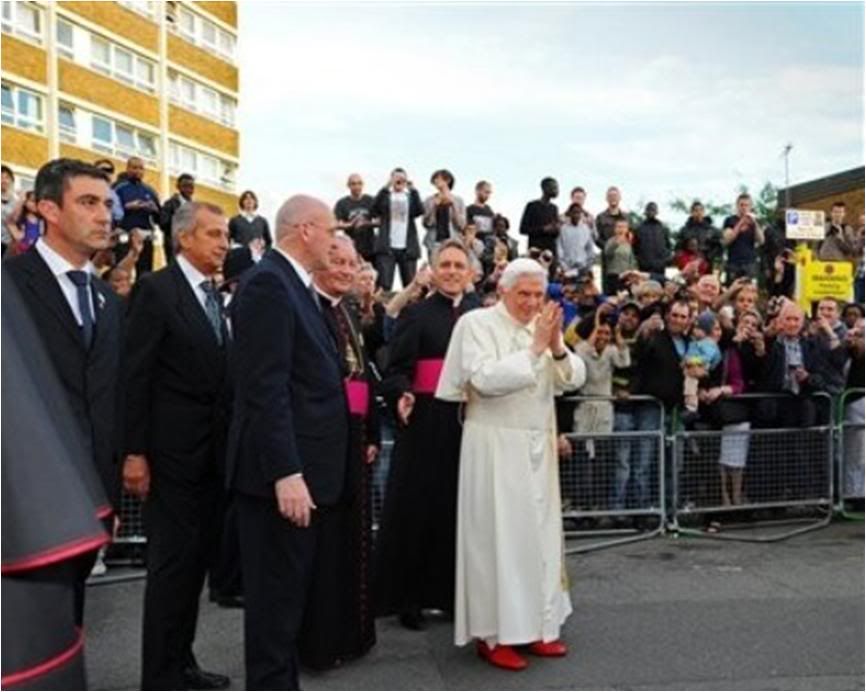
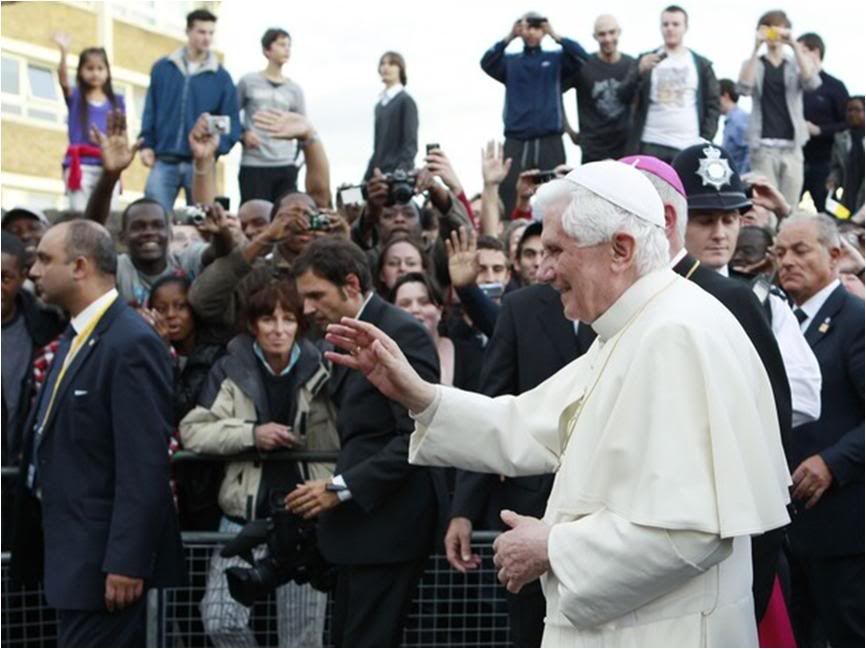
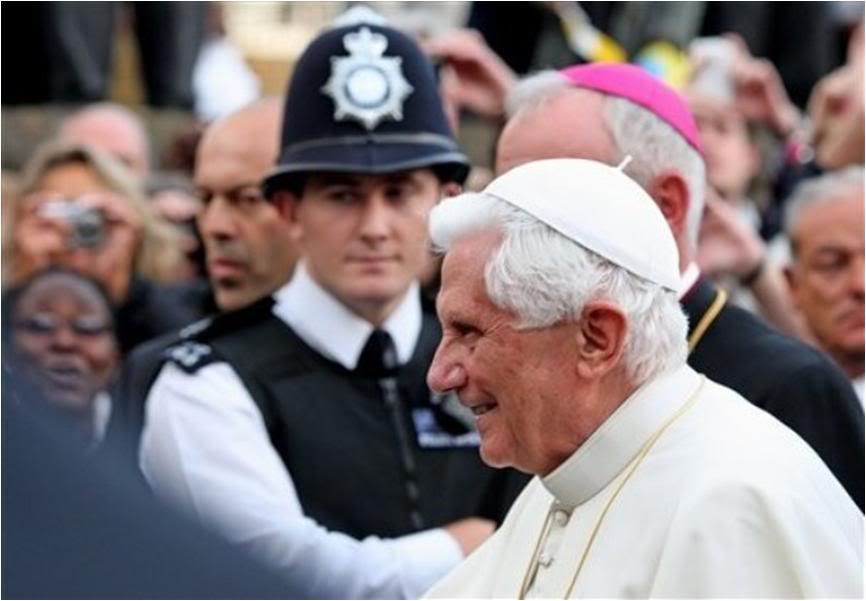
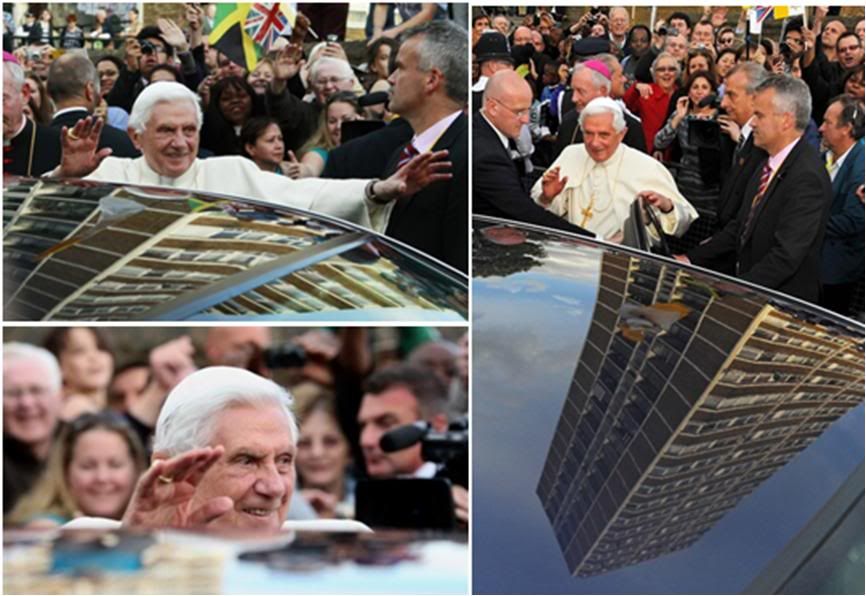
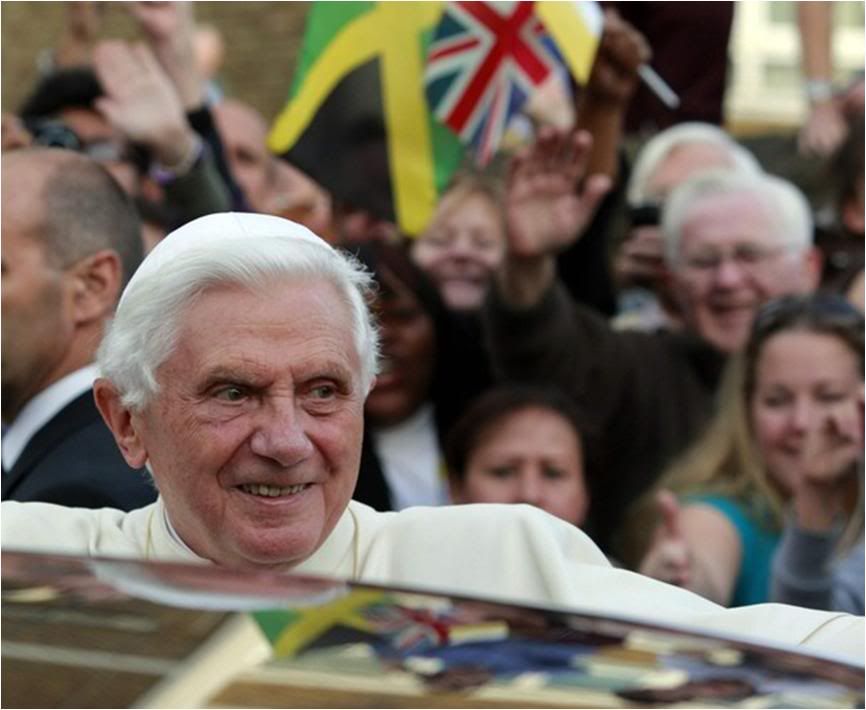
[Modificato da TERESA BENEDETTA 19/09/2010 02:04] |
| |
 19/09/2010 00:56 19/09/2010 00:56 |
|
| | | OFFLINE | | Post: 21.027
Post: 3.664 | Registrato il: 28/08/2005
Registrato il: 20/01/2009 | Administratore | Utente Master | |
|

I am reserving this space for photos and stories on the Pope's motorcade from the Horse Guards to Hyde Park....
|
| |
 19/09/2010 01:26 19/09/2010 01:26 |
|
| | | OFFLINE | | Post: 21.028
Post: 3.665 | Registrato il: 28/08/2005
Registrato il: 20/01/2009 | Administratore | Utente Master | |
|

 Hours after a prayer vigil that was most moving, and at which there were at least 80,000 in attendance, I cannot find a separate story on it in MSM which, on the other hand, has multiple accounts of the protest march by at most 10,000. Perhaps they will report it later, but for now, it is just tucked in as an incidental in the Day-3 accounts of AP and AFP, neither of which even mentioned the Pope's motorcade along the Mall and Constitution Hill towards Hyde Park, along a route that was lined up to 10 deep on both sides that probably matched the 125,000 who lined Edinburgh's Royal Mile the other day. Even the CNA story below was obviously written before the part of the prayer vigil in which the Pope took part.
80,000 enthusiastic Catholics
Hours after a prayer vigil that was most moving, and at which there were at least 80,000 in attendance, I cannot find a separate story on it in MSM which, on the other hand, has multiple accounts of the protest march by at most 10,000. Perhaps they will report it later, but for now, it is just tucked in as an incidental in the Day-3 accounts of AP and AFP, neither of which even mentioned the Pope's motorcade along the Mall and Constitution Hill towards Hyde Park, along a route that was lined up to 10 deep on both sides that probably matched the 125,000 who lined Edinburgh's Royal Mile the other day. Even the CNA story below was obviously written before the part of the prayer vigil in which the Pope took part.
80,000 enthusiastic Catholics
join the Pope for prayer vigil
on the eve of Newman beatification

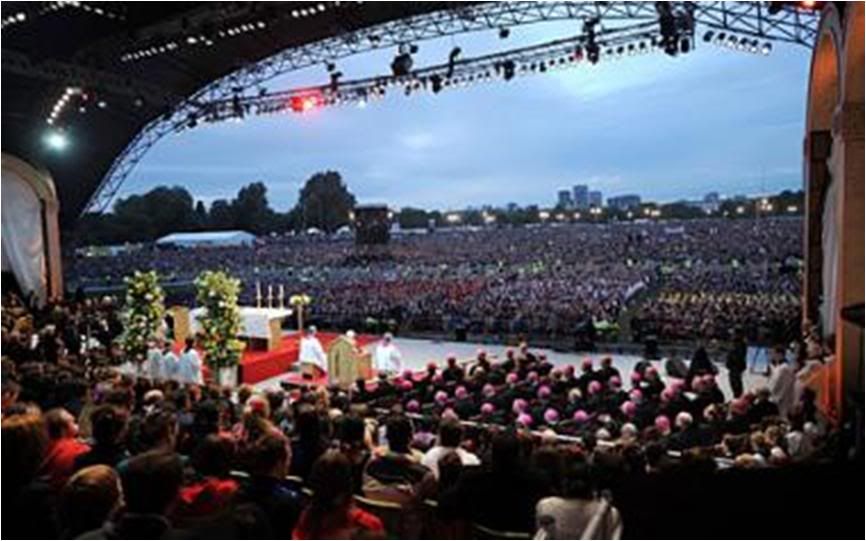
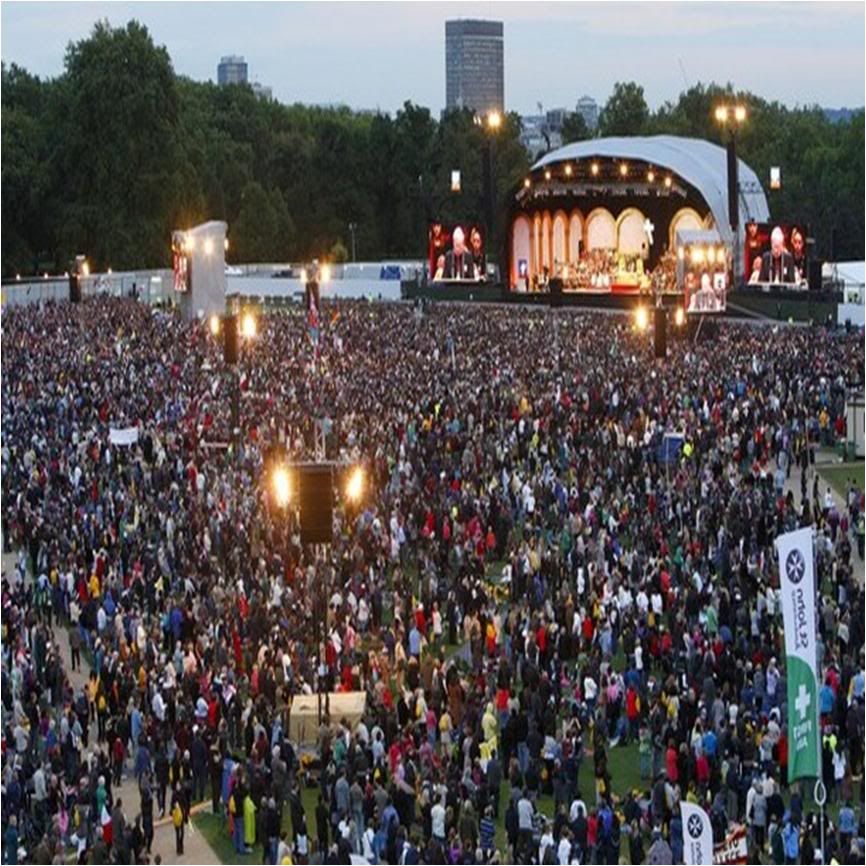
London, England, Sep 18, 2010 (CNA/EWTN News).- A diverse and enthusiastic crowd of tens of thousands joined Pope Benedict XVI for his final event in London.
Attendees told CNA they were extremely happy to join the event to bear witness to their faith and to show their love for the Pope.
The vigil celebration of the Beatification of John Henry Newman in London's Hyde Park attracted an estimated 80,000 people, the BBC reports.
During the vigil’s Eucharistic Adoration many of the people in attendance knelt on the grass in solemn prayer while others prayed while standing.
Hundreds of people were left outside the park gates, which closed as the Pope arrived. They stayed and prayed just like those on the inside. Most could see the large video screens above the fences.
CNA spoke with members of the vigil crowd, finding that every one of them was enthusiastic for the Pope's arrival and happy to bear witness to the faith in the U.K.
Besides the great presence of English, Welsh and Scottish, there was an enormous mix of people whose origins included Hong Kong, Uganda, Malta and Chile. Their multitudes of waving flags showed their diversity.
A teenager from London named Brendan painted his face with the Vatican coat of arms, displaying the coat’s keys on each cheek. He had written the abbreviation "BXVI" on his forehead and held a sign with the words "We Love U Papa" for all to see.
Mr. and Mrs. John Holden told CNA that they had come from southwest Wales with their son Fr. Martin Holden to see the Pope. They had already seen the Holy Father earlier Saturday morning at Westminster Cathedral. John commented that the event "as you say in America, was 'awesome'."
Tim Rumpus from St. Joseph's parish in Basingstoke came to "bear witness, show that the Catholic faith is still strong in England, and basically, with all the negative press, stand up and be counted."
Attendee Lauren is in her twenties. She is originally from Cardiff, Wales, but presently lives in Battlesea, England. She said about the Pope, "it's wonderful to have him here" and recalled her father's participation in John Paul II's visit in 1982. Magdalena from Slovakia said she was there just to watch the Pope and to pray.
Richard, originally from the Philippines, but now in the U.K. for work, explained he came to the "vespers" in order to "witness the faithful, the gathering of faith of the entire world in the United Kingdom."
Barry McCarthy, from London, was there with his wife and child. He said "we're here today to celebrate our faith." He added that he would like "to welcome the Pope and just thank him for coming."
During the vigil Pope Benedict spoke of the “immense spiritual joy” Cardinal Newman’s imminent beatification has caused. He urged the crowd to listen for God’s call in their lives.
“Be open to his voice resounding in the depths of your heart: even now his heart is speaking to your heart,” he told the audience, alluding to the motto of the cardinl.
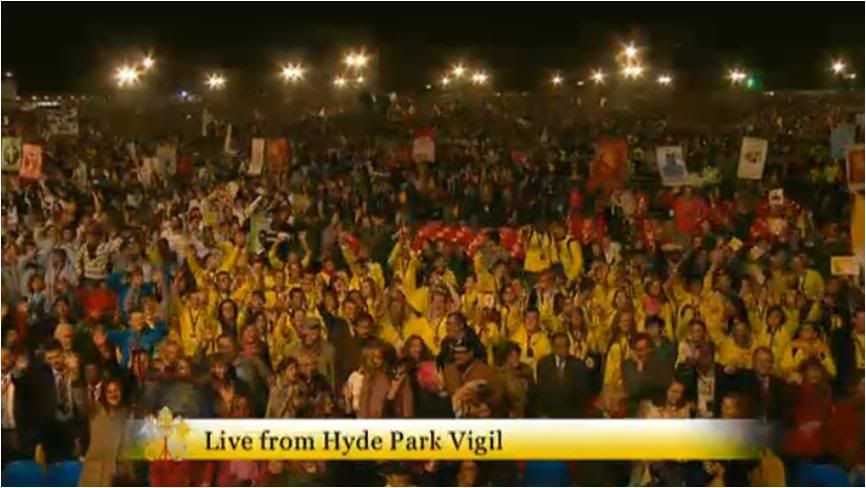
My Brothers and Sisters in Christ,
This is an evening of joy, of immense spiritual joy, for all of us. We are gathered here in prayerful vigil to prepare for tomorrow’s Mass, during which a great son of this nation, Cardinal John Henry Newman, will be declared Blessed.
How many people, in England and throughout the world, have longed for this moment! It is also a great joy for me, personally, to share this experience with you.
As you know, Newman has long been an important influence in my own life and thought, as he has been for so many people beyond these isles.
The drama of Newman’s life invites us to examine our lives, to see them against the vast horizon of God’s plan, and to grow in communion with the Church of every time and place: the Church of the apostles, the Church of the martyrs, the Church of the saints, the Church which Newman loved and to whose mission he devoted his entire life.
I thank Archbishop Peter Smith for his kind words of welcome in your name, and I am especially pleased to see the many young people who are present for this vigil.
This evening, in the context of our common prayer, I would like to reflect with you about a few aspects of Newman’s life which I consider very relevant to our lives as believers and to the life of the Church today.
Let me begin by recalling that Newman, by his own account, traced the course of his whole life back to a powerful experience of conversion which he had as a young man. It was an immediate experience of the truth of God’s word, of the objective reality of Christian revelation as handed down in the Church.
This experience, at once religious and intellectual, would inspire his vocation to be a minister of the Gospel, his discernment of the source of authoritative teaching in the Church of God, and his zeal for the renewal of ecclesial life in fidelity to the apostolic tradition.
At the end of his life, Newman would describe his life’s work as a struggle against the growing tendency to view religion as a purely private and subjective matter, a question of personal opinion.
Here is the first lesson we can learn from his life: in our day, when an intellectual and moral relativism threatens to sap the very foundations of our society, Newman reminds us that, as men and women made in the image and likeness of God, we were created to know the truth, to find in that truth our ultimate freedom and the fulfilment of our deepest human aspirations.
In a word, we are meant to know Christ, who is himself “the way, and the truth, and the life” (Jn 14:6).
Newman’s life also teaches us that passion for the truth, intellectual honesty and genuine conversion are costly. The truth that sets us free cannot be kept to ourselves; it calls for testimony, it begs to be heard, and in the end its convincing power comes from itself and not from the human eloquence or arguments in which it may be couched.
Not far from here, at Tyburn, great numbers of our brothers and sisters died for the faith; the witness of their fidelity to the end was ever more powerful than the inspired words that so many of them spoke before surrendering everything to the Lord.
In our own time, the price to be paid for fidelity to the Gospel is no longer being hanged, drawn and quartered but it often involves being dismissed out of hand, ridiculed or parodied.
And yet, the Church cannot withdraw from the task of proclaiming Christ and his Gospel as saving truth, the source of our ultimate happiness as individuals and as the foundation of a just and humane society.
Finally, Newman teaches us that if we have accepted the truth of Christ and committed our lives to him, there can be no separation between what we believe and the way we live our lives. Our every thought, word and action must be directed to the glory of God and the spread of his Kingdom.
Newman understood this, and was the great champion of the prophetic office of the Christian laity. He saw clearly that we do not so much accept the truth in a purely intellectual act as embrace it in a spiritual dynamic that penetrates to the core of our being.
Truth is passed on not merely by formal teaching, important as that is, but also by the witness of lives lived in integrity, fidelity and holiness; those who live in and by the truth instinctively recognize what is false and, precisely as false, inimical to the beauty and goodness which accompany the splendour of truth, veritatis splendor.
Tonight’s first reading is the magnificent prayer in which Saint Paul asks that we be granted to know “the love of Christ which surpasses all understanding” (Eph 3:14-21).
The Apostle prays that Christ may dwell in our hearts through faith (cf. Eph 3:17) and that we may come to “grasp, with all the saints, the breadth and the length, the height and the depth” of that love.
Through faith we come to see God’s word as a lamp for our steps and light for our path (cf. Ps 119:105). Newman, like the countless saints who preceded him along the path of Christian discipleship, taught that the “kindly light” of faith leads us to realize the truth about ourselves, our dignity as God’s children, and the sublime destiny which awaits us in heaven.
By letting the light of faith shine in our hearts, and by abiding in that light through our daily union with the Lord in prayer and participation in the life-giving sacraments of the Church, we ourselves become light to those around us; we exercise our “prophetic office”.
Often, without even knowing it, we draw people one step closer to the Lord and his truth. Without the life of prayer, without the interior transformation which takes place through the grace of the sacraments, we cannot, in Newman’s words, “radiate Christ”; we become just another “clashing cymbal” (1 Cor 13:1) in a world filled with growing noise and confusion, filled with false paths leading only to heartbreak and illusion.
One of the Cardinal’s best-loved meditations includes the words, “God has created me to do him some definite service. He has committed some work to me which he has not committed to another” (Meditations on Christian Doctrine).
Here we see Newman’s fine Christian realism, the point at which faith and life inevitably intersect. Faith is meant to bear fruit in the transformation of our world through the power of the Holy Spirit at work in the lives and activity of believers.
No one who looks realistically at our world today could think that Christians can afford to go on with business as usual, ignoring the profound crisis of faith which has overtaken our society, or simply trusting that the patrimony of values handed down by the Christian centuries will continue to inspire and shape the future of our society.
We know that in times of crisis and upheaval God has raised up great saints and prophets for the renewal of the Church and Christian society; we trust in his providence and we pray for his continued guidance.
But each of us, in accordance with his or her state of life, is called to work for the advancement of God’s Kingdom by imbuing temporal life with the values of the Gospel.
Each of us has a mission, each of us is called to change the world, to work for a culture of life, a culture forged by love and respect for the dignity of each human person.
As our Lord tells us in the Gospel we have just heard, our light must shine in the sight of all, so that, seeing our good works, they may give praise to our heavenly Father (cf. Mt 5:16).
Here I wish to say a special word to the many young people present. Dear young friends: only Jesus knows what “definite service” he has in mind for you. Be open to his voice resounding in the depths of your heart: even now his heart is speaking to your heart.
Christ has need of families to remind the world of the dignity of human love and the beauty of family life.
He needs men and women who devote their lives to the noble task of education, tending the young and forming them in the ways of the Gospel.
He needs those who will consecrate their lives to the pursuit of perfect charity, following him in chastity, poverty and obedience, and serving him in the least of our brothers and sisters.
He needs the powerful love of contemplative religious, who sustain the Church’s witness and activity through their constant prayer.
And he needs priests, good and holy priests, men who are willing to lay down their lives for their sheep.
Ask our Lord what he has in mind for you! Ask him for the generosity to say “yes!”
Do not be afraid to give yourself totally to Jesus. He will give you the grace you need to fulfil your vocation.
Let me finish these few words by warmly inviting you to join me next year in Madrid for World Youth Day. It is always a wonderful occasion to grow in love for Christ and to be encouraged in a joyful life of faith along with thousands of other young people. I hope to see many of you there!
And now, dear friends, let us continue our vigil of prayer by preparing to encounter Christ, present among us in the Blessed Sacrament of the Altar.
Together, in the silence of our common adoration, let us open our minds and hearts to his presence, his love, and the convincing power of his truth.
In a special way, let us thank him for the enduring witness to that truth offered by Cardinal John Henry Newman. Trusting in his prayers, let us ask the Lord to illumine our path, and the path of all British society, with the kindly light of his truth, his love and his peace. Amen.
[Modificato da TERESA BENEDETTA 19/09/2010 01:32] |
| |
 19/09/2010 03:44 19/09/2010 03:44 |
|
| | | OFFLINE | | Post: 21.029
Post: 3.666 | Registrato il: 28/08/2005
Registrato il: 20/01/2009 | Administratore | Utente Master | |
|
 We can all relax now. The terrorist plot appeared questionable from the start, the protesters have done their worst (all hot air, bad blood and bile, but they got all the publicity they wanted), the Pope's numbers trumped them at every turn, the Pope's events were all memorable, and now we can all look forward unencumbered to the Beatification Mass a few hours from now... In Edinburgh, before the visit is even over, one newspaper is printing an editorial tomorrow declaring the visit the kind of success no one in the UK could imagine of Benedict XVI - despite all his successes elsewhere! So, enjoy saying, "We told you so! But welcome to the club, anyway!"
Pope's visit passes
We can all relax now. The terrorist plot appeared questionable from the start, the protesters have done their worst (all hot air, bad blood and bile, but they got all the publicity they wanted), the Pope's numbers trumped them at every turn, the Pope's events were all memorable, and now we can all look forward unencumbered to the Beatification Mass a few hours from now... In Edinburgh, before the visit is even over, one newspaper is printing an editorial tomorrow declaring the visit the kind of success no one in the UK could imagine of Benedict XVI - despite all his successes elsewhere! So, enjoy saying, "We told you so! But welcome to the club, anyway!"
Pope's visit passes
in best of spirit

19 September 2010
THE state visit to Britain of Pope Benedict XVI has produced a series of surprises, as welcome as they have been unexpected.
Few anticipated that this event would turn out as it has done or that this elderly Pontiff would so successfully enhance his image in this country. Yet that is what has happened.
Before his arrival, the auguries were not good. His predecessor, John Paul II, was always going to be a hard act to follow. A noisy protest movement promised a rough ride. Above all, the shadow of the clerical sex abuse scandal hung over the proceedings.
Rumours of incompetence in planning the logistical arrangements threatened to deter the faithful from attending papal services, potentially leading to a fiasco.
In the event, how different it all turned out to be from the dire forecasts.
Scotland can take credit for giving the occasion the best possible launch. The spectacle of the Queen, her Bodyguard for Scotland, the Royal Company of Archers, and the senior members of government welcoming the Pope at the Palace of Holyroodhouse demonstrated on the world stage how this country can perform state ceremonial with dignity and warmth.
It was Benedict XVI's progress through Edinburgh, cheered by 125,000 well-wishers, that first signalled the success he would enjoy. The Mass at Bellahouston Park in Glasgow and the subsequent events in London, including the Pope's address in Westminster Hall and the majestic ceremonial of the Mass yesterday at Westminster Cathedral, confirmed that success.
But these formal occasions were only the setting. There is no doubt the Pope supplied the substance. From his first address he signalled his determination to voice his opposition to militant atheism and intolerant secularism, as was probably to be expected.
But this was no finger-wagging, intransigent declaration of war: instead, it was an invitation for people to reconsider some of the most important issues facing society and individuals today. [An invitation that he makes almost every day in his public statements, and that has been the burden of his analysis of Western culture for decades. Again, obviously, the journalists at this newspaper, though they have now seen the light, did not bother to learn more about Benedict XVI than the malicious myths perpetrated in and by the MSM!]
Benedict XVI has opened an important public debate: he has invited people to think rather than to emote. In that respect it has the potential to prove more historically significant than that of his crowd-pulling predecessor who evoked an emotional rather than an intellectual response. [Surely, the affection that the crowds show Benedict XVI is not just an intellectual response. Or rather, it is not primarily intellectual. People respond affectionately to Benedict XVI, they take to him, because he does not try to be anything other than who he is. Super-extraordinary as he might be, he does not come across as 'formidable' in any way - just a sweet, shy, gentle, even vulnerable man who radiates Christian joy spontaneously and naturally. And it obviously comes across...]
Finally, yesterday morning in Westminster Cathedral, the Pope confronted the elephant in the room - the sex abuse scandal. This was what had been demanded of him and Benedict XVI made his strongest public apology yet. [
Another surprise was the evidence of this 83-year-old Pontiff's warm rapport with young people - as strong as that of John Paul II and based on a challenge to their moral character and capacity for service. ['Another surprise'???? Do journalists not notice anything unless it happens right under their noses? Where were they during WYD Cologne and WYD Sydney - not to mention those amazing Q&As that this Pope has had with children and young people?]
At the outset, it seemed the best result from this visit was that devout Catholics would have the opportunity to see their religious leader, the protestors would have the opportunity to protest, and the rest of the country would be treated to a colourful spectacle and a historic occasion.
It seems though that it has achieved that and more. All critics will not be silenced, and nor should they be, but rather than just diplomatic niceties it seems that something altogether more concrete has come out of this.
It appears that the different faiths who have been part of the Pope's visit have a genuine belief in joining together to improve the debate on faith.
But the Pope has also raised the fundamental issues of materialism and spirituality and quality of life in a way that appears to strike a chord with ordinary people, Catholics or not, in a way that so far others have failed to do, and it will do no harm for there to be more self-examination, thought and debate over these fundamental areas in our modern society. A useful result for all.
OK, Scotland on Sunday - you've finally begun to get it! And we can light a candle to mark the event! Deo gratias....
[Modificato da TERESA BENEDETTA 19/09/2010 03:45] |
| |
|
|
|
|